



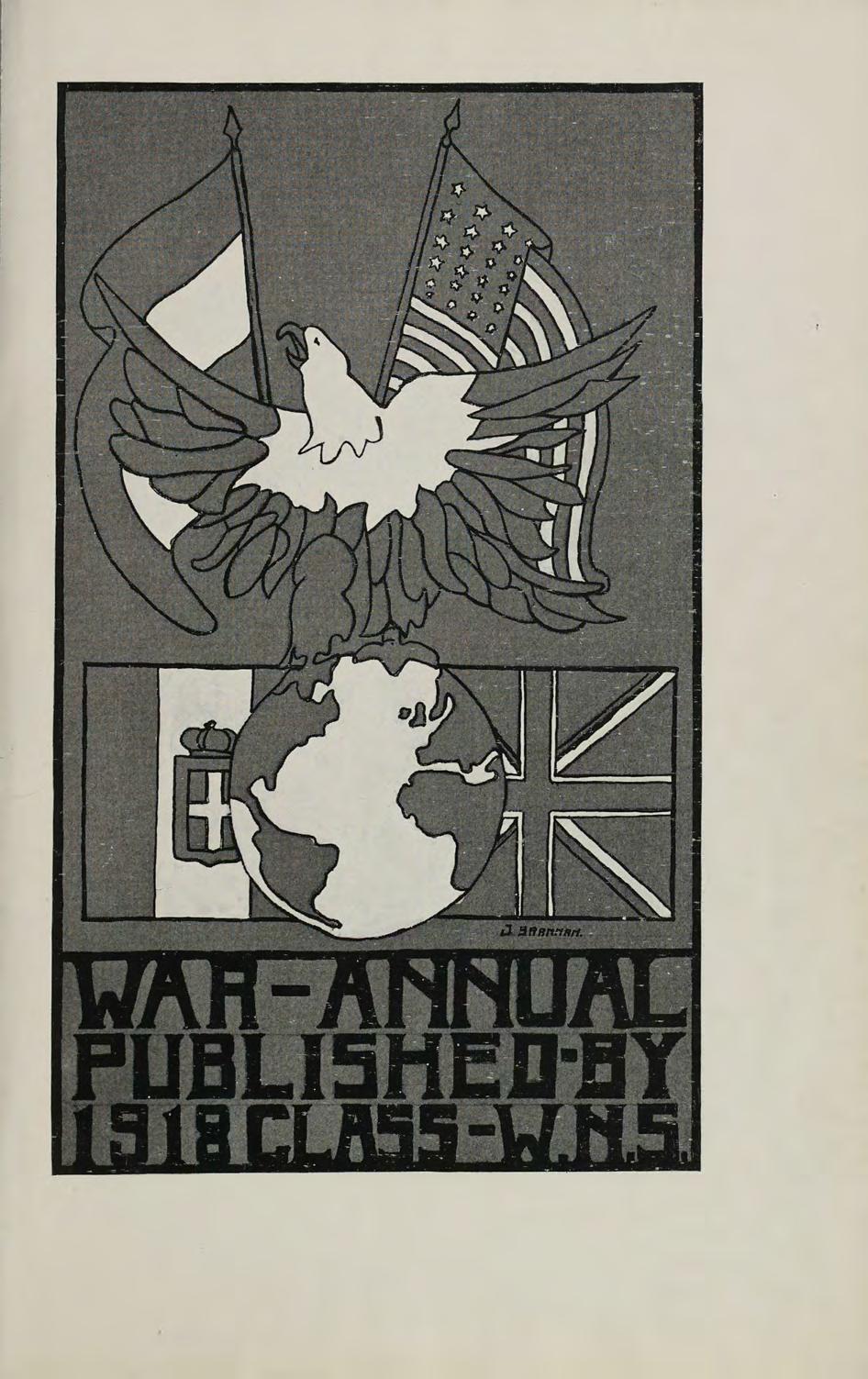

®able of Contents
Frontispiece
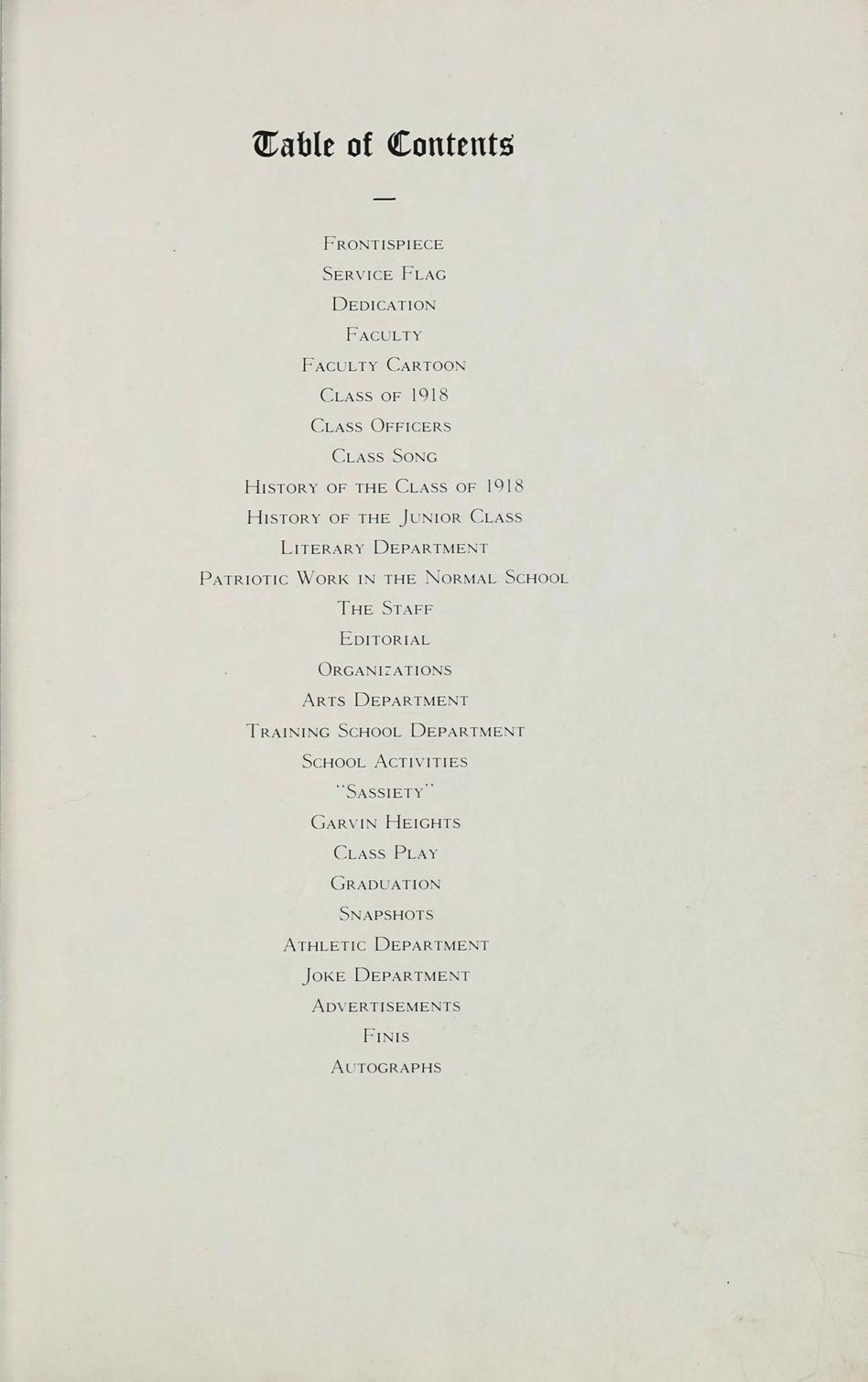
Service Flag
Dedication
Faculty
Faculty Cartoon
Class of 1918
Class Officers
Class Song
History of the Class of 1918
History of the Junior Class
Literary Department
Patriotic Work in the Normal School
The Staff
Editorial Organizations
Arts Department
Training School Department
School Activities
“Sassiety”
Garvin Heights
Class Play
Graduation
Snapshots
Athletic Department
Joke Department
Advertisements
Finis
Autographs
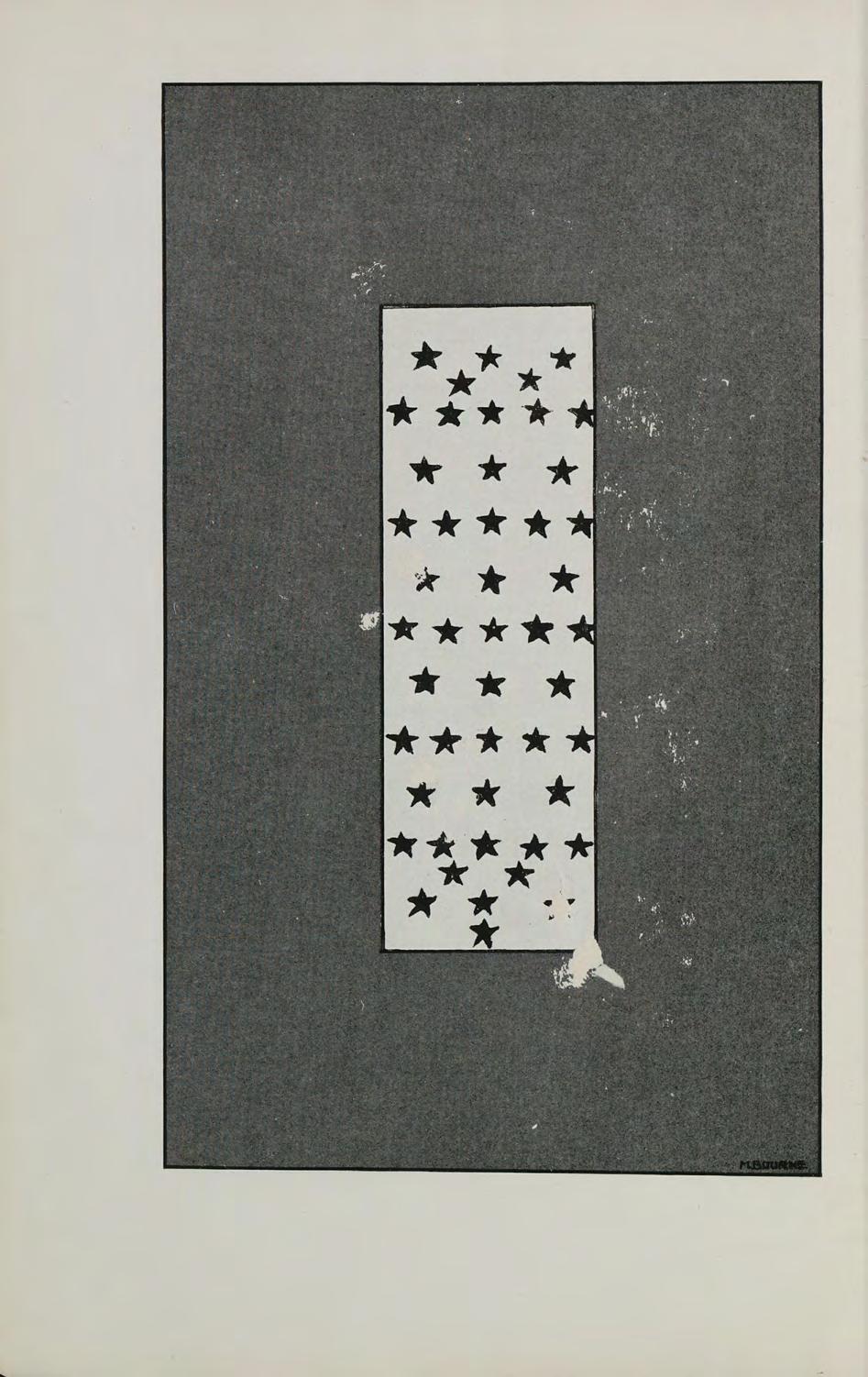
Co tlje bops at tfjc front, toitt) gratitube for tfjcit* Serbice, initfj appreciation for tfjeir sacrifice anb toitfj reberence for tfjeir cause toe bebicate tfjis "918

★ ★ ★ ★ k ★ ★ ★ ★ ★★★★★★★ ©ciiicatiou
“^enonafj.”

6
There's no one can compare, You may search everywhere, With this gracious, kindly man, A true patriot of the land. You may go east or west To hear the people tell. But he is ever best.
Cur President Maxwell.
We are securely sure That when we wish to lure The folk to our successes In parties, talks, and dresses. That there will always be. The sweet smile to see, Of Mrs. Maxwell.
All of us know well. That he is great In city and state.
For tho a prominent judge Diplomas to all He lets fall.
From his benign hand. Partial to none Is Mr. Somsen.

Jfacultp
MR MAXWELL
MRS. MAXWELL
MR SOMSEN
 Kate L. Sprague
B. Pd„ Ph. B. MATHEMATICS
Charlotte B. Chorpenning
A. B„ A. M. ENGLISH
John H. Sandt MANUAL TRAINING
Joseph H. Gaylord
A. B., A. M. PSYCHOLOGY
Kate L. Sprague
B. Pd„ Ph. B. MATHEMATICS
Charlotte B. Chorpenning
A. B„ A. M. ENGLISH
John H. Sandt MANUAL TRAINING
Joseph H. Gaylord
A. B., A. M. PSYCHOLOGY
 Thf.da Gildemeister, B. S.
E. Louise Guernsey
Thf.da Gildemeister, B. S.
E. Louise Guernsey
EDUCATION ART
Mary Grant
Bertha B. Schwable, B. S.
Mary R. Slifer LIBRARIAN TRAINING, KINDERGARTEN READING
 Alice B. Dillon, B. S. HOME ECONOMICS
Esther B. Cooley, B. S. HOME ECONOMICS
Talmadge O. Dillon, A. B. PHYSICAL EDUCATION
Robert R. Reed, A. B., A. M. ENGLISH
Alice B. Dillon, B. S. HOME ECONOMICS
Esther B. Cooley, B. S. HOME ECONOMICS
Talmadge O. Dillon, A. B. PHYSICAL EDUCATION
Robert R. Reed, A. B., A. M. ENGLISH
 Genevieve Grover, B. S. HOME ECONOMICS
Louise C. Sutherland, B. S KINDERGARTEN EDUCATION
Ray J. Scarborough A. B., A. M. GEOGRAPHY
Blanche E. Campbell, B. S. INDUSTRIAL ART
Marie Couter SECRETARY
Alma P Proctor
Helen B. Pritchard MANAGER MOREY HALL CONSULTING NURSE TEXTBOOK LIBRARIAN
Genevieve Grover, B. S. HOME ECONOMICS
Louise C. Sutherland, B. S KINDERGARTEN EDUCATION
Ray J. Scarborough A. B., A. M. GEOGRAPHY
Blanche E. Campbell, B. S. INDUSTRIAL ART
Marie Couter SECRETARY
Alma P Proctor
Helen B. Pritchard MANAGER MOREY HALL CONSULTING NURSE TEXTBOOK LIBRARIAN
 Helen Ford Staples E. Catherine Burkholder Alvina M. Boley TRAINING, ELEMENTARY SCHOOL TRAINING, ELEMENTARY SCHOOL MUSIC, ELEMENTARY SCHOOL
Marion John Atwood. A. B., A. M. HISTORY AND SOCIOLOGY
Ethel M. Orr, B. S. TRAINING, ELEMENTARY SCHOOL
Violet M. Melander SEVENTH-NINTH GRADES ELEANOR HoHAUS ELEMENTARY SCHOOL FIRST GRADE, ELEMENTARY SCHOOL
Helen Ford Staples E. Catherine Burkholder Alvina M. Boley TRAINING, ELEMENTARY SCHOOL TRAINING, ELEMENTARY SCHOOL MUSIC, ELEMENTARY SCHOOL
Marion John Atwood. A. B., A. M. HISTORY AND SOCIOLOGY
Ethel M. Orr, B. S. TRAINING, ELEMENTARY SCHOOL
Violet M. Melander SEVENTH-NINTH GRADES ELEANOR HoHAUS ELEMENTARY SCHOOL FIRST GRADE, ELEMENTARY SCHOOL
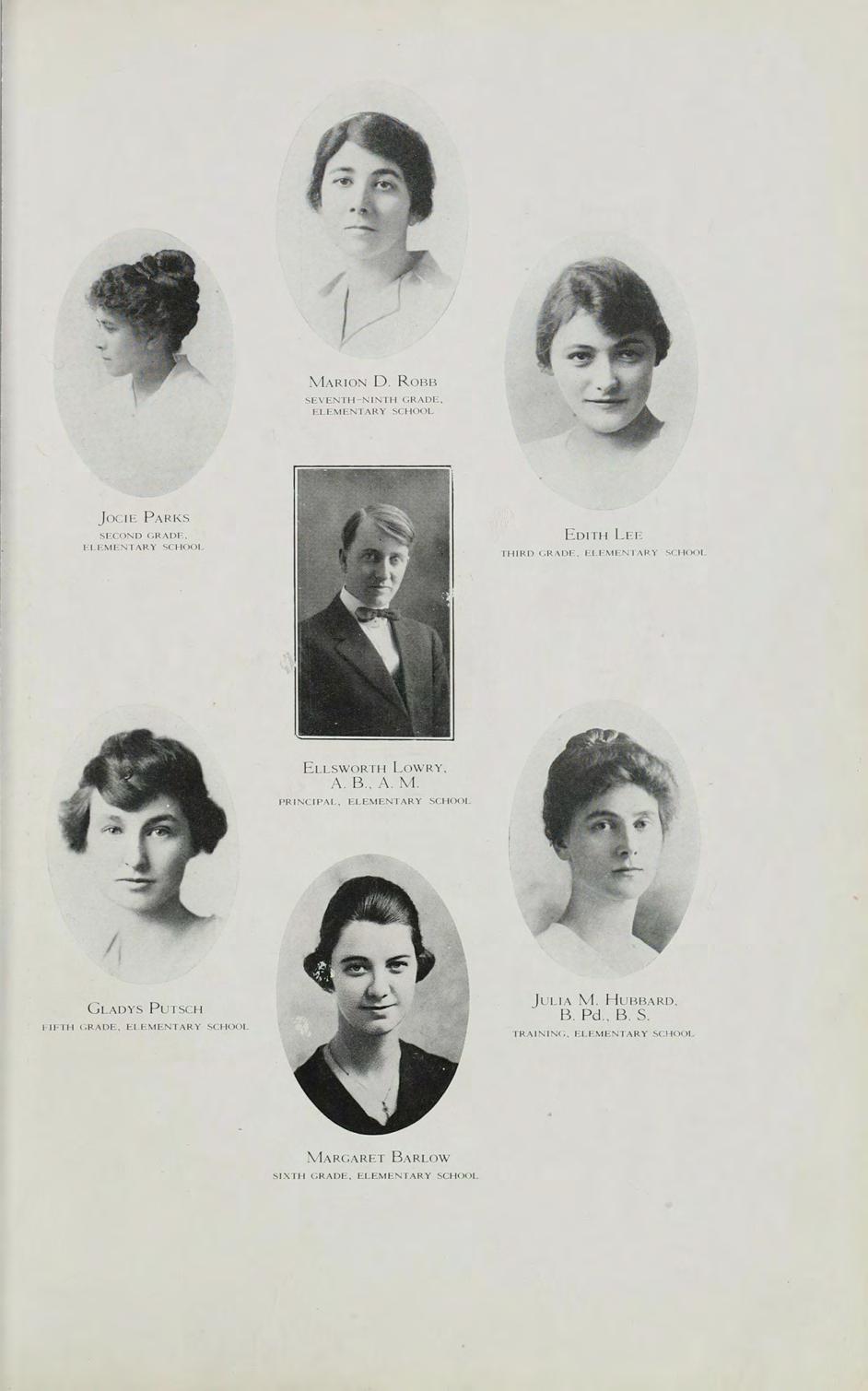 Marion D. Robb SEVENTH-NINTH GRADE, ELEMENTARY SCHOOL
Jocie Parks SECOND GRADE. ELEMENTARY SCHOOL
Gladys Putsch
FIFTH GRADE, ELEMENTARY SCHOOL
Julia M. Hubbard. B. Pd.. B. S. TRAINING, ELEMENTARY SCHOOL
Margaret Barlow SIXTH GRADE, ELEMENTARY SCHOOL
Marion D. Robb SEVENTH-NINTH GRADE, ELEMENTARY SCHOOL
Jocie Parks SECOND GRADE. ELEMENTARY SCHOOL
Gladys Putsch
FIFTH GRADE, ELEMENTARY SCHOOL
Julia M. Hubbard. B. Pd.. B. S. TRAINING, ELEMENTARY SCHOOL
Margaret Barlow SIXTH GRADE, ELEMENTARY SCHOOL
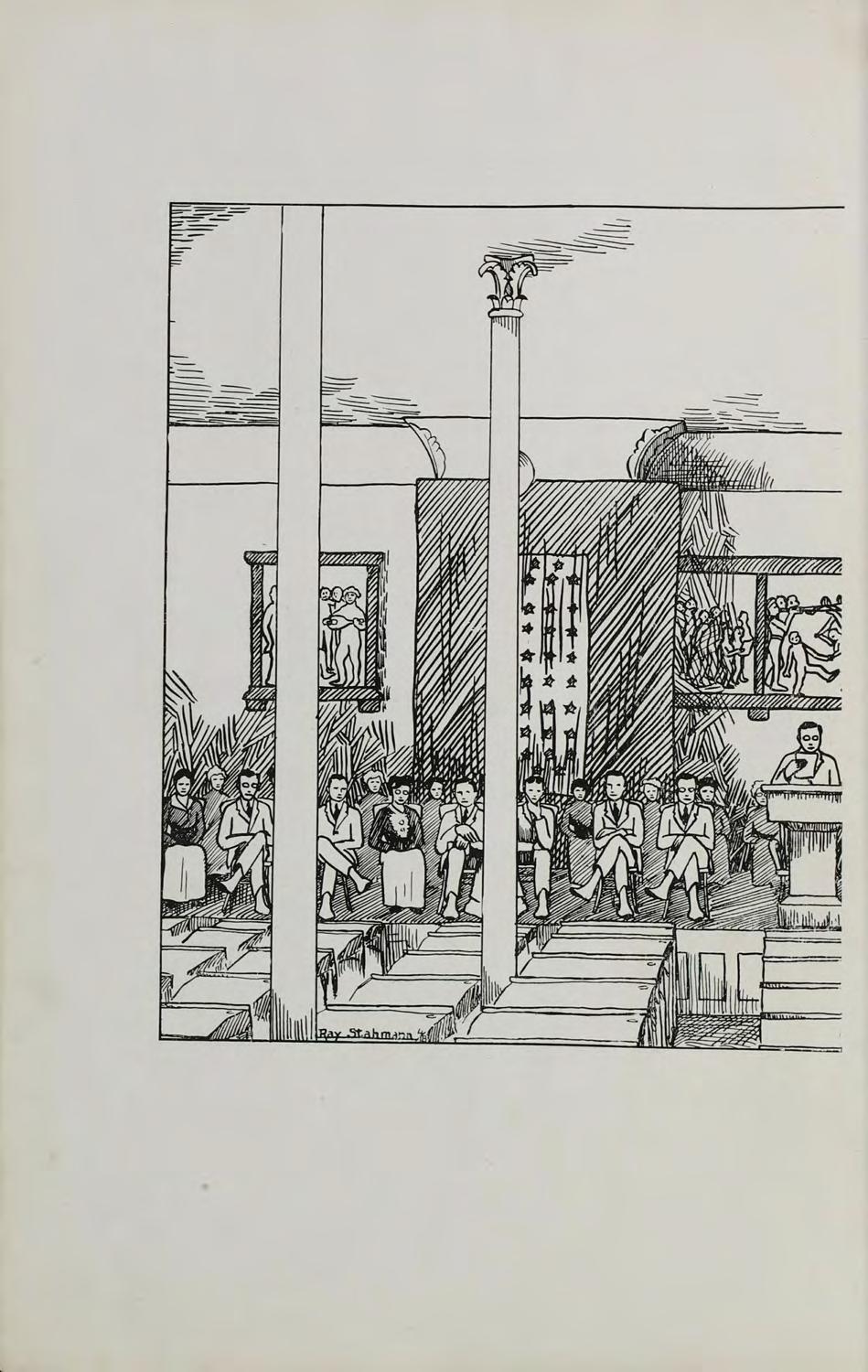

Gloyd Snow, St. Paul
"All people said she had authority."
Arthur Wachholz, Winona
"Like the Mississippi lined with bluffs."
Ethel Brown, Winona
"To know her profilelh you."
Marguerite Melander, Red Wing
"Is another specimen of advanced civilization who comes to Normal to be finished."
Harriet Regan, Winona
"So. neglecting worldly ends, all dedicated to industry she got B + in teachmg."
Ruth Boley, Winona
"She is very keen about dancing and have you seen her walk? It's trademarked 'Castle.'
Anna Norrbom, Minneapolis

"Nothing is impossible to industry."
Marian Rockwell, Winona
"The rule of my life is to make business a pleasure and pleasure is my business."
M
Ruby Johnson, Winona
"Whose little body lodged a mighty mind."
Josephine Brannon, W inona
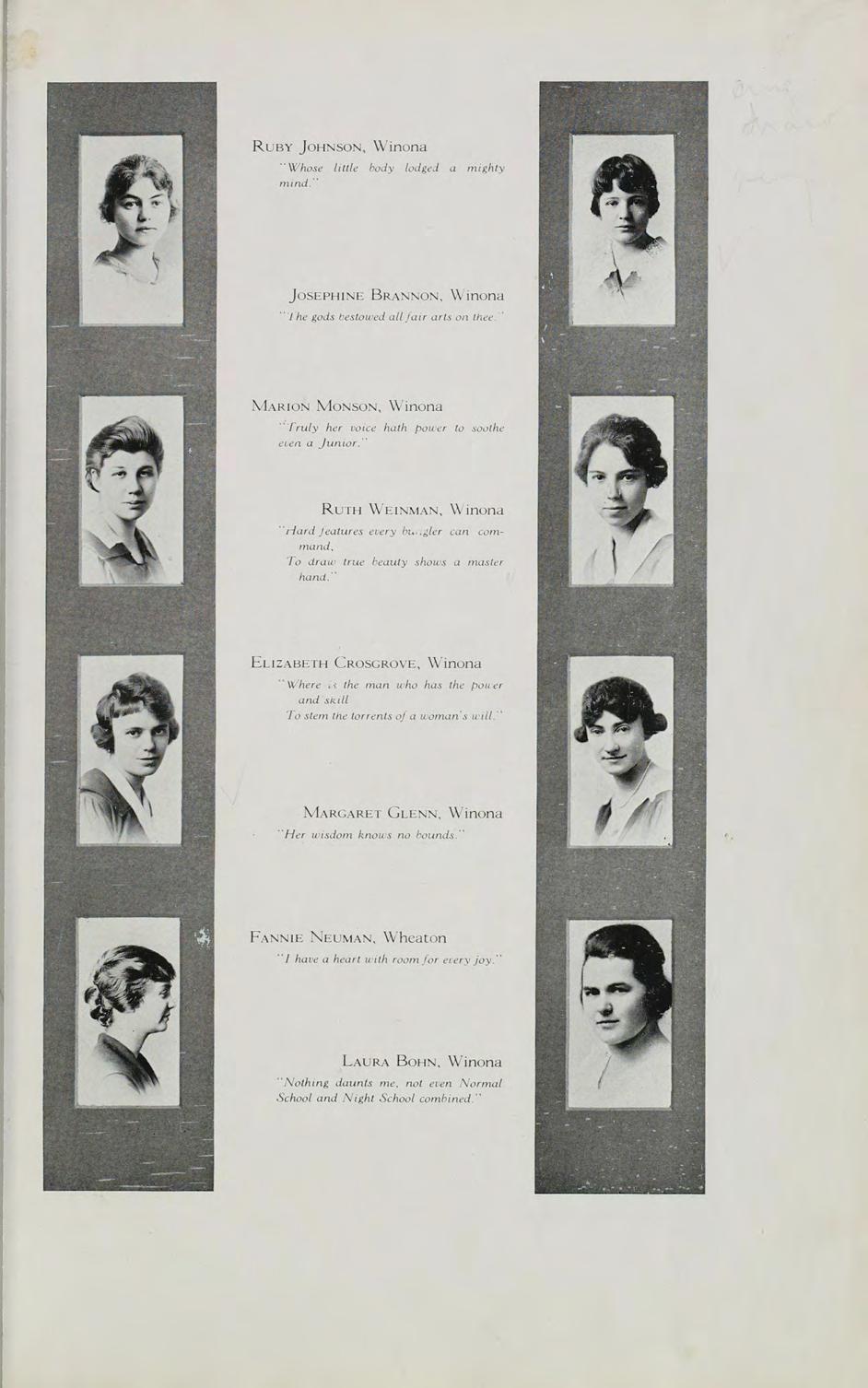
1 he gods bestowed all fair arts on thee."
Marion Monson, Winona
"Truly her voice hath power to soothe even a Junior."
Ruth Weinman, Winona
"Hard Jeatures every bu-.gler can command.
To draw true beauty shows a master hand."
Elizabeth Crosgrove, Winona
"Where is the man who has the power and skill
To stem the torrents of a woman's will.
Margaret Glenn, Winona
"Her wisdom knows no bounds."
Fannie Neuman, Wheaton
/ have a heart with room for every joy."
Laura Bohn, Winona
"Nothing daunts me. not even Normal School and Night School combined."
Dora Blackmore, Stillwater
"She bursts with energy."
Martha Hermann, Glencoe
'But love is blind and lovers can not see The pretty follies that they themselves commit."
Myrtle Erickson, Goodhue
“Modesty is one of women's best adornments"
Arloine Welch. Richey, Mont.
"A quiet tongue shows a wise head."
Nell McAllister, Redwood Falls
”/ believe a little knowledge is a dan
gerous thing. Keep out of danger."
Nellie Sprott, Spring Valley
Angels are perfect—I am but a u oman.
Clara Stene, Frost
"And / have often heard defended Little said is soonest mended."
Martha Walhood, Minneapolis
"Never study until the lights are out
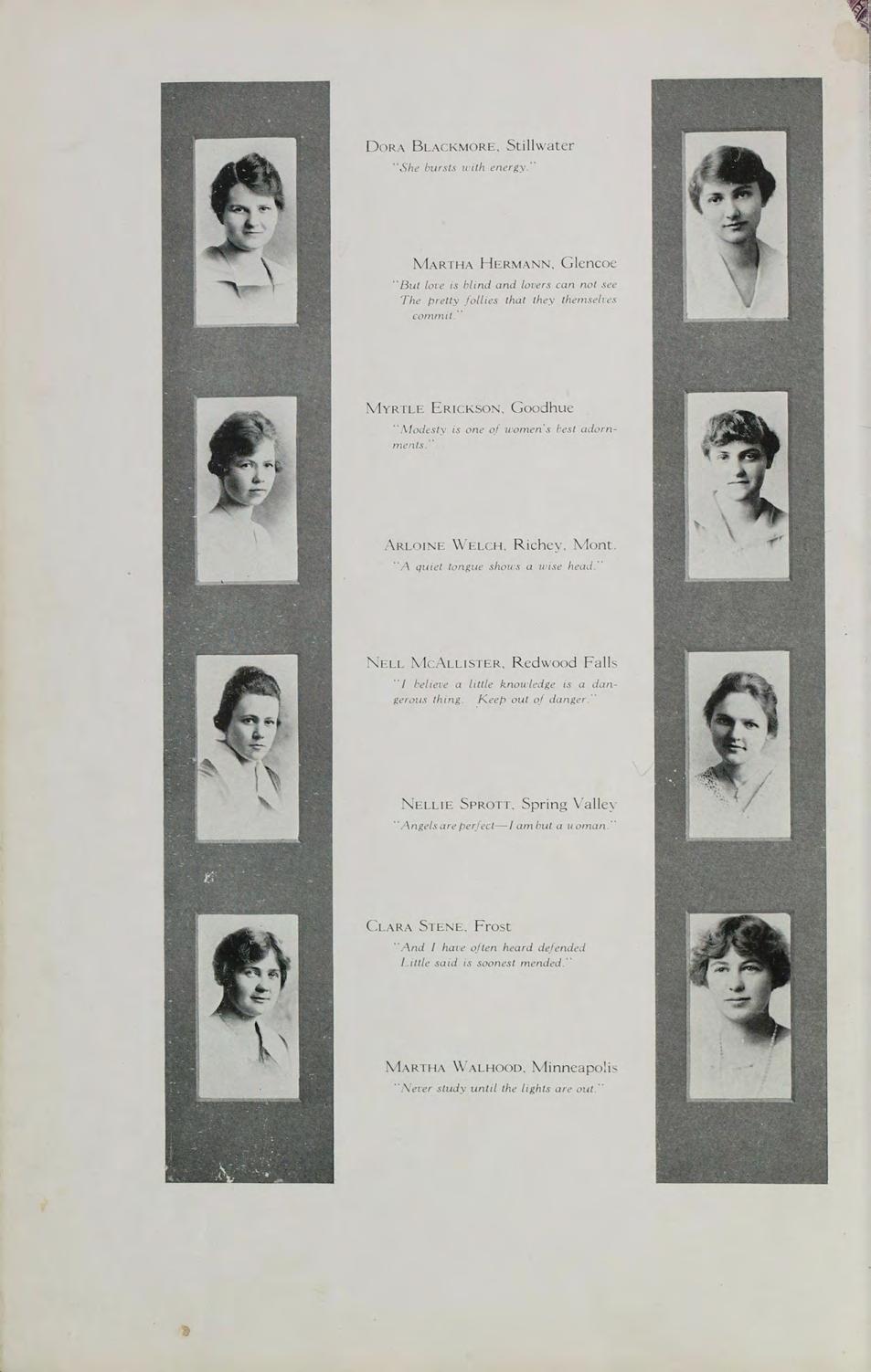
$
-
Marguerite Riley, Winona
“But a merrier girl within the limit of becoming mirth / never spent an hour with, withal."
Phyllis Nyquist, Kerkhoven
"A friend in need is a friend indeed."
Helen Hyde, St. Paul
"This peck of troubles has withal the kindliest of hearts.
Regina Brotherton, Stillwater
“So well read is she that text books hold no flavour."
Mary Caulfield, St. Paul
"A little bit of Irish keeps her always on the move.
Edith Foster. Plainview
“Capability written all over her."
Gale Cummings, Harvey, N.D.
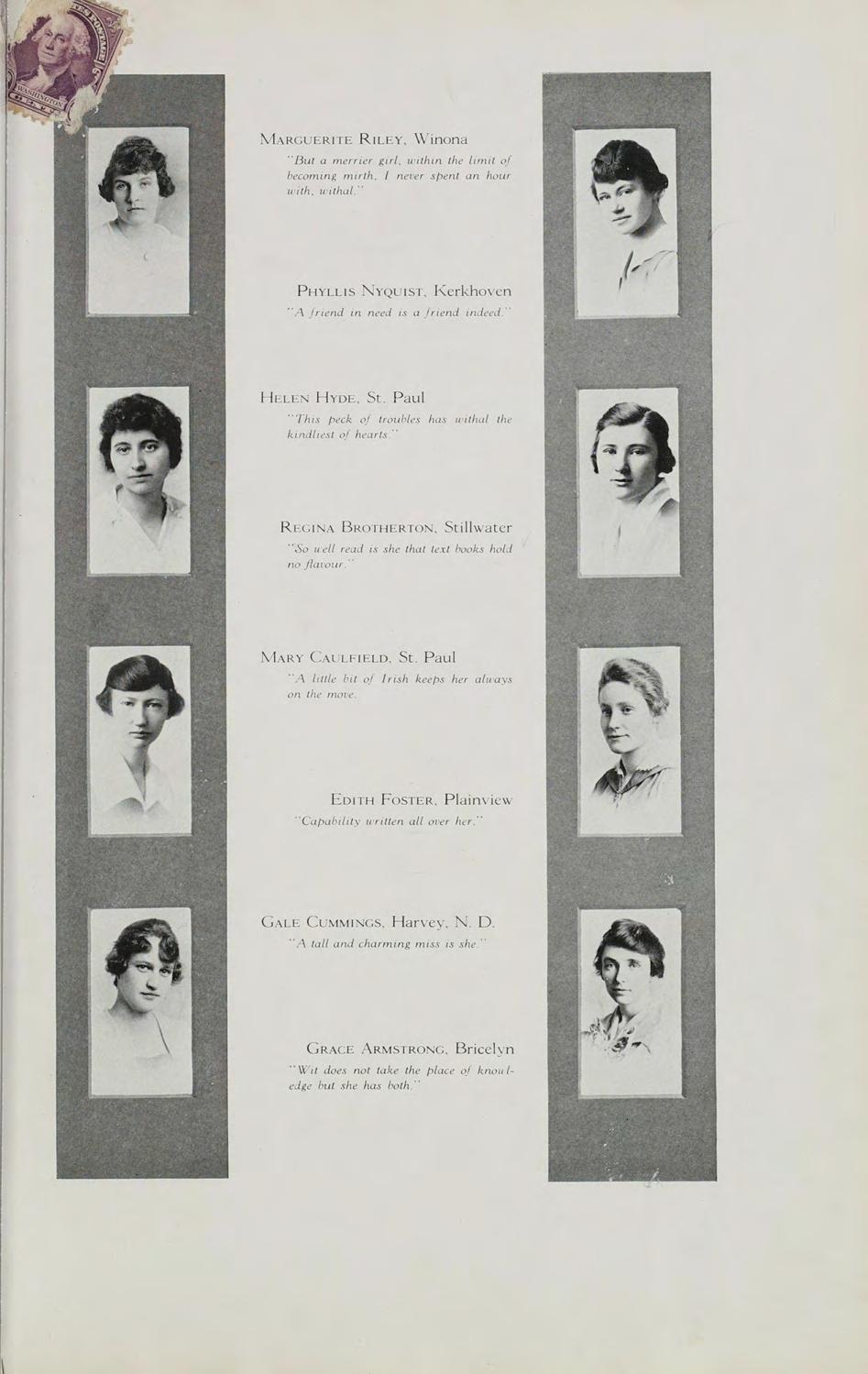
"A tall and charming miss is she
Grace Armstrong, Bricelyn
"Wit does not take the place of knouledge but she has both
l
Rae Whittom, Minneapolis
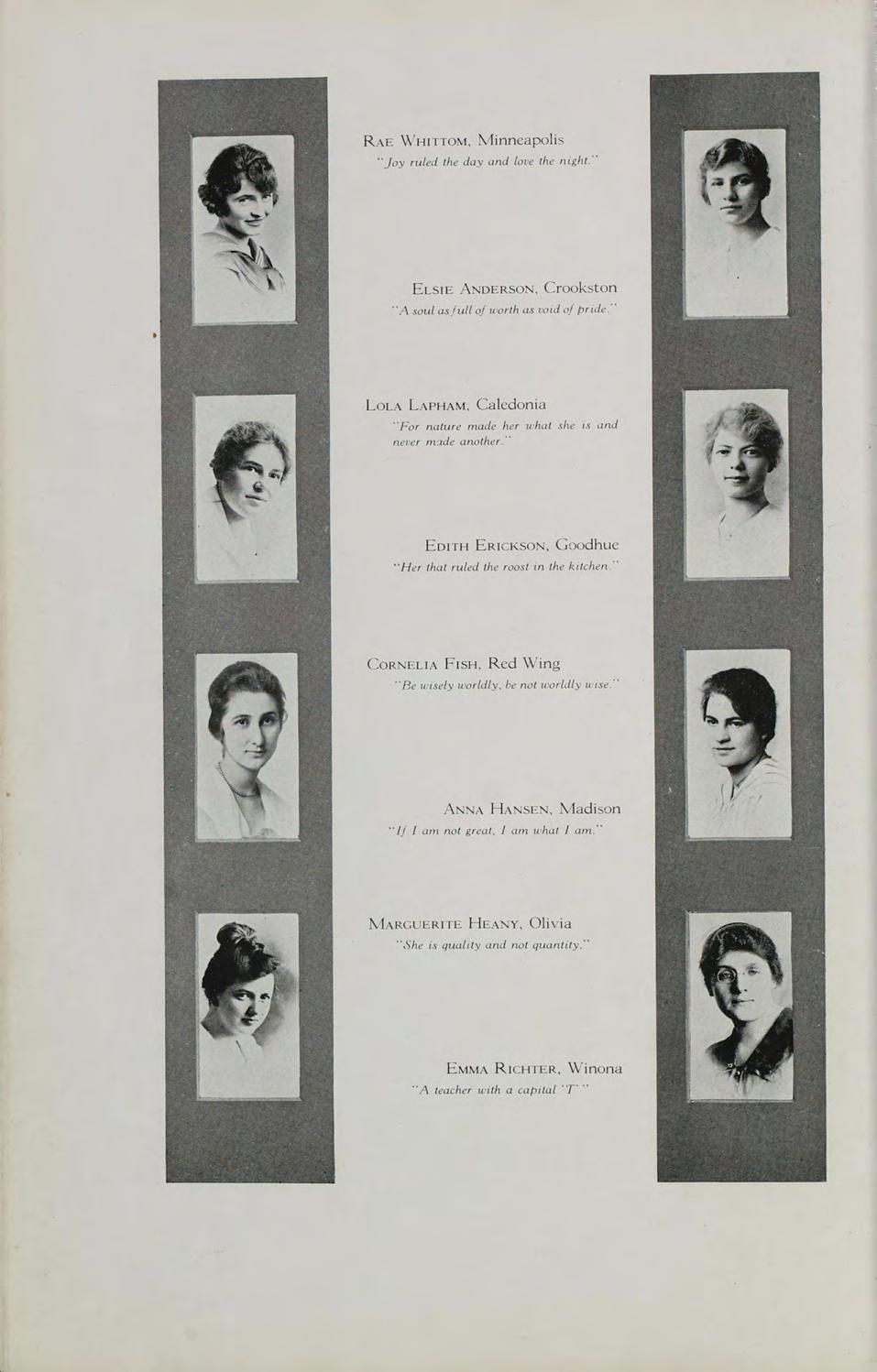
"Joy ruled the day and love the night."
Elsie Anderson, Crookston
"A soul as full of worth as void of pride."
Lola Lapham, Caledonia
“For nature made her what she is and never made another."
Edith Erickson, Goodhue
"Her that ruled the roost in the kitchen."
Cornelia Fish, Red Wing
"Re wisely worldly, be not worldly wise."
Anna Hansen, Madison
"If I am not great, I am what I am."
Marguerite Heany, Olivia
"She is quality and not quantity."
Emma Richter, Winona
"A teacher with a capital ‘T‘
Albert Zepp, Minneapolis
"He has the itch for disputing
Helen Wilson, Brownton
"Faith, thou hast some crotchets in thy head nou ."
Cora Palm. Litchfield
"If you are for a merry jaunt I will try for once who can foot it the farthest.
Margaret Corcoran. Gaylord

"She believed and rightly that in History, at least, all "Rhodes' lead to "A."
Nann Ashcroft, Minneapolis
"Enjoy life ere "tis fled!
When you die you"re a long time dead
Beatrix Peet, Harmony
“Always willing to help a friend
Agnes Johnson, Lake City
"A congenial comrade, sincere and steadfast
Helen Larson, Winthrop
"Short and sweet."
Ruth W’inther. Minneapolis
"They may seem harmless hut have you seen the twinkle in her eye?"
Iva Aldworth. Minneapolis
"Her heart was in her work, and the heart
Civeth grace unto every heart
Helen Howe, Red Wing
"Nothing worries her
Lura Cooke, Rochester
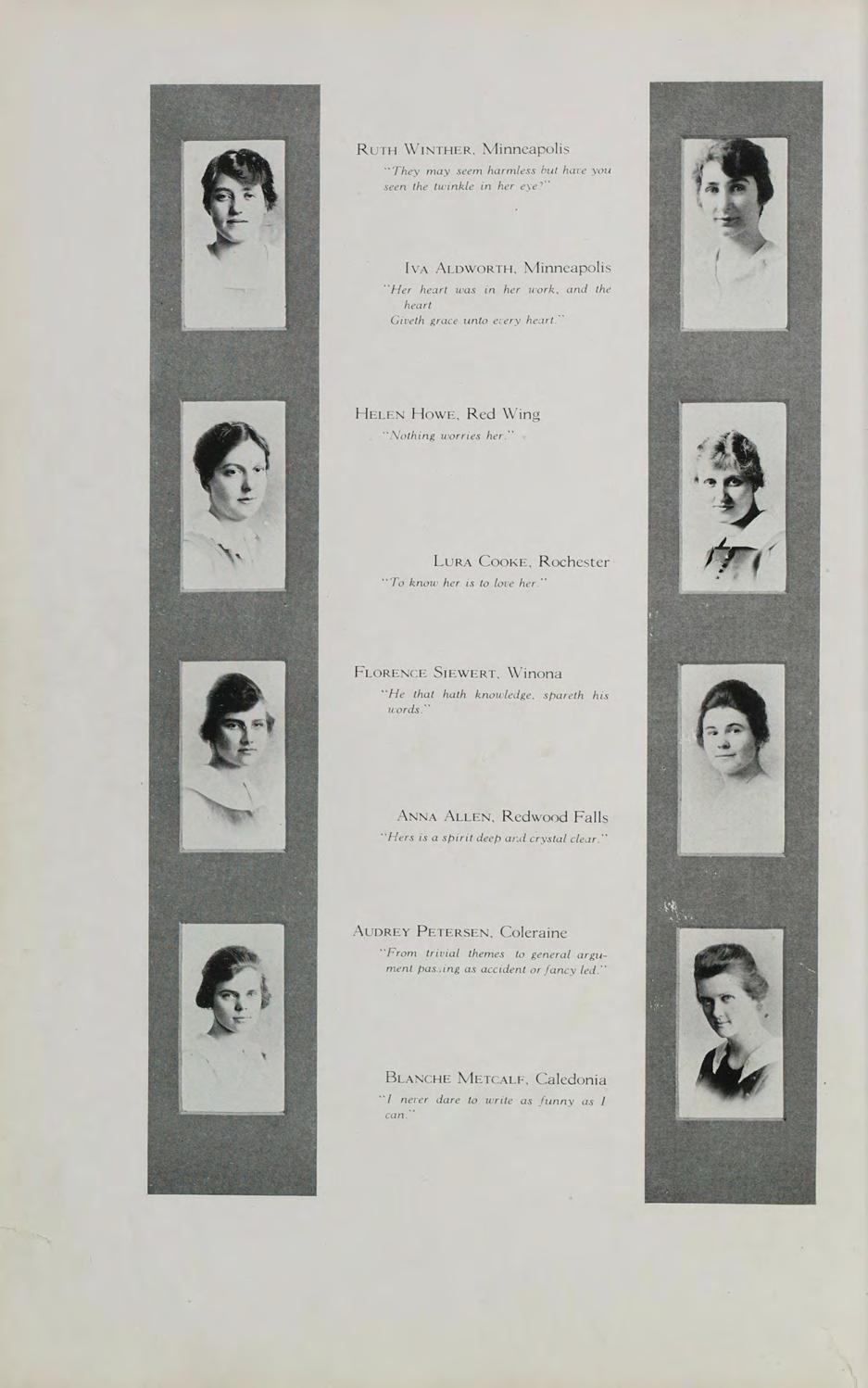
"To know her is to love her
Florence Siewert, Winona
"He that hath knowledge, spareth his words.''
Anna Allen, Redwood Falls
"Hers is a spirit deep and crystal clear."
Audrey Petersen, Coleraine
"From trivial themes to general argumenl pas .ing as accident or fancy led"
Blanche Metcalf, Caledonia
'/ never dare to write as funny as I can.''
Maud Stolen, Ishpeming, Mich

“She has many friends but Gym' is not one of them.''
Letha Davidson, Hamburg, la. “If ignorance is bliss. Think what you miss.''
Eleanor Olson, Red Wing
"Her ways are ways of pleasantness."
Mae Steinmetz, Eyota
‘Determination spiced with a sense of humor.''
Helen Perry, Wadena
“Thy modesty's a candle to thy merit.
Jeannette Baer, Virginia
“Fair weather cometh out of the north.''
Evelyn Conkright, Waseca
“A bundle of reliability.'’
Lena Whitley, Flandreau. S. D.
"Her hair is not more sunny than her heart.''
Ruth Liljeberg, Lake City Affectionate, yes. and moody too."
Muriel Gorham, Owatonna
“Muriel is a member of the trouble trust"
Eleanor Buckett, Minneapolis
"Folks like you are fine indeed. More like you are what we need."
Frances Norman, Minneapolis

"Though the world slide. / will not budge an inch
Emma Kreidermacher
Rollingstone
"Now girls, just a little more trej>."
Ruth Hankenson, Glencoe
"A mighty hunter, and her prey is man."
Florence Gustafson, Coleraine
“Silence neier betrays."
Dorothy Sherwood, Clark, S. D.
"Where she is, there also will be music."
Helen Hermann, Mazeppa
"A quiet little body with a mind of her own."
Ada Young, Minneapolis
"Although she had some wit She u'as shy in using it."
Loretta Armstrong, Harmony
"I have within myself much that pleases others."
Grace McLeod, Rushford
"Her hair is a shining light unto the pathway of knowledge."
Marie Drewry, St. Paul
"Sometimes from her eyes I did receive fair speechless messages
Margaret George, Dubuque, la.
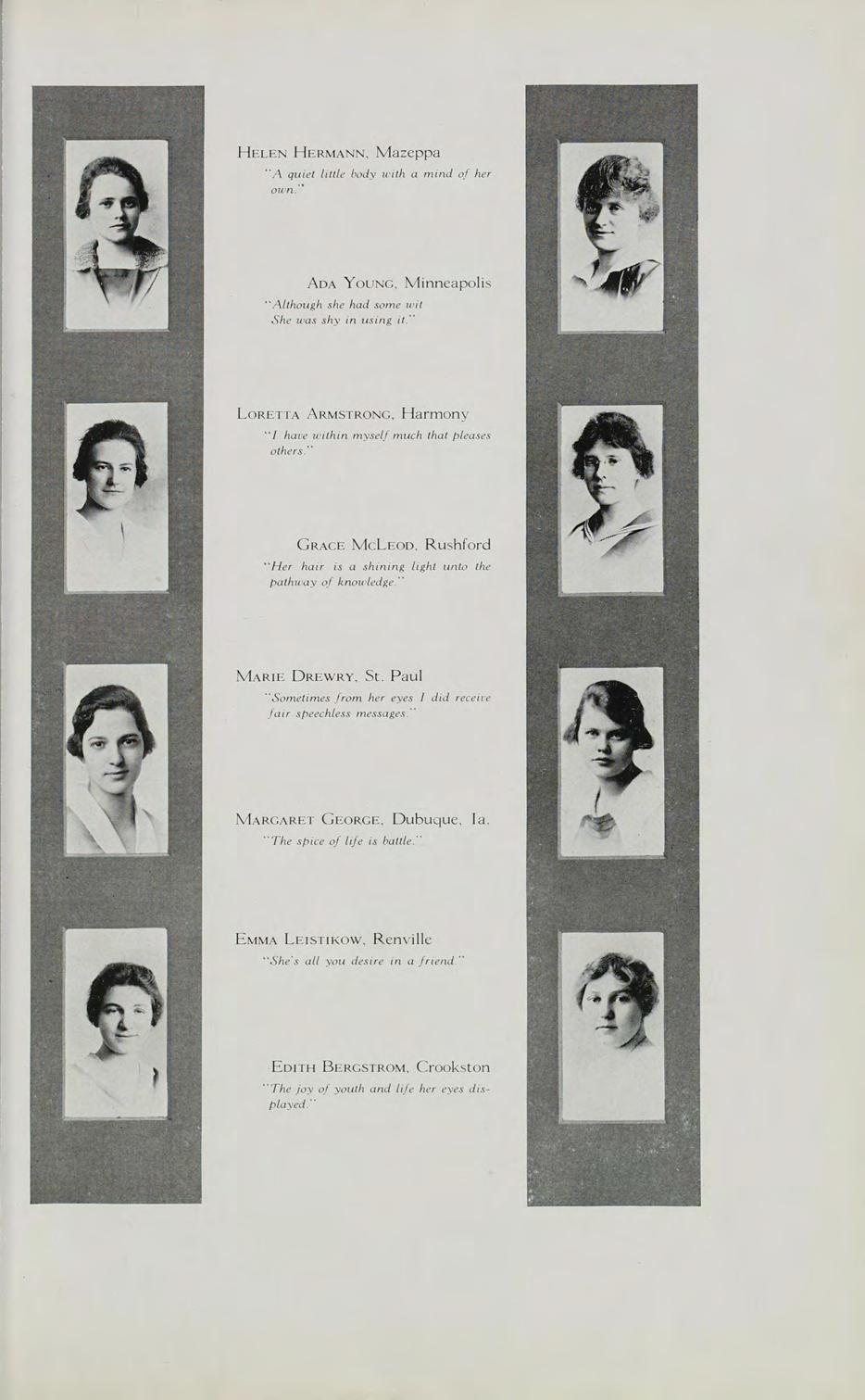
"The spice of life is battle."
Emma Leistikow, Renville
"She's all you desire in a friend."
Edith Bergstrom, Crookston
"The joy of youth and life her eyes displayed."
Frances Campbell, Austin
"My, I gel lonesome sometimes."
Thelma Curran, Willmar
'But O, she dances such a way: No sun upon an Easter day. Is half so fine a sight."
Frances Manchester Minneapolis
"Once a friend, always a friend."
Louise Reuter, Cochrane, Wis.
"Some are not wise, some are otherwise."
Ruth Miller, Prescott, Wis.
"She has a host of friends.
Bess Gordon, Spring Valley
"Friendship is the golden web that hinds this earth with heaven."
Grace Lee, Minneapolis
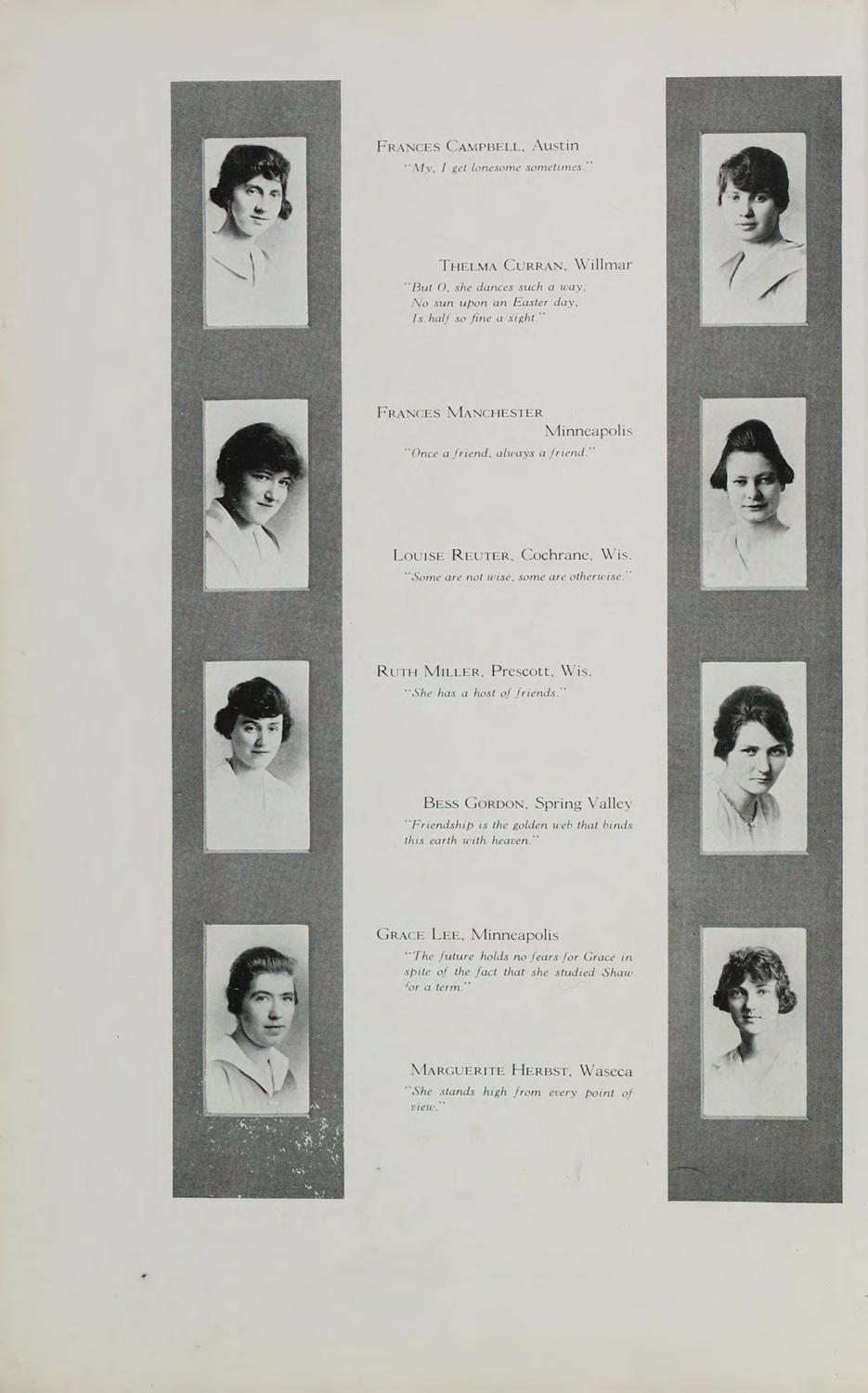
“The future holds no fears for Grace in spite of the fact that she studied Shaw f or a term."
Marguerite Herbst, Waseca
"She stands high from every point of view."
Hedwig Schollmeier, Winona
"I hare more zeal than wit."
Muriel Davnie, Hallock
"No matter how many her troubles are, she is always ready to laugh at a joke
Frances Hutchinson, Anoka
"A smile is worth a thousand tears."
Alberta Felenzer, Winona
"Nature fits all her children with something to do."
Oda Dreblow, Blue Earth
“Everyone sees the world in his own way."
Lauretta Harrison, Ft. Dodge, la.
"Oh, Liberty, Liberty, how many crimes are committed in thy name."
Louisa Persons, Utica

"My thoughts are in Texas.
Malvina Wiik, Belview
"A coat of grit, and one of wit, put 'em on you'll find they fit."
Elvira Anderson, Cannon Falls
"Earnest, faithful and true
Emma Vater Winona
"A true friend is forever a friend."
EIelen Christenson, Clinton Falls
"One of our seekers for knowledge"
Fern Wonderly, Minneapolis
"Next to your mother whom do you love?"
Bennett Morgan, Winona
"/ tend to the business of other people, having lost my own
Elsa Vater, Winona

"A good alt round athlete, forward in basketball her specialty."
Fucile Olson, Winona
"There is a gift beyond the reach of art of being eloquently silent."
Marie Danielson, Fountain
"Always the same, quiet and kind."
Helen Love, Preston
"Love is big."
Margaret Hassett, Winona
"Blue are her eyes as the fairy flax"
Cecilia Maher, Kellogg
“A camouflaged bundle of wit
Mary Young, Kellogg
"What can ue say to do her justice?"
Florence Campbell, New Auburn

"No wonder that everybody liked her
Helen Rogers, St. Paul
Is pure in her purpose And strong in her life."
Mildred Sebo, Winona
"A Nightingale, that all day long Had cheered the village with her song
Florence Johnson, Red Wing
"Whoever perseveres u ill be crowned."
Gladys Whitbegk, Caledonia
“Every virtue is fairer when it appears ivith beauty."
Lois Frye, Homer
“Whiz! Bang! Yes—that wlurluind was Lois."
Anna Uglum, Taopi
"Why stay on earth unless to grow?"
Barbara Armstrong, Dakota
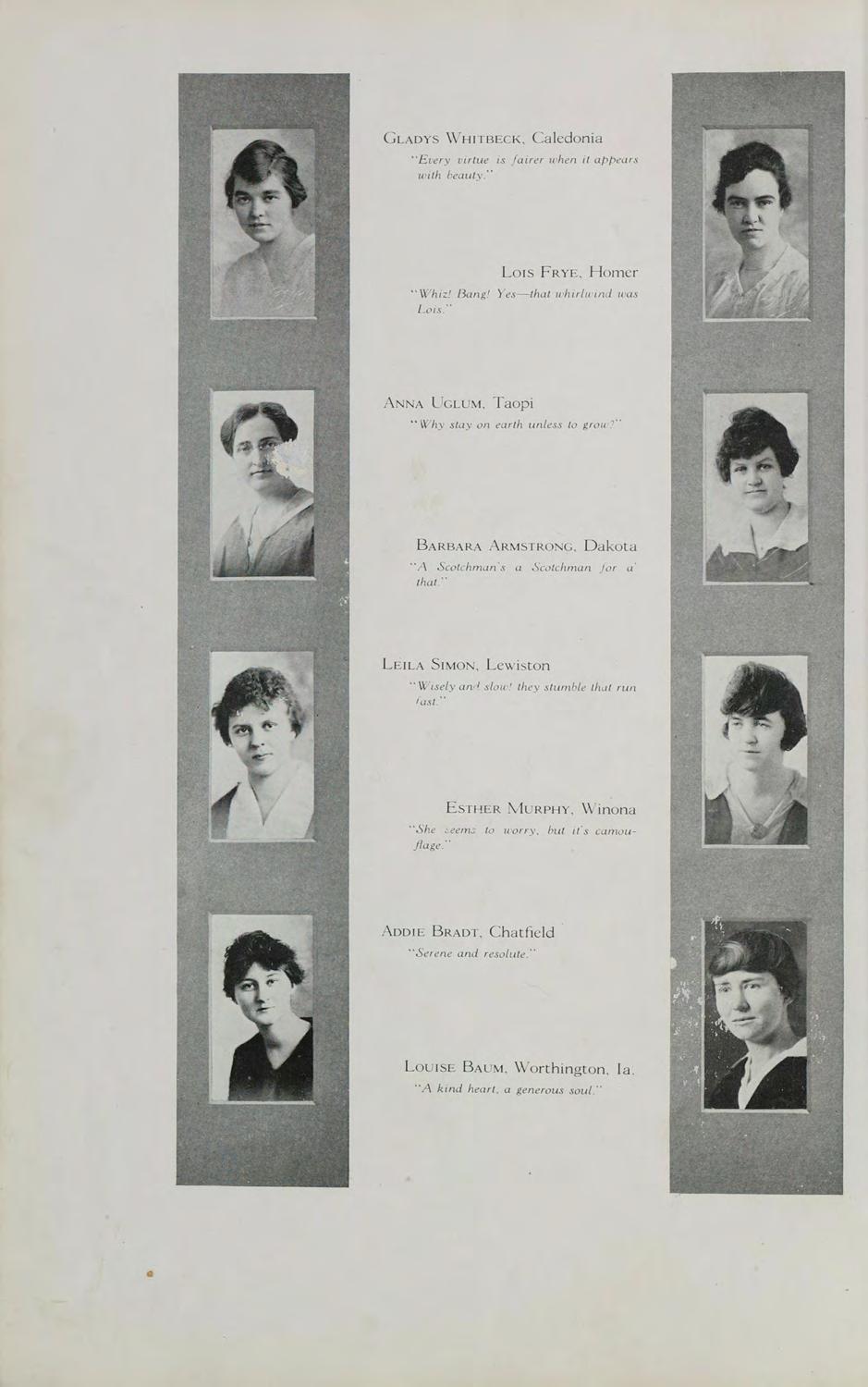
“A Scotchman's a Scotchman Jor a that"
Leila Simon, Lewiston
"Wisely and slow! they stumble that run last
Esther Murphy, Winona
“She ;eems to worry, but it's camouJlage
Addie Bradt, Chatfield
“Serene and resolute.''
Louise Baum, Worthington, la.
“A kind heart, a generous soul."
Q
mm
Marie Moran, Winona
"As su eet as she is fair."
Grace Baumbach, Whitehall, Wis.
“We can live without poetry, music and books.
But civilized man cannot live without cooks."
Lsther Hanson, Winona
"Her eyes smite constantly."
Olive Schultz, Winona
"She sings in strains of Baum.'
Viola Jordan, Winona
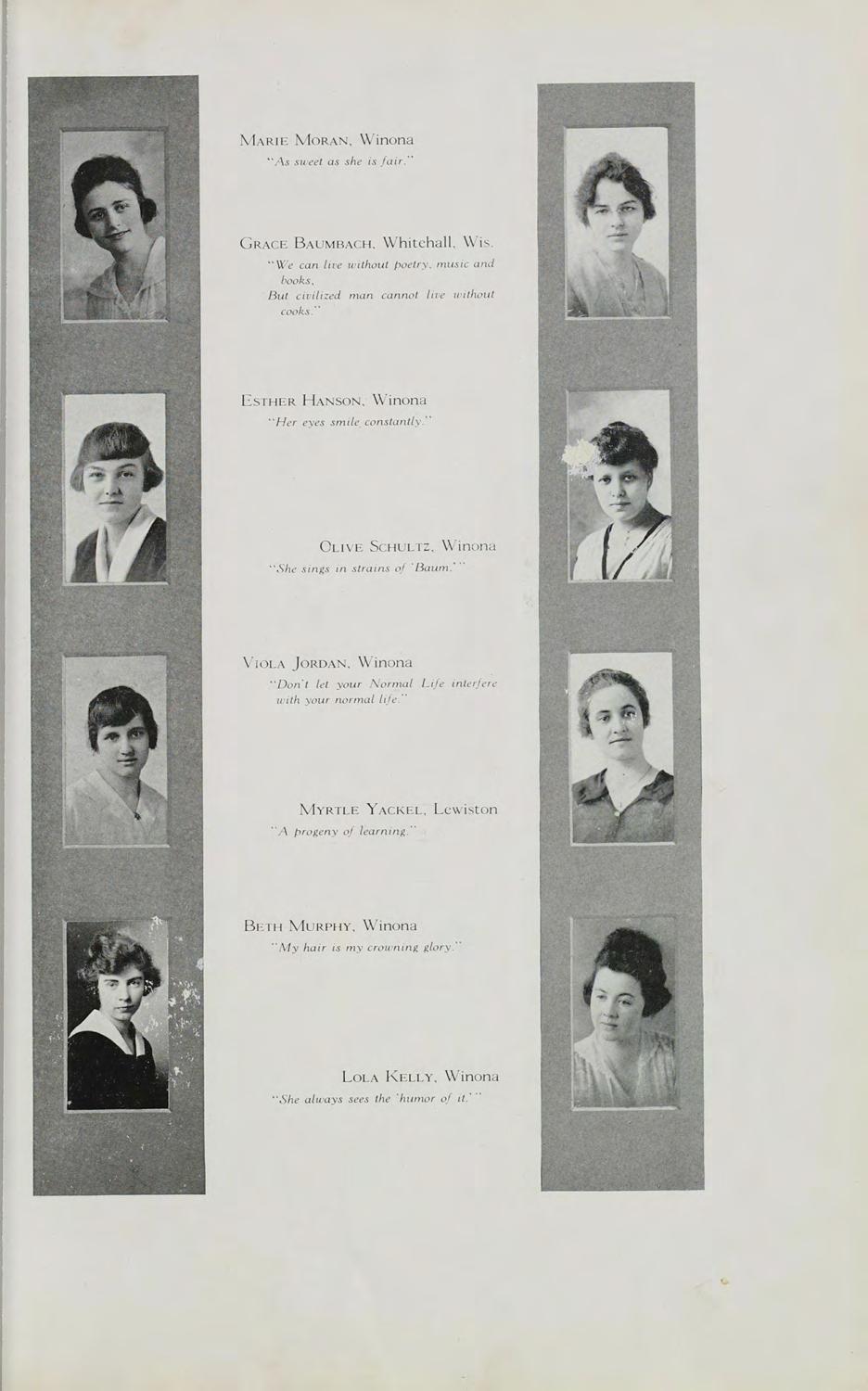
"Don't let your Normal Life interfere with your normal life."
Myrtle Yackel, Lewiston
"A progeny of learning."
Beth Murphy, Winona
"My hair is my crowning glory."
Lola Kelly, Winona
"She always sees the humor of it.'
Rebecca Crouch, Sleepy Eye
"A look, a smile, a dimple. You're caught, you’re captured, lost! Joyce Batson, Marshfield, Wis. "She smiles and wins."
Ruth Monten, North Branch “/ came, / saw, I conquered."
Catharine Whalen, Stephen "An artist."
Adelia Hanson, Winona Patience, Sweetness and Gentleness are power."
Gertrude Weyhrauch

"Always the same."
Minneapolis
Elizabeth Martin, Winona “Plows deep while sluggards sleep."
Charlotte Clark, Morris "All work, even cotton-spinning, is noble."
Celina Pilger, La Crescent
"Perseverance, her specialty."
Clara Otto, Red Wing
"When duty whispers low, 'Thou must,' the maid replies / will.'
Irene Kaphusman, Winona
“A puzzle for the brain."
Winifred Bausman, Minneapolis
"Oh Vinifred, dignified at tunes, but did you ever see her giggle?"
Inez Ingalls, Minneapolis
"Ambition has no rest
Louise Reitberger, Winona

You know
That you on the canvass are to repeat Things that are fairest, things most sweet."
Mary Fox, Minneapolis
"She’s mostly what Irish implies."
Josephine Woolley, Eyota
"The choicest pleasures of lije lie within the ring of moderation.
Irene Kay, Wheaton
“Never idle a moment, but thrifty and thoughtful of others."
John Wood, Winona "The Music Master."
Mary Foley, Bovev

"Like Twilight's too. her dusky hair
Helen Culhane, Rushford
"Happy at midnight. Happy by day."
Florence Posz, Plainview
"She has no thought of any wrong
Lydia Glabe, Oronoco
"Shall it be Matrimony or Woman's Suffrage"
Eleda Swanson, Cannon Falls
"Quiet, reserved, and always welcome."
Maxwell Lumelsky, Winona
"He'd undertake to prove by forces oj argument that a man's no horse."
Harold Olsen President
Class Officers
 Dora Blackmore Vice-President
Letha Davidson Treasurer
Cora Palm Secretary
Dora Blackmore Vice-President
Letha Davidson Treasurer
Cora Palm Secretary
Class Song
To honor the dear Winona days our loyal hearts unite. To sing of our Alma Mater dear, and herald her deeds of might. We gather w ithin her halls again and make the echoes ring, Our loyalty and love to thee, W’inona we would sing.
Chorus
We ll ne’er forget W inona days. Those dear sincere Winona days. The friends we’ve made and made aright. Beneath the purple and the white. And thru allthe years in all we do Winona we ll be true to you.
%
History of the Class of iqi8
Grace Armstrong
OW it came to pass that in the Land ol Uncle Sam in the State ot Minnesota, there was built a Temple of Learning, known in the statutes of the State as the Winona State Normal School. And in this temple there ruled many good Presidents doing that which was right in the sight of the State, declining neither to the right hand nor to the left.
And it came to pass that during the reign of Guy, in the year of our Lord 1916, there journeyed unto the Temple of Learning a host of youths and maidens out of the Land of Uncle Sam, seeking after knowledge. And on the fifth day of September they appeared before Guy who spake unto them these words: I have read thy records and thy credentials which thou hast sent before thee. And if thou wilt walk before me as thy predecessors have done, in uprightness, doing only those things which are becoming to a Teacher, then the State wilt grant unto thee that sacred document called a Diploma.
And the goodly company of youths and maidens bowed meekly before Guy and promised to do all that which he had spoken unto them.
Now, the host of Juniors, for so they were called in the Temple, met together and chose four of their band for leaders. And these chosen four were: Harold Riley, President, Mildred Carhart, Vice-President, Rae Whittom. Secretary, and Harold Olson, Treasurer.
And when all this was finished, the Juniors went about doing those things which were asked of them. And they were strong and courageous and were not dismayed by Arithmetic, or Psychology, or the Faculty Reception.
And they did battle with an enemy host and were victorious and prospered.
For it came to pass that there was need of rest in the Temple and the Juniors took counsel together saying: Let us give unto ourselvesand our brothers who have returned from the Border, a party. Let us clothe ourselves in torn raiment and go unto the Gymnasium with gaiety and laughter. Let us eat hardtack and drink water that we may not be wasteful of the fat of the land.
Now there was in the Temple an enemy host, called the Seniors, a horde of Seekers after Knowledge, who, having sought and found not, were yet conceited in their Lack of Finding. And these met together saying: Behold, we who are the Pillars of the Temple have not been invited to partake of the feast of the Juniors. Let us therefore repair in secret to the storehouse of these Ignatz and remove therefrom the manna on which they would feast.
Howbeit, the Juniors were watchful upon the night of the party and, while the enemy were munching hardtack, bore down upon them and they fled in terror. And the Juniors pursued and discomfited them and their boasting was turned into wailing and gnashing of teeth.
And thus it came about that the Seniors humbled themselves and looked up to the Juniors with reverence and obedience.
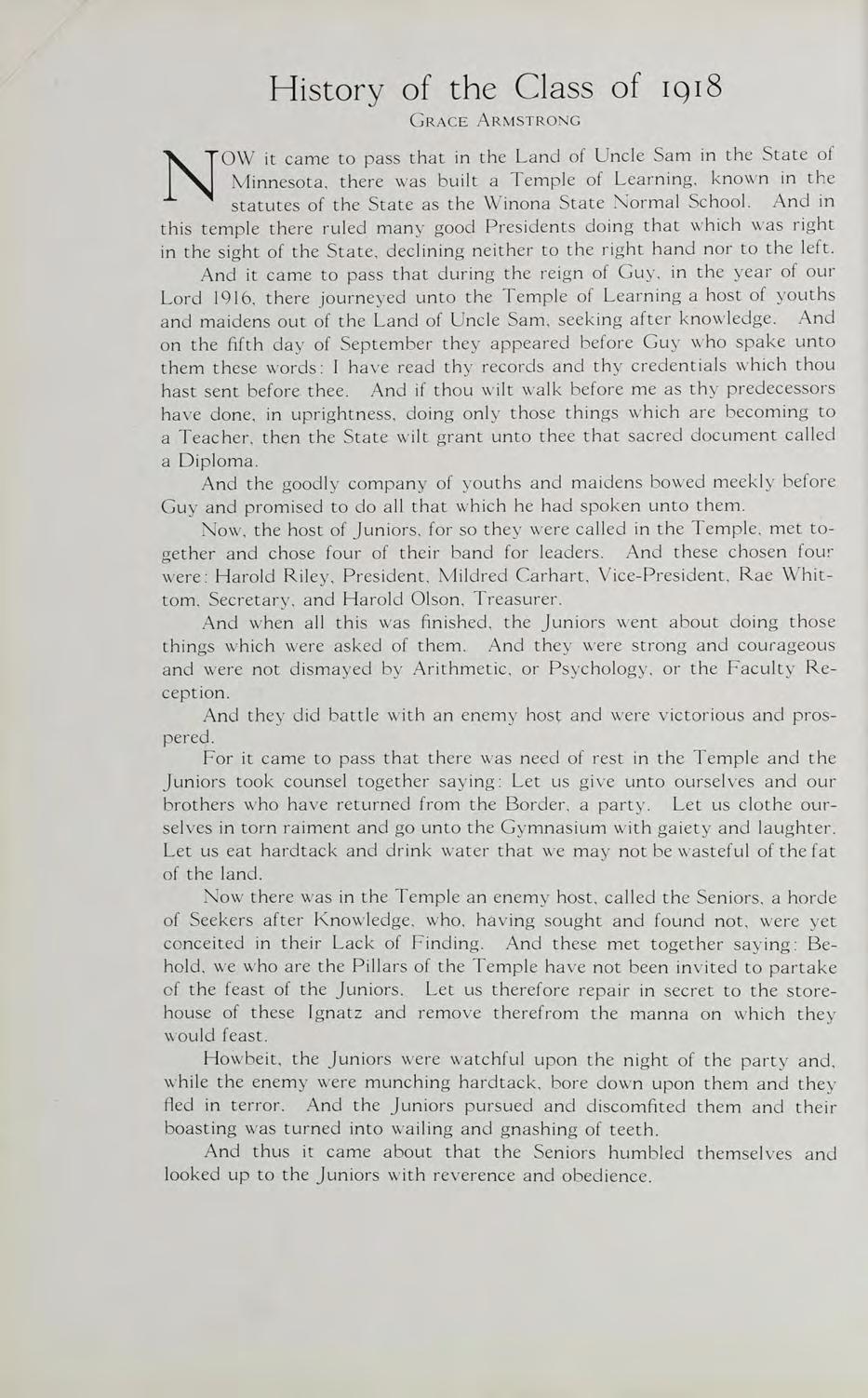
Now it came to pass that there were pirates upon the seas who did all that was fearful in the sight of mankind. And Uncle Sam called upon the youth of the land to destroy them that the world might be safe. And the Call was heard in the Temple of Learning and many young men went out to slay the monsters.
And so the Juniors lost many of their valiant number. And those who were left worked on dauntlessly that the End of the Term might not find them wanting.
And in the month of June they returned unto their homes to rest from their labors.
But in the Falk those who were strong and bold returned unto the Temple (for some had fallen by the wayside resting in E's). And they were now called Seniors for those who had been Seniors had departed from the Temple forever.
Now the Seniors took counsel together and once more elected four of their number for leaders. And these are they that were chosen: Harold Olson, President, Dora Blackmore, Vice-President, Cora Palm, Secretary, and Letha Davidson, Treasurer.
And it came to pass that Harold, being wise with much wisdom departed from the Temple unto the College of Carleton. And there was mourning in the Temple of Learning.
Now this year was a year of war and famine in the world and there was much work to be done. But the Seniors did all that which was asked of them, and more. They did eat war bread, and buy Liberty Bonds and make Red Cross bandages and compresses. And they murmured not when loud calls were heard for dimes, quarters, and dollars.
Moreover, the Seniors counseled together saying: Let each of us buy a War Savings Stamp. And let us give these Stamps to the Temple of Learning that we may put our name here forever. And so it was done.
And lo, the Seniors did write a book and did put therein many good things. And the name of the book was Wenonah.
And those who were actors did act a play called Green Stockings.
And the fame of the Seniors spread abroad thruout theland. And many Superintendents did call upon them to teach and did offer them silver and coppers.
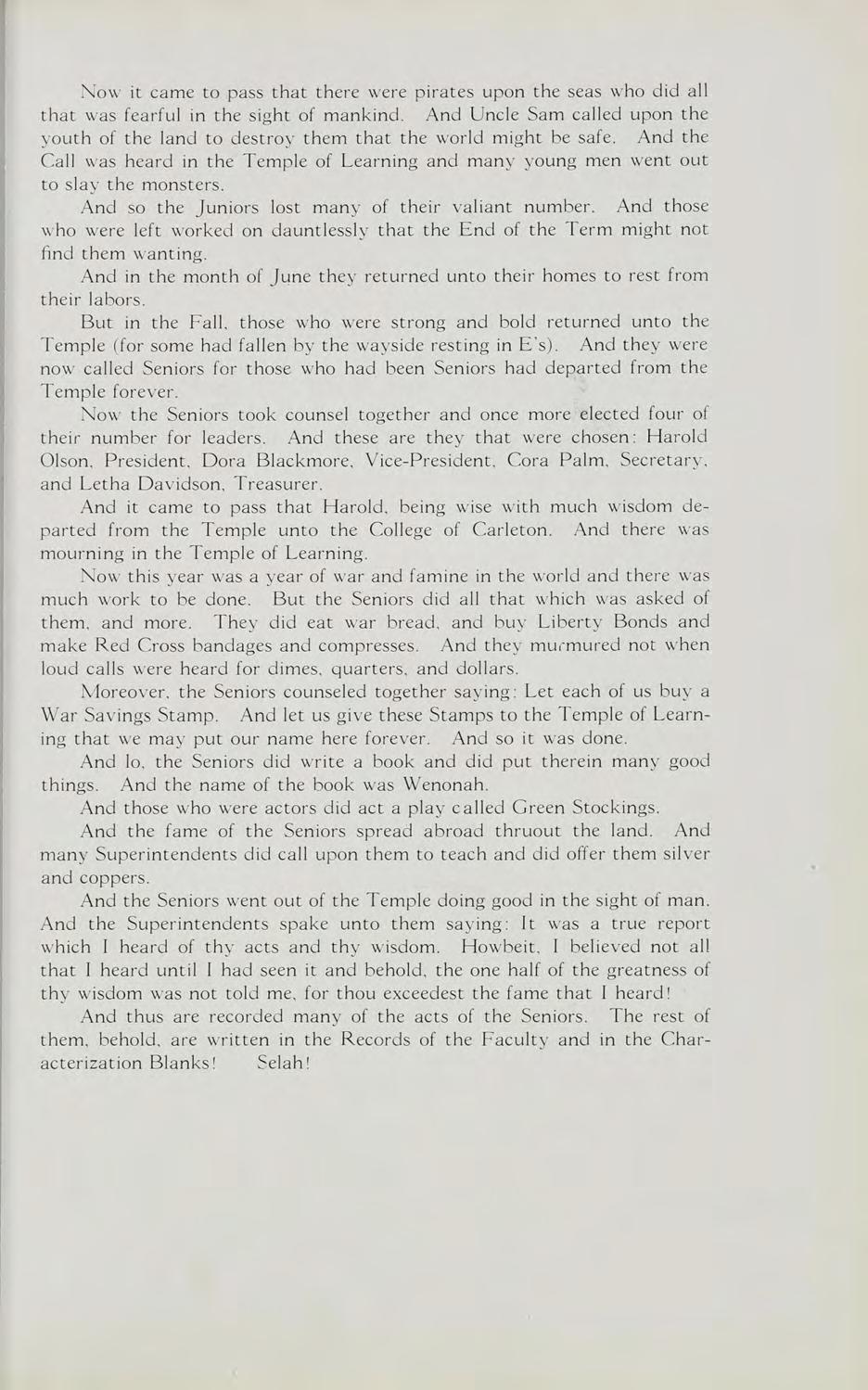
And the Seniors went out of the Temple doing good in the sight of man. And the Superintendents spake unto them saying: It was a true report which I heard of thy acts and thy wisdom. Howbeit, 1 believed not all that I heard until 1 had seen it and behold, the one half ofthe greatness of thy wisdom was not told me, for thou exceedest the fame that I heard!
And thus are recorded many of the acts of the Seniors. The rest of them, behold, are written in the Records of the Faculty and in the Characterization Blanks! Selah!
History of the Junior Class
 Alvira Risser
Alvira Risser
IT was on a bright September morning exactly nine months ago that the Juniors surged into that vast assembly halllike a never ending wave— all kinds of Juniors, "great ones, small ones, lean ones, brawny ones, grave old plodders, gay young friskers." The faculty looked and wondered, and the Seniors looked and knew. We were a sorry looking group upon our arrival; for we were of that meek, quiet, modest type, agreeing with all and disagreeing with none. What terrible predicaments our shyness did get us into! We lost ourselves in the myriads of doorways and hallways, failed to meet our appointments, and became hopelessly mixed up in the use of our English grammar. 1 will tell you in secret, my dear readers, that I am almost certain that Mrs. Chorpenning got the idea that we were so horribly stranded in our English because of those first agonizing, terrorizing moments! The faculty, after carefully going over us and putting us thru the mill, discovered, much to our distress, our fatal characteristics. No doubt recalling similar, or perhaps even more tragic beginnings, they took us under their protecting wings and dealt with us a little leniently. Do not misunderstand me; not in the class rooms were we dealt with more leniently, for there with the rest were we required to extract the tenth root of numbers clear into the quindecilions, or work out the problem of "How to Else Your Mind," or write an essay on "Human Behavior." In the hours of the day that were left, however, they were kind and thoughtful of us. Understanding our situation, a get-acquainted party was planned; yet, fearing that we might come to harm, "big sisters" were provided to take care of us. They did care for us in a praiseworthy manner, but their positions were to be but temporary ones, for we soon grew tired of letting our sister class occupy all the space in the lime light and walk off with all the honors; we, too.
wanted our share. We cautiously began to watch our big sisters ou tof the corner of our eye—(don't think for a minute that we let them know. They don't know it to this very day)—in order to see what they were doing to make them such a prominent and much esteemed group. What do you suppose we saw! Why, the Seniors had organized themselves and had elected class officers. You know, a hint to the wise is sufficient, (don't smile, because we really were gaining in wisdom day by day) so we got busy; we gathered together and did some organizing too. We elected Mr. Stevens for president, Miss Christensen for vice-president. Miss Cassidy for secretary, Mr. Baker for treasurer, and Miss Bloom for sergeant-at-arms. These officers formed the mainstay and backbone of the class; it was they who possessed the fairy charm and who transformed us from timid little individuals into one solid compact whole. Only this small amount of organizing brought about a most wonderful change! Ever since that day we, the Juniors and Seniors, have been twin sisters rather than a younger and an older sister; we have gone thru the school year hand in hand, sharing with one another both our sorrows and our joys.

Our Junior year was by no means all grind and work. The worthy faculty did not forget that "all work and no play makes Johnny a dull boy." Consequently, they set aside many an evening in which all the trials, discouragements, and disappointments of school routine were to be put aside and the King of Joy to rule supreme instead. The faculty, Country Life Club, Senior Class, and Kindergarten Club did much to make our school year a most delightful one and we sincerely appreciate their efforts. In order to show our appreciation and, also, to show our feeling of good fellowship, the Junior class in turn gave a May Party on the Morey Hall grounds. The May Party was a pretty affair and marked the close of the social season of the school. But parties were not the only source of rest to the bookweary Junior. Oh no! Mr. Holzinger and Mr. Scarborough, in their usual thoughtful way, discovered another source—that of hiking. Trips were made with Mr. Holzinger to Castle Rock and with Mr. Scarborough to Inspiration Point. (Undoubtedly Mr. Scarborough thought we Juniors needed occasional inspiration). What Junior did not enjoy those hikes! They not only released us from the school-room fatigue, but brought us into close contact with the great outside w'orld.
My readers will know from observation that twins do not always keep equal pace one with another, or, if they do, one will at least try to outrun the other. This was the case with the Normal School twins. The Juniors having once enjoyed the pleasant sensation of rising from a plane below their sister to a plane equal with her, now tried to reach a plane somew'hat above her. The effort was made in the field of athletics and we found that it was not in vain; for the football squad was made up chiefly of Juniors. The Seniors refused to admit that w e had surpassed them and claimed that "quality not quantity" counted in this case as in any other; but w e Juniors knew that both quality and quantity was our contribution to the football squad. However, as I have said before, Juniors and Seniors went hand in hand and the splendid record of our squad in the line of athletics was the result of the splendid contributions of talent from both classes.
When my reader holds this in hand, the class of which he reads will no longer be Juniors but will have passed into the land of the Seniors. Altho they will no longer bear the name of Juniors they will still bear the Junior spirit in their hearts and will still keep dear the memory of the days ol which I have just told you. Who would not cherish the days which witnessed the beginning of a life work, the beginning of a life of service to mankind! The Junior class has indeed been a worthy class and has, we believe, set an example worthy of being followed by succeeding Junior classes. Let us hope that they will continue to "love, serve and obey," as they have ever done, even after they have crossed the threshold and have passed into the great work-a-day world.
Junior ('lass
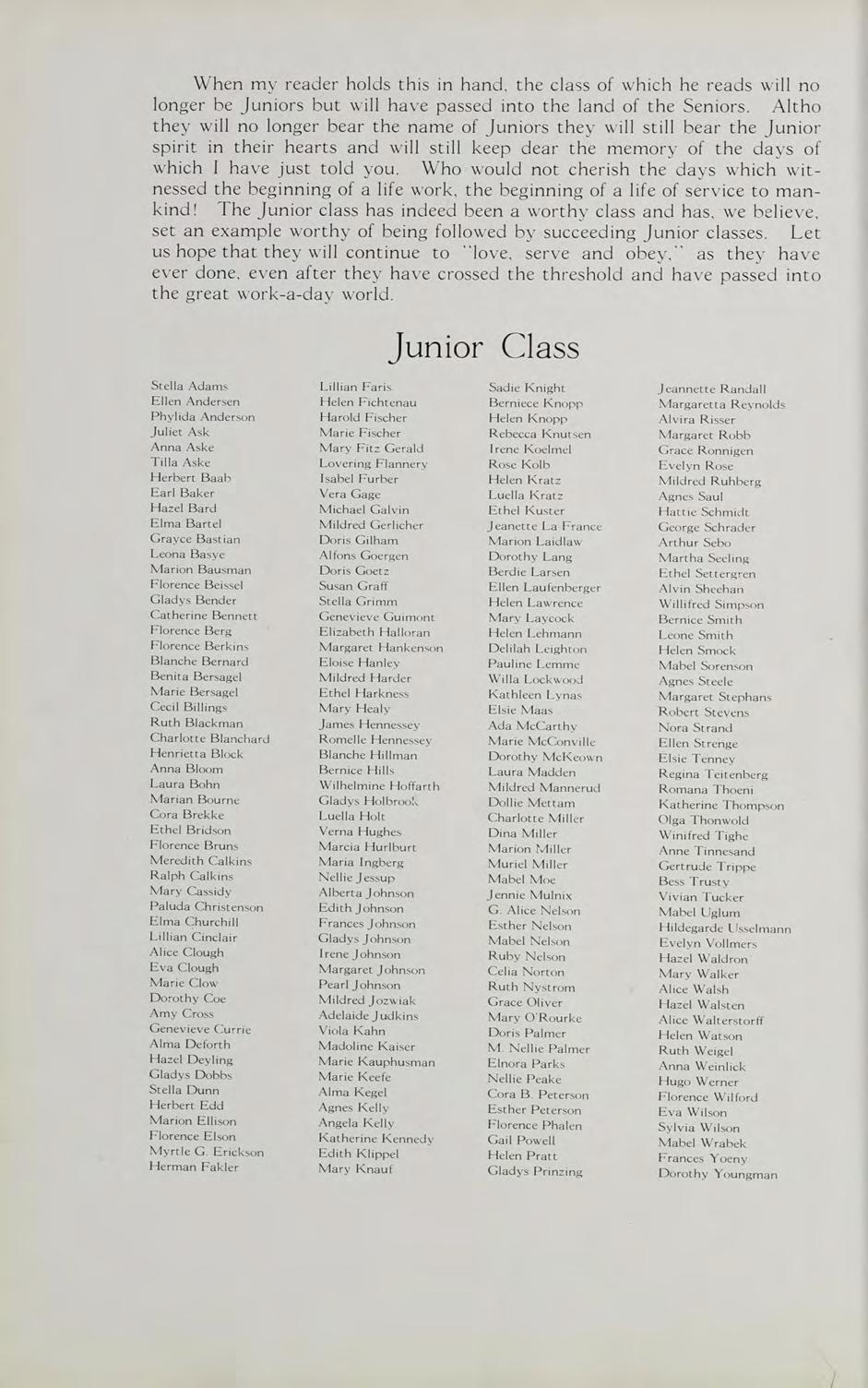
Stella Adams
Ellen Andersen
Phylida Anderson
Juliet Ask
Anna Aske
Tilla Aske
Herbert Baab
Earl Baker
Hazel Bard
Elma Bartel
Grayce Bastian
Leona Basye
Marion Bausman
Florence Beissel
Gladys Bender
Catherine Bennett
Florence Berg
Florence Berkins
Blanche Bernard
Benita Bersagel
Marie Bersagel
Cecil Billings
Ruth Blackman
Charlotte Blanchard
Henrietta Block
Anna Bloom
Laura Bohn
Marian Bourne
Cora Brekke
Ethel Bridson
Florence Bruns
Meredith Calkins
Ralph Calkins
Mary Cassidy
Paluda Christenson
Elma Churchill
Lillian Cinclair
Alice Clough
Eva Clough
Marie Clow
Dorothy Coe
Amy Cross
Genevieve Currie
Alma Deforth
Hazel Deyling
Gladys Dobbs
Stella Dunn
Herbert Edd
Marion Ellison
Florence Elson
Myrtle G. Erickson
Herman Fakler
Lillian Faris
Helen Fichtenau
Harold Fischer
Marie Fischer
Mary Fitz Gerald
Lovering Flannery
Isabel Furber
Vera Gage
Michael Galvin
Mildred Gerlicher
Doris Gilham
Alfons Goergen
Doris Goetz
Susan Graff
Stella Grimm
Genevieve Guimont
Elizabeth Halloran
Margaret Hankenson
Eloise Hanley
Mildred Harder
Ethel Harkness
Mary Healy
James Hennessey
Romelle Hennessey
Blanche Hillman
Bernice Hills
Wilhelmine Hoffarth
Gladys Holbrook
Luella Holt
Verna Hughes
Marcia Hurlburt
Maria Ingberg
Nellie Jessup
Alberta Johnson
Edith Johnson
Frances Johnson
Gladys Johnson
Irene Johnson
Margaret Johnson
Pearl Johnson
Mildred Jozwiak
Adelaide Judkins
Viola Kahn
Madoline Kaiser
Marie Kauphusman
Marie Keefe
Alma Kegel
Agnes Kelly
Angela Kelly
Katherine Kennedy
Edith Klippel
Mary Knauf
Sadie Knight
Berniece Knopp
Helen Knopp
Rebecca Knutsen
Irene Koelmel
Rose Kolb
Helen Kratz
Luella Kratz
Ethel Kuster
Jeanette La France
Marion Laidlaw
Dorothy Lang
Berdie Larsen
Ellen Laufenberger
Jeannette Randall
Margaretta Reynolds
Alvira Risser
Margaret Robb
Grace Ronnigen
Evelyn Rose
Mildred Ruhberg
Agnes Saul
Hattie Schmidt
George Schrader
Arthur Sebo
Martha Seeling
Ethel Settergren
Alvin Sheehan
Helen Lawrence Willifred Simpson
Mary Laycock
Helen Lehmann
Delilah Leighton
Pauline Lemme
Willa Lockwood
Kathleen Lynas
Elsie Maas
Ada McCarthy
Marie McConville
Dorothy McKeown
Laura Madden
Mildred Mannerud
Dollie Mettam
Charlotte Miller
Dina Miller
Marion Miller
Muriel Miller
Mabel Moe
Jennie Mulnix
G. Alice Nelson
Esther Nelson
Mabel Nelson
Ruby Nelson
Celia Norton
Ruth Nystrom
Grace Oliver
Mary O'Rourke
Doris Palmer
M. Nellie Palmer
Elnora Parks
Nellie Peake
Cora B. Peterson
Esther Peterson
Florence Phalen
Gail Powell
Helen Pratt
Gladys Prinzing
Bernice Smith
Leone Smith
Helen Smock
Mabel Sorenson
Agnes Steele
Margaret Stephans
Robert Stevens
Nora Strand
Ellen Strenge
Elsie Tenney
Regina Teitenberg
Romana Thoeni
Katherine Thompson
Olga Thonwold
Winifred Tighe
Anne Tinnesand
Gertrude Trippe
Bess Trusty
Vivian Tucker
Mabel Uglum
Hildegarde LJsselmann
Evelyn Vollmers
Hazel Waldron
Mary Walker
Alice Walsh
Hazel Walsten
Alice Walterstorff
Helen Watson
Ruth Weigel
Anna Weinlick
Hugo Werner
Florence Wilford
Eva Wilson
Sylvia Wilson
Mabel Wrabek
Frances Yoeny
Dorothy Youngman
literary department
The Legend of Wenonah Elizabeth
Crosgrove
VERY long ago, before the white man had traveled as far west as the Mississippi river, Indians lived where we live now. A tribe of Dahkotahs dwelt in their village Keoxa, which lay between the Great River, or the Gitchee Seebee, at the north, and a lake of blue water at the south.
Wahpashaw was the chief over this and many other villages. His lodge was at the farthest end of the village Keoxa. He had three children living with him. Two were sons, tall, straight and brave warriors like their father; the other was his daughter named Wenonah, meaning first-born daughter. She was so beautiful with her long black hair, bright eyes, and red, full-blown lips that she was sometimes called the wild rose of the prairie.
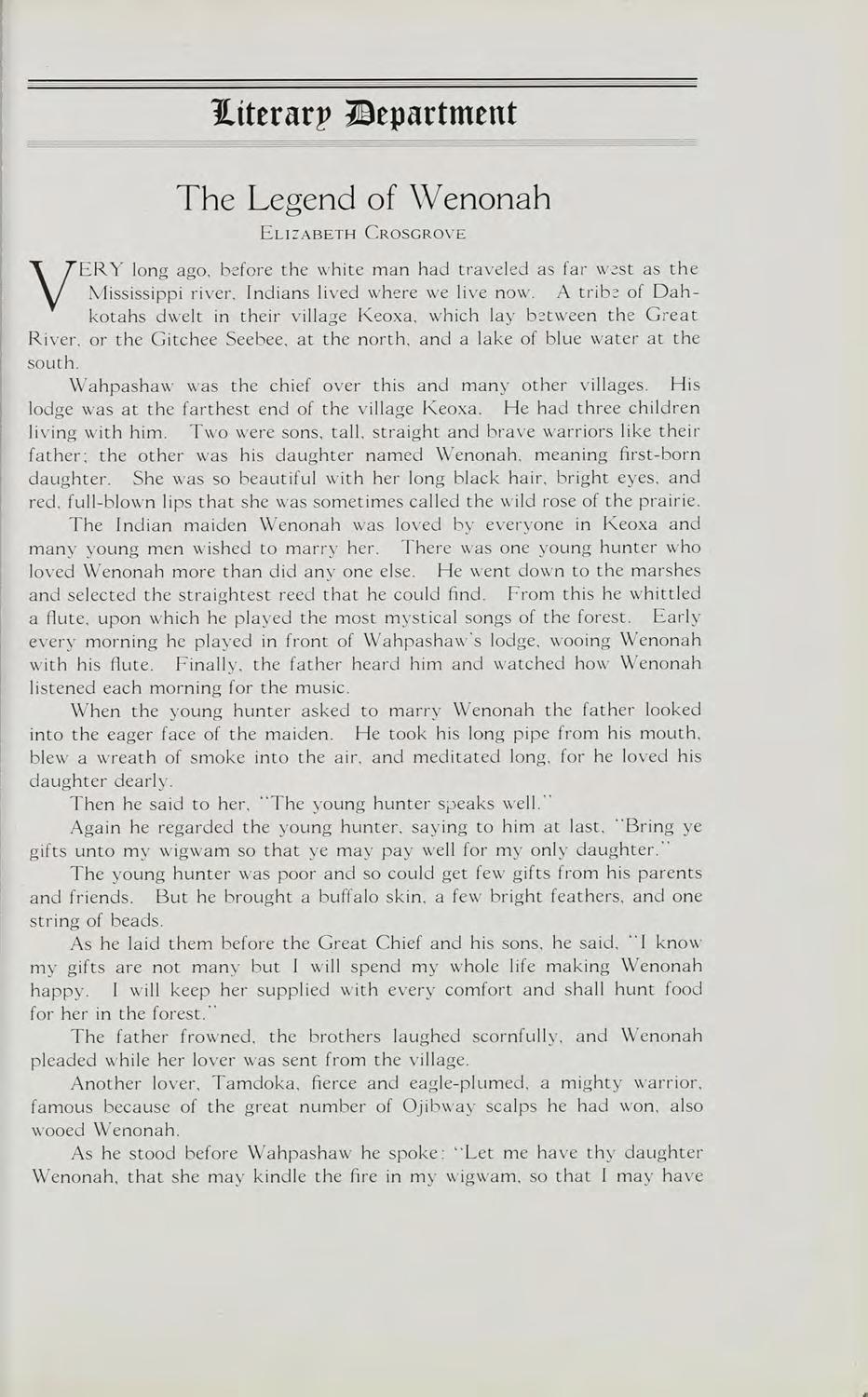
The Indian maiden Wenonah was loved by everyone in Keoxa and many young men wished to marry her. There was one young hunter who loved Wenonah more than did any one else. He went down to the marshes and selected the straightest reed that he could find. From this he whittled a flute, upon which he played the most mystical songs of the forest. Early every morning he played in front of Wahpashav's lodge, wooing Wenonah with his flute. Finally, the father heard him and watched how Wenonah listened each morning for the music.
When the young hunter asked to marry Wenonah the father looked into the eager face of the maiden. He took his long pipe from his mouth, blew a wreath of smoke into the air, and meditated long, for he loved his daughter dearly.
Then he said to her, “The young hunter speaks well.
Again he regarded the young hunter, saying to him at last, “Bring ye gifts unto my wigwam so that ye may pay well for my only daughter."
The young hunter was poor and so could get few' gifts from his parents and friends. But he brought a buffalo skin, a few bright feathers, and one string of beads.
As he laid them before the Great Chief and his sons, he said, “I know my gifts are not many but I will spend my whole life making Wenonah happy. I will keep her supplied with every comfort and shall hunt food for her in the forest."
The father frowned, the brothers laughed scornfully, and Wenonah pleaded while her lover was sent from the village.
Another lover, Tamdoka, fierce and eagle-plumed, a mighty warrior, famous because of the great number of Ojibway scalps he had won, also wooed Wenonah.
As he stood before Wahpashaw he spoke; “Let me have thy daughter Wenonah, that she may kindle the fire in my wigwam, so that I may have
some one to serve me when I return from the warpath ol the terrible Ojibways.”
He brought her father many gifts ot value. 1 here were six buffalo skins, a pot of red war-paint, a score of finely woven blankets, baskets made by skilled hands, strings and strings of beads, and a pair of moccasins for use in the coldest weather. He showed the brothers his belt of scalps and told them tales of his conquests. 1 he favor of the father and the brothers was won. But Wenonah looked towards the west, thinking of her hunter with the hope of his return in her heart.
Tamdoka came many times to ask for Wenonah, but none of her father’s threats would persuade her to live in the wigwam of the warrior.
One bright morning about corn-planting time, the band of Dahkotahs left Keoxa. They paddled up the great river Gitchee Seebee in their long birch-bark canoes. The journey was long and tiring, so when they reached Lake Pepin they were ready to camp. There were many high hills around the lake and the Indians landed and made their camp at the foot of one steep bluff which seemed to rise abruptly from the edge of the water into a high rocky peak that stood dark and foreboding against the sky.
The men fished and hunted here. The squaws dug the blue clay at the river bank and lined their baskets with it. They made dishes, too, to parch their corn in.
Again Tamdoka begged Wenonah to be his squaw. This time Wahpashaw gave his word to Tamdoka and the betrothal was sealed.

The wedding feast was prepared. But while all the Indians were feasting, Wenonah stole aw ay and climbed quickly up the side of the bluff. When she reached the summit she stretched out her arms to her people and called to them, pouring out her heart.
"Why must I marry Tamdoka, the warrior? Oh my father, I would rather remain a maiden since I cannot have the hunter, my lover, the man of my choice.”
As the people below began to understand what she was going to do they became terrified. Then the men started swiftly toward her, the mighty Tamdoka leaping first and away ahead of the others. Below, the women wailed.
The Great Chief Wahpashaw even broke the vow to Tamdoka as he looked at the slender form of his daughter, so high above him on the rock.
“My daughter, hear me,” he cried, “the betrothal shall be broken. I promise. Your hunter shall return.”
But Wenonah began to sing her death dirge. “Oh Great Spirit above,” she sang in a low, unsteady voice, “look down from your Hunting Grounds, for the light in my heart is gone and I must die.”
She wavered on the brink of the dizzy cliff. Tamdoka sprang swiftly upward from crag to crag, all the men following him. He reached the summit too late. Already Wenonah had disappeared over the cliff, and fallen upon the rocks, down into the dark deep water of the lake below.
This spot is now called Maiden Rock, or Lover's Leap, and it is told by some, that in the night, when the wind is blowing and the waters of Lake Pepin lap against the rocky cliff, Wenonah’s spirit rises from the lake and again sings her death dirge.
Hidden Treasure
Ruth Weinman
A dream forgotten, veiled and undefined
With magic moves me now as in the past; A call unheard, yet filled with meaning vast, A meaning that could save the lost the blind.
It seeks not beauty, famed, to ease confined But that unnoticed and by most outcast; It longs to break the bonds that held it fast.
To paint the hopes and sighs of all mankind. Why rush unheeding after treasure cast
In mocking molds, of only seeming worth.
While priceless gems are slipping from your sight O Stay! the light of endless ages past
May be to you a gleam to guide the earth
To treasures long concealed and lost in night.
A Senior's Dream
Alvin
Sheehan
With hardships I’ve oft been encumbered, I have sojourned in lands o'er the seas, 'Midst the snows of the North I have slumbered, I have dreamed neath a tropical breeze.
Strange sights 1 have seen in my traveling, Yet the follies of life I've disdained
And the mysteries of earth are unravelling. With the thoughts of great masters explained.
With sciences deep I have pondered Til I mastered each intricate thought.
And though much of my time I have squandered, Yet much knowledge to me it has brought.
I have lived in the thoughts of those masters Who, with minds far too great for their Age, Lived—suffered and died—sad disasters Held by Genius in Bond Vassalage.

As the dreamer, at twilight in dreaming. Can hear drifting down thru the years. From the mystical heaven's bright gleaming Soft music of the great rolling spheres.
So can 1 in my mind hear the singing Of those songs which I wish to be sung, Hear the chimes of the bells in their ringing. Though no bells are there to be rung.
My Patriotic Robin
“Come out! Come out! you’re most too late To plant your seeds, you see.’
My bright and early morning mate Stops work to call to me.
He dances wildly to and fro Endeavoring to catch That monster worm, our garden foe. One hop, he has it! Snatch!
"Come out! Come out!' he gaily sings, “I’m saving food for you, You’d better plant some seeds and things To save our soldiers too.
G. R. W.
My Sweetless Princess
You couldn't guess who leads the way When 1 set out for school. The princess of the clouds, so gay, Reflected in the pool. The sweetheart of the sun s bright ray Without a book or rule.
You'd never dream she'd lead aright. And never let my feet Trip down the paths of most delight. In search of candy, sweet.
For sweets, she says, are on the list Of “We must sacrifice.'' She haunts me, till I can't resist. This lady of the skies. I hear her sweetless voice insist That I must "Hooverize.'
 G. R. W.
G. R. W.
My Good-Night Star
As I go slowly up the stairs Without my candle true; A twinkle greets me, unawares. Just when I need him too.
He proves the jolliest friend to be I hat ever you did spy, He beckons with such elfish glee When I would like to cry.
Conserving light, seems just a game For him to play with me. He leads, I follow, for his name Is “Save 'lectricity.”
G. R. W.
patriotic ^orfe tit tfje J^ormal i&cfjool
Frances Barrows
Paul Baumgartner
Walter Benning
Frederick Borncamp
Burr Buswell
James Bush
Stanley Carncross
Vincent Conrad
Florance Considine
Edward Curtis
0. M. Dickerson
Elmer Dickman
Orrin Fried
Arthur Gallien
Cleon Gentzkow
Alfons Goergen
The Honor Roll
Richard Going
Mark Hanson
Harry Harris
James Hennessey
Frank Hess
Donald Holzinger
Gordon Huntley
Cyrus Jennings
Earle Jewell
Roy Laufenberger
Morrow McNickle
Clem Moran
Henry Muench
Leo Murphy
Sidney Page
August Rick
Wm. J. Robb
Arthur R. Sandt
David Steffen
Arthur Tarras
Morton Wheeler
Harry Wild
Louis J. Maschka
Harold Riley
RodgerBuck
J. Everett Burke
Thomas Considine
John Dugan
Earl J. Morgan
James Kauphusman
Kenneth Davis
Harris G. Pett
M. J. Atwood
Arthur Wachholz
Dedication of Service Emblem

THE Service Emblem which contains forty-five stars commemorating the service under the flag of forty-five young men and women of the Winona Normal School, was dedicated with impressive and dignified exercises on Washington’s Birthday. The program opened with the reading of a letter from Captain O. M. Dickerson who is stationed at Camp Dodge. The letter, which was read by Helen Hermann, said the boys were in comfortable barracks, enjoyed plenty of good food, and were allowed to train indoors during the severe coldweather.
President Maxwell dedicated the Service Emblem by recalling how, in the early years of the school, teachers left the desk to defend the flag, and showed the relation between the history of the school in that respect and the situation today. He then read the names of the young men and women now in service, and called attention to the beauty of the new Service Emblem which hung over the platform.
There were dedicated, in addition to the large Service Emblem, a smaller one to be hung upon the front of the building where all can see it from the street, and a framed and decorated roll of honor, containing the names of those in service.
The chief address of the day was delivered by Judge H. L. Buck, who said it was fitting to consider the dedication of a Service Emblem at a time when father and son banquets were being held; that Washington and his army bore a paternal relation to the sons of today, who are going forth to defend the principles for which Washington fought before we were a nation.
Other features on the program were the reading by Mr. Robert R. Reed of a passage from an address delivered by Premier David Lloyd George in the House of Commons in honor of the men and women who had taken part in the war, and vocal solos sung by Mr. Herman bakler, and Miss Marion Monson.
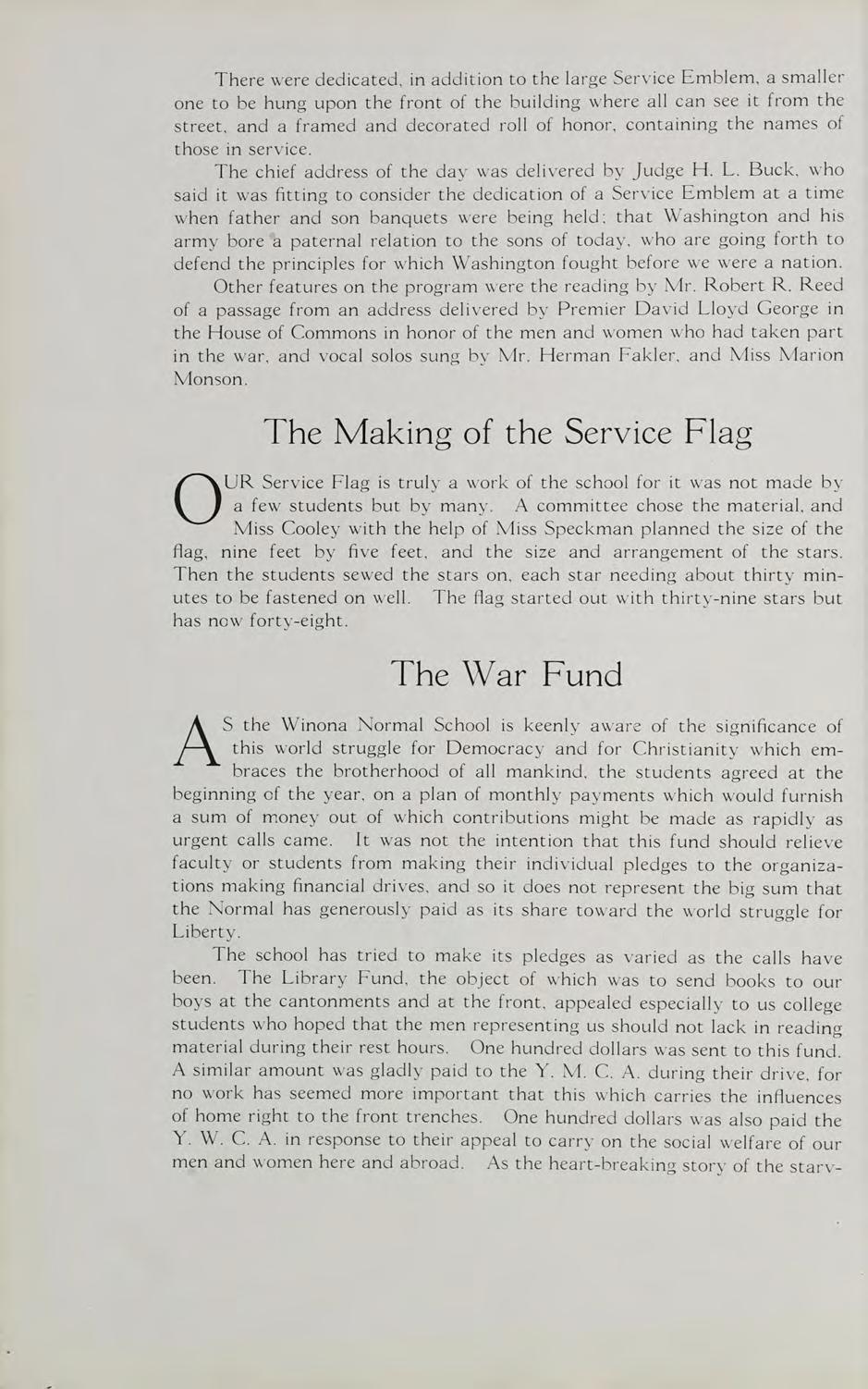
The Making of the Service Flag
OUR Service Flag is truly a work of the school for it was not made by a few students but by many. A committee chose the material, and Miss Cooley with the help of Miss Speckman planned the size of the flag, nine feet by five feet, and the size and arrangement of the stars. Then the students sewed the stars on, each star needing about thirty minutes to be fastened on well. The flag started out with thirty-nine stars but has now forty-eight.
The War Fund
AS the Winona Normal School is keenly aw'are ofthe significance of this world struggle for Democracy and for Christianity which embraces the brotherhood of all mankind, the students agreed at the beginning of the year, on a plan of monthly payments which would furnish a sum of money out of which contributions might be made as rapidly as urgent calls came. It was not the intention that this fund should relieve faculty or students from making their individual pledges to the organizations making financial drives, and so it does not represent the big sum that the Normal has generously paid as its share toward the world struggle for Liberty.
The school has tried to make its pledges as varied as the calls have been. The Library Fund, the object of which was to send books to our boys at the cantonments and at the front, appealed especially to us college students who hoped that the men representing us should not lack in reading material during their rest hours. One hundred dollars was sent to this fund. A similar amount was gladly paid to the Y. M. C. A. during their drive, for no work has seemed more important that this which carries the influences of home right to the front trenches. One hundred dollars was also paid the Y. W. C. A. in response to their appeal to carry on the social welfare of our men and women here and abroad. As the heart-breaking story of the starv-
ing Belgian babies was told us by an eye witness, one hundred dollars was drawn from the fund and sent to the "Belgian Children's Milk Fund." Belgium’s silent, heroic suffering, America does not forget. A case of tools was purchased and sent to "Our Beloved Captain," Captain Dickerson who had been asked how we might help him most. Walks at the cantonment at Fort Dodge were built with these tools, and many conveniences were made possible thru them. Perhaps nothing gave us greater pleasure than the adoption of the little French boy, Jean Cadiro who lives at Canivarch, and was born Oct. 7, 1913. We have sent $36.50 to him. We shall pay before June one hundred dollars to the Winona Chapter of the Red Cross, and then our treasury will be empty.
However, our little sum of five hundred seventy-five dollars has been a source of great joy to us, as we have seen it dispersed to alleviate the suffer ing of little children, Belgian and French—and to help sustain our great armies who are battling for all that we believe makes life worth while.
War Fund Committee Chairman, Florence L. Richards
Elsie Anderson
Ralph Calkins
Alumni Flag
ON the east wall of the assembly room beside the Service Emblem hangs the American Flag presented to the W. N. S., this year, by the Alumni. The flag is eighteen feet by twelve feet and is as beautiful as it is large. The school is deeply grateful to the Alumni for this gift which represents the ideals of our country and. we hope, of the W. N. S.

Our War Garden
PERHAPS you have never heard of bottled potatoes. Well, we had never heard of them either until last spring and the way we got the information was by having a war garden.
You will remember that the scarcity of potatoes in the spring of 1917 presented a rather serious problem and, of course, as loyal citizens, the Morey Hall girls fairly jumped at the chance to make a war garden in which to raise potatoes, when it was announced that Mrs. Frank Horton had asked for the privilege of loaning us a plot of land by the lake, for that purpose.
I guess it was rather amusing to the neighbors to see the girls, attired for garden work with rakes and hoes, descending the path of the lakeside garden. To tell the truth, we were quite amused at ourselves. But the garden! It wasn't a garden at all, but a junk pile, for, above the ground for several inches, were bottles and tin pans and glass and stones, and the same articles continued for a considerable depth under the surface. It seemed discouraging at first but we burrowed after the cans, carried them into the roadand made it possible to see the ground.
Planting days arrived at last and we really didn't mind digging potato holes and seed trenches in the sod and stones for, all the time, we were planning on the good meals we should have in the fall. (At least the Juniors were thinking of them. Perhaps those who flunked in Arithmetic were thinking how hot it would be to hoe during the summer term).
Planting the seeds as we did, in with the discarded tinware, we expected that the beans at least would appear on the stalks already canned. We were disappointed in that, but the real surprise came in the fall when a potato was found snuggly fitted in the neck of a bottle and that is the first time we had heard of bottled potatoes.
Our war garden was a great success tho and was the means of furnishing us with fifty bushels of potatoes, eight bushels of beets, seven bushels of carrots, three-fourths of a bushel of beans, seventy-five bunches of radishes and all the lettuce we could eat besides furnishing those who worked in the garden with enough exercise to warrant their skipping gymnasium classes. This spring it will be unnecessary to stress potato raising but if it were, we would be willing to do that bit for Uncle Sam tho to do so would require removing two feet of junk instead of one.
H. H.
The Liberty Loan - Morey Hall Scholarship

THE war committee of our school has been most active in devising ways of getting money and in deciding what the best ways of disposing of it are. One of the finest plans which has been carried out, in part, is the purchasing of Liberty Loan Bonds as a foundation for the Liberty Loan-Morey Hall-Scholarship. The plan is to buy a one hundred dollar bond at every issue of government bonds. So far, two one hundred dollar bonds have been purchased and the third one is to be taken out now in this third drive. If the war ends very soon, the school will continue adding one hundreddollars each year to the fund until the desired amount of money is secured.
The scholarship which is to be made possible by the money invested in the bonds will be a most desirable one to obtain. The interest on the money secured for the scholarship is to be given toward the current expenses of the fortunate young lady. In addition to the money, a single room at Morey Hall is to be set apart for the holder of the scholarship, andher board will also be given to her. Just think what a wonderful opportunity some one will get. I wonder who will be the first happy holder of the scholarship.
Editor-in-chief
Assistant Editors
Business Manager
Assistant Business Managers
Art Editor
Assistant Art Editors
Cartoonist
Picture Editor
Girls’ Athletic Editor
Boys’ Athletic Editor.
Joke Editors
Faculty Advisors....
The Staff

Ruby Johnson
f Grace Armstrong
j Margaret Corcoran
1 Jeanette Baer
Arthur Wachholz
Bennett Morgan
Margaret Glenn
Ruth Montcn
Ruth Weinman
f Josephine Brannan
Katherine Whalen
1 Marion Bourne
[ Joyce Batson
Raymond Stahman
Dora Blackmore
Margaret George
Bennett Morgan
f Cora Palm
\ Muriel Davnie
/ Miss Hubbard
\ Mr. Reed
AS you owners of this “War Annual read, and we hope re-read it, it is the earnest wish of the editors that you bear in your minds all of the following facts regarding this book. We do not intend to apologize for the book, not a bit of it, but we are afraid you may see a few faults and remember them to the oblivion of all the good in it. Therefore we wish you to remember: first, that the book is a War Book, that it therefore had to be small in its dimensions, that the printing had to be small and compact, and that pictures and the like had to be sacrificed for want of space; secondly, that we tried to represent every prominent phase of the school life, and, if by chance, you think that something very important has been omitted, remember that many articles have been omitted because of the scarcity of printing space; thirdly, we wish you to note the work which the artists of the school have rendered toward making an original, artistic book; fourthly, we wish it known that the book was not intended to be a literary masterpiece but that it was our intention to have it reflect the joy and action of school life, and the spirit of the times. We therefore had people of all degrees of ability contribute to the book and so the credit for it cannot be given to any one group of persons. With these remarks in mind during your first readings we hope that it will always afterward remind you of memories which you cherish.

Editorial
The Kindergarten (dub
Will you hear of our club of nineteen-eighteen?

(We have not been active to some it might seem.) But you who might think so, just listen to me While I tell you in brief of our club’s historie.
When school first began, to our Juniors so sad A picnic we gave, to make them feel glad. (Now they, in return for this welcome so hearty. Have promised the Seniors some kind of a party.)
Then after the Juniors became more contented. The matter of Liberty Bonds was presented. Our club was the first one to answer the call By buying a bond, thus "starting the ball.
The Day Nursery children, thru all the long year
On Saturday mornings, neath dark sky or clear, Have been properly cared for by every club member. Each taking her turn this service to render.
d£>rganfiation£f
When Thanksgiving came, for these children so dear We took to their nursery, some seasonal cheer. We gave them a party—goodies, games, and folk dances, A story, some songs, and all that entrances.
We have in our club a Christmas Gift Book, Thru whose pages our friends love often to look. After they have looked, we can always rely On their wishing some gifts, for their true friends to buy.
This year, thru their orders we earned quite a sum— About thirty dollars to add to our fund. We appreciate greatly the orders received. And are glad that these shoppers by us were relieved.
Now, about this time, we turned our attention To the “Christmas Sing," that lovely retention Of an old fashioned custom. We keep it each year W'ith a story, and carols, and merry good cheer.

Then when the days of the New Year seemed longer, And the sun shone brighter, and the air was warmer. We invited the school to come to our party Dressed as their colonial ancestors hearty. Our guests arrived! There were pilgrims shy. And colonial dames, with their hair combed high; And fine gentlemen, with buckle and puff. All joined together “Dull Care" to rebuff.
Now these are the things we have done this year. While we have all been so happy here. We hope that each year the club does no less The Nursery, the school, and its own self to bless.
Country Life Club
THE Country Life Club has worked this year to bring about the "regular raise" in the quality of the work clone by the Club and it feels that it has done so. Without waiting for some other club to give an incentive for getting to work, the C. L. C. re-organized only a week after school began last fall, and has carried on regular meetings of interesting variety ever since.
Once to every Normal student comes the moment of hearing about the needs of the individual. The Country Life Club watched and studied the needs of the individuals in the club and also the needs of the whole school.
From these needs grew some of the party-ideas which were so successfully carried out. In the fall of the year, we felt that w'e needed to know each other better socially. We knew also the need of the Gilmore Valley Teacher's Home for a new comforter. We decided to kill two birds with one stone and did so by meeting one evening to tie a warm wool comforter while at the same time we told our troubles and tried to comfort others whose troubles were greater than our own. W'e do not want you to think from this that the C. L. C. had real troubles; we were only just pretending.
Another time we felt that the whole school needed some fun, so shortly after Christmas vacation we announced to the school that they become country school children and come to visit "our school. From many little side remarks, w'e believe we drove cares away successfully.
The Country Life Club, however, does not believe in "all play and no work." All programs carried out have been full of suggestions, not only for those expecting to teach in rural communities but also to the many others who joined our Club. At some of our meetings members of the Club gave interesting contributions to the program; at others outside speakers brought messages from the wider fields in which they were working.
The influence of the Club is such that it will be felt outside of the Club; its influence will be carried soon to the many communities into which the Club members will go within a year. May the good work continue.—L. L.
 Emma Richter Mr. Howard
Alice Clough
Leila Simon Vera Gage Christoffa Gaard Miss Trites
Maria Ingberg, Alma Bartel, Agnes Steele.' Eva Clough
Mabel Sorenson, Mary O’Rourke, Laura Bohn, Martha Seeling Bernice Smith, Alice Walterstorff, Anna Weinlich,
Emma Richter Mr. Howard
Alice Clough
Leila Simon Vera Gage Christoffa Gaard Miss Trites
Maria Ingberg, Alma Bartel, Agnes Steele.' Eva Clough
Mabel Sorenson, Mary O’Rourke, Laura Bohn, Martha Seeling Bernice Smith, Alice Walterstorff, Anna Weinlich,
THE Mendelssohn Club has gained much favor and popularity in the community this year. This popularity was due, especially, to its excellent number at the Vaudeville entertainment last fall at the Opera House, for the benefit of the Red Cross.
The Club has done splendid work all year, having appeared in a special number, with Miss Dorothy Sherwood as soloist, at the Thanksgiving Commencement program, and twice in chapel exercises, the last occasion being the presentation of the Normal School Service Flag.

This spring the Club worked hard on its May Festival program which included many delightful selections and was the “best ever" of all the “best evers.” F. C.
The MacDowell Club
IN addition to the Mendelssohn Club, two other musical societies live in our school. I he MacDowell Club consists of about one hundred girls who have studied folk songs and favorite American melodies this year. The St. Cecilia Society consists of about two hundred fifty girls. This year it has studied the works of modern American composers in addition to a presentation of Handel's “Messiah." This masterpiece of the famous composer was given by the chorus to a most sympathetic audience. A greater compliment to the work of Miss Smith and the chorus could not be paid than that which was unconsciously given in the request that the “Messiah“ be repeated.
The close of the year’s work was marked by a beautiful Spring Festival which consisted of a program by the St. Cecilia Society on music of the Allies, a recital by the Mendelssohn Club, and a program by the Music Super- vision Club.
The Mendelssohn Club
Dollie Mettam. Irene Koelmel. Nann Ashcroft, Marion Monson Romana Thoeni, Frances Campbell, Olive Schultz, Celia Norton, Alvira Anderson. Charlotte Blanchard, Margaret Hankenson, Marie Drewry. Helen Love Blanche Hillman, Frances Manchester, Loretta Harrison, Isabel Furber Fern Wonderly, Dorothy Sherwood, Adelia Hanson, Mildred Sebo, Gladys Dobbs, Marion Laidlaw, Muriel Gorham
Y. W. C. A. Cabinet

ON Monday, when you hear an announcement of a Y. W. C. A. meeting to be held at five P. M. in the Study Room, or when you see a poster on the Bulletin Board announcing a meeting, does that mean anything to you at all 1 Just what does the Y. W. C. A. stand for in your mind 1 It is an organized body of young women working and striving to promote Christian interest and friendship in the school, trying to make life mean more, be more to all the students.
The work of the Y. W. C. A. starts early in the fall before most of you have arrived with your baggage and curiosity about the Normal School. Several days before school is formally opened, the cabinet members are here meeting trains, and even before that writing letters of welcome to the new girls w; ho are entering. Then when the hurry and bustle of school begin there are homesick, unhappy girls and it is up to the Y. W. C. A. girls to comfort them, make them happy, and introduce them to many other girls who, goodness knows, perhaps feel the very same way. Altho all Y. W. C. A. members help, there is one committee that is in charge of this. It is the social service committee. Besides attending to this duty, they also give comfort to many unfortunate people who perhaps are not always thought about in the stress and hurry of school duties. This winter they have read and sung to the elderly, given comfort to several sick children, and remembered many little boys and girls who otherwise would have had nothing to brighten their Christmas.
About two weeks have gone by since the opening of school. Can you go back that far with me? It is time to get new members for the Y. W. C. A. and now the membership committee puts forth its best efforts, being helped
Miss Richards Miss Orr Miss Holmes Miss Staples Muriel Davnie, Ethel Brown, Anna Allen, Dora Blackmore, Violet Melander, Marion Laidlaw Cora Palm, Irene Kay, Helen Rogers, Frances Manchester, Eleanor Olson
of course by all the cabinet, to gain many new membersand tag them with little pink tags which show that they have joined. Later they may pay their dollars. This committee, in cooperation with the social service committee, has also organized the Red Cross work at the library.
Will you turn over the calendar 1
Several weeks have elapsed and now it is time to initiate the eighty or more new members whom we tagged. This service is held at the city Y. W. C. A. Its symbolism, its thought, is so beautiful that each member long carries the remembrance of it. I he social committee has this initiation in charge, as well as all other social events of the year.
After the school year is well started the program committee is at work planning interesting, helpful meetings. This year we have heard of the wonderful work of the Y. M. C. A. at the front, ofthe worldwide Red Cross service, and have had talks on the missions, in our country and abroad. We have also had a talk on “Sunday Study" followed by open discussion.
The poster committee aids the program committee by announcing meetings on the bulletin board. This committee is a general information committee as well, and reads what is happening in relation to Y. W. C. A. affairs. It has also helped in organizing informal Bible study groups.

When you have gone to the Y. W. C. A. rest room has it occurred to you to wonder who was in charge of it? The Y. W. C. A. maintains a committee to look after it. Often the girls are tired or sick and this is the place that they may call their own. It is meant for them and we want them to get all the benefit and comfort possible from it. Mr. Sandt has given his services in adding to the attractiveness of the room and the Y. W. C. A. is greatly indebted to him.
But behind all organizations there must be money, and of course the Y. W. must have it too, to meet its needs. The directories are put out each year under the direction of the finance committee and what could we do without this precious little book of addresses and telephone calls 1 We have also had great fun in casting bags of popcorn among the bleachers at basket ball games to help raise money for the delegate to the conference next summer at Geneva.
Does the Y. W.C. A. mean more to you now 1 It is for you Juniors to make it mean still more next year, to reach the new girls, to strengthen and encourage them, and to make the Y. W. C. A. really mean something to them and to you. Our best wishes go with you.
F. M.
Music Supervision
WOULD you enjoy an automobile drive out into the country some beautiful spring day? Then join the members of the Music Supervision class who are doing rural school music teaching in the schools affiliated with the Winona Normal School.
The red school house on the hill at Minnesota City is visited each week by Miss Jeannette La France. At the one on the Pleasant Valley road. Miss Elvira Anderson finds herself making sweet music in one of the most attractive school rooms in southern Minnesota —and again at Gilmore Valley, another ofthe fine affiliated schools. Then Miss Mildred Sebo goes down to classic Homer, and after singing charming melodies in the little river town, she follows the long winding road up to the East Burns Valley school. Miss Ruth Richardson actually gets a ride upon the train once a week when she starts out for the village of La Crescent where she teaches music in a three room building. There has been but little organized rural school music supervision in this county thus far, and so the children in at least six schools of Winona County are singing as are many in the cities of Minnesota.
A "Spring Festival" is being planned which will combine the six schools in one big event, sometime during the first week in June.
The class is made up of graduates from our local high school as well as other schools. The members are as given: Misses Elvira Anderson, Josephine Brannan, Isabel Furbcr, Alberta Felenzer, Muriel Gorham, Wilhelmina Hoffarth, Bernice Knopp, Jeannette La France, Marion Monson. Ruth Richardson, Margaret Robb, Olive Schultz, Helen Smock, Mildred Sebo, Eva Wilson, Mr. John Wood.
The purpose of our Music Supervision Course is to prepare teachers for the work in grade teaching, as well as in supervision, the excellent professional training received in other departments greatly strengthening the work of the music hour.
Industrial Arts
"The study of industrial arts should develop primarily industrial intelligence, insight, and appreciation, subordinating skill in manipulation to thought content."
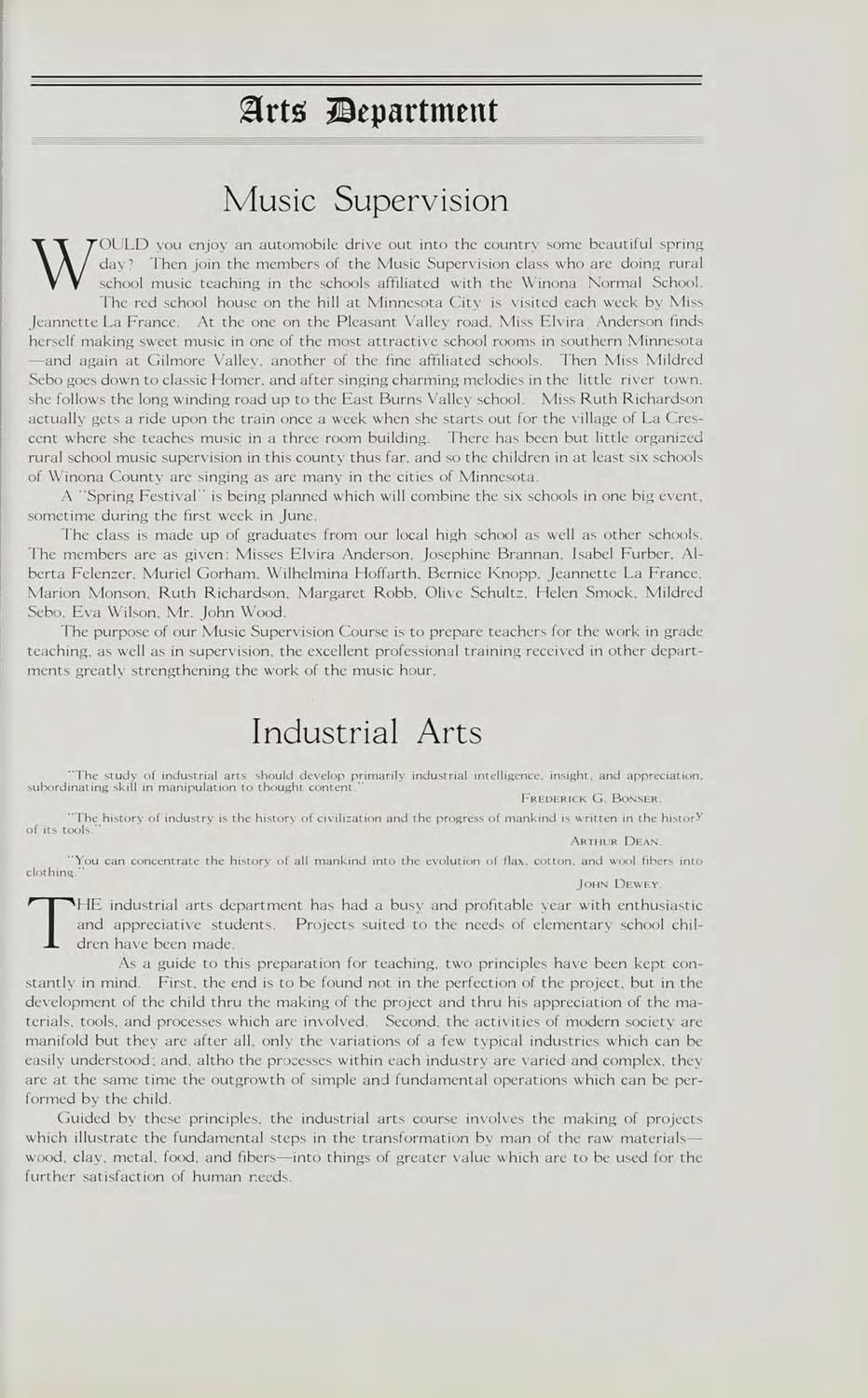 Frederick G. Bonser.
Frederick G. Bonser.
"The history of industry is the history of civilization and the progress of mankind is written in the historV of its tools.”
Arthur Dean.
"You can concentrate the history of all mankind into the evolution of flax, cotton, and wool fibers into clothing."
John Dewey.
THE industrial arts department has had a busy and profitable year with enthusiastic and appreciative students. Projects suited to the needs of elementary school children have been made.
As a guide to this preparation for teaching, two principles have been kept constantly in mind. First, the end is to be found not in the perfection of the project, but in the development of the child thru the making of the project and thru his appreciation of the materials, tools, and processes which are involved. Second, the activities of modern society are manifold but they are after all. only the variations of a few typical industries which can be easily understood; and. altho the processes within each industry are varied and complex, they are at the same time the outgrowth of simple and fundamental operations which can be performed by the child.
Guided by these principles, the industrial arts course involves the making of projects which illustrate the fundamental steps in the transformation by man of the raw' materials— wood, clay, metal, food, and fibers—into things of greater value w hich are to be used for the further satisfaction of human needs.
department
Fine Arts
THE Art Department stands for democratic, wholesome appreciation of what is worth while in life. This is due, in large measure, to Miss Bertha Speckman, who is a quiet and direct influence in the development of the department. Future growth depends upon our breadth of vision, our sincerity, and our keen enjoyment of common things.
Manual Training and Service
THAT the war has had its influence on the school shop is clearly evident in a number of ways.
War with a nation that is noted for its industrial efficiency, has afforded an unusual opportunity for service to the man who has a theoretical or practical knowledge of industrial processes and materials. No one factor alone will win the war, but surely no material factor can be of greater importance than a successful competition along the lines of science and industry. Thus many manual training men of proper age and qualifications have entered the service, the value of which we are not prepared to estimate.
This has necessitated the closing of many school shops which is unfortunate to say the least; for, if the value of shopwork in various lines has not been fully realized in the past, its necessity for the future welfare of those who are to take part efficiently in the reconstruction period cannot be denied. Just how to fill these vacancies remains to be solved. It is quite probable that the usual custom will be followed, and women will do the work in many cases as in other lines of work. Women students who like, or think they might like, shopwork should carefully consider the opportunities and advisability of specializing in this field.
Those teachers who are not privileged to go directly into the service are adapting their work so that the products may be of service. Articles for the Red Cross and various army cantonments are made in many places. These include knitting needles, yarn reels, packing cases, splints, crutches, games, puzzles, and various tables.
Our own Junior High Schoolmade three dozen game boards and sent them to Captain Dickerson at Camp Dodge last fall. According to his report, these articles are in constant use and much appreciated. They also made two large ironing boards for the students' Red Cross work.
The Normal department students made stage scenery and otherwise helped Mrs. Chorpenning at the opera house last fall. They also made three checker board tables at the request of the Bureau of Education, Washington, D. C., and sent them to Camp Pike, Ark. “The only really universal training which we can adopt after the war is a training for social service, because the only universal training is training for social service. —Dewey.
Household Arts
THE activities of the Household Arts department have been more numerous during this past year than ever before. The increased responsibilities, which proved so valuable to the community, were due to the teacher's determination to give the girls as broad an experience along these lines in war times as in times of peace, and to promote patriotism.

In the first place patriotism abounded early in the year when the teacher and students of cookery labored at working out substitutes for ingredients that were scarce and were needed in the serving of meals. In that way it was possible to continue that practice of serving without too much expense. Then too, in the serving classes they searched for substitutes of scarce or unreasonably priced textiles. Thus, by testing and experimenting, the needs were met before the government undertook to control the situation scientifically.
The later patriotism came to pass when the institution received three outlined courses on “Food Conservation" from Washington, D. C. In order that the students could get this subject matter Course I was given to the entire school thru a series of lectures, but Course II was added to the work in methods and Course 111 to the Cookery 111 class. In the meantime
the teachers and students gave public demonstrations on war breads and other economical, nutritious dishes.
The sewing classes also gave patriotism a boost by having an Economy Show on March seventeenth. They gave practical textile information in an original and interesting playette. Their spring costumes were becoming indeed, even to the Hoover aprons.
During the first of the year Mrs. Dillon and Miss Grover were in charge of the work while later Miss Folger and Miss Cooley took it up. It is unnecessary to say any more about their ability than this article has implied. The result is that the Household Arts course has come to be better understood and that it is due to the instructors who responded when "Opportunity" called.
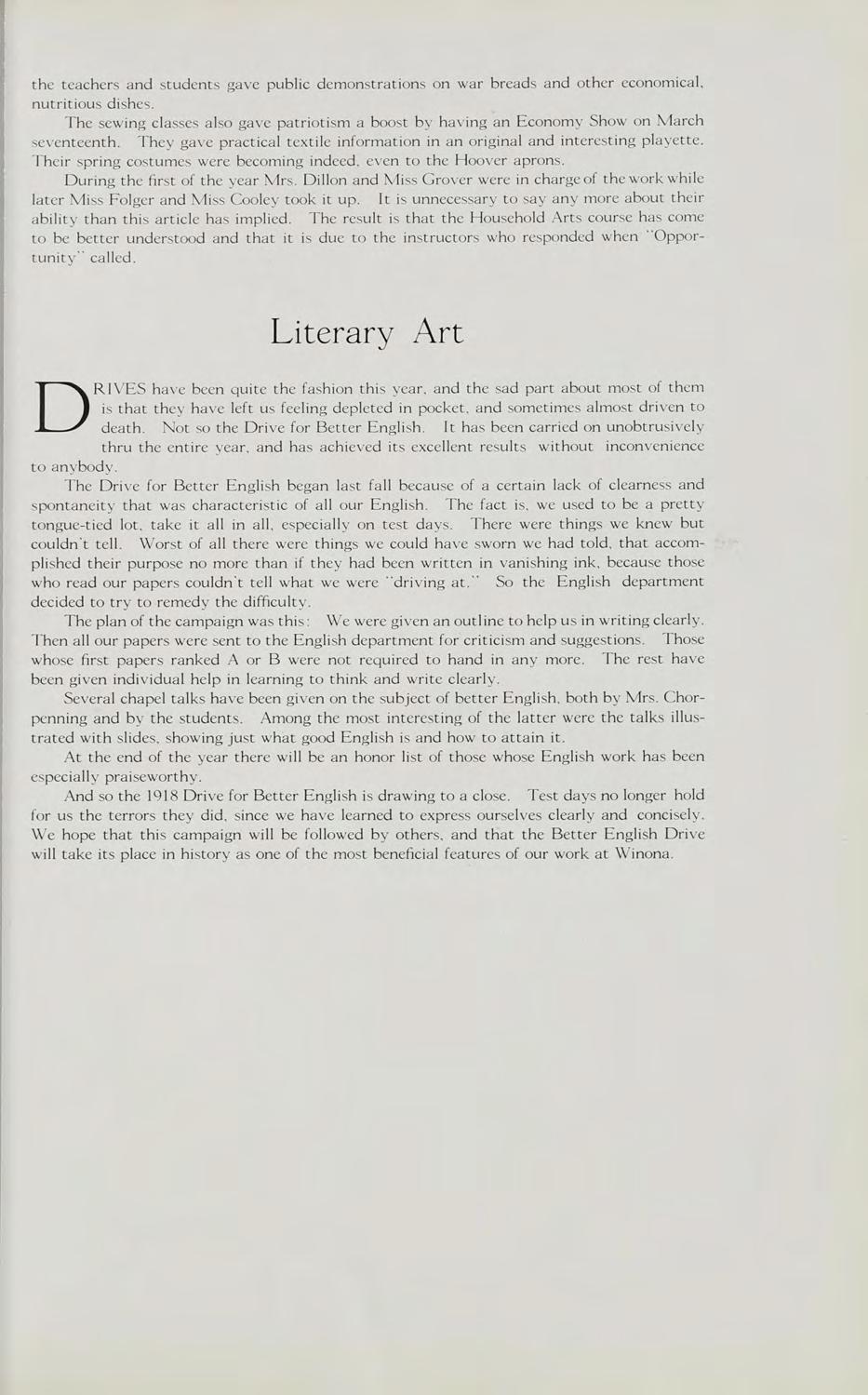
Literary Art
DRIVES have been quite the fashion this year, and the sad part about most of them is that they have left us feeling depleted in pocket, and sometimes almost driven to death. Not so the Drive for Better English. It has been carried on unobtrusively thru the entire year, and has achieved its excellent results without inconvenience to anybody.
The Drive forBetter English began last fall because of a certain lack of clearness and spontaneity that was characteristic of all our English. The fact is, we used to be a pretty tongue-tied lot, take it all in all, especially on test days. There were things we knew but couldn't tell. Worst of all there were things we could have sworn we had told, that accomplished their purpose no more than if they had been written in vanishing ink, because those who read our papers couldn't tell what we were "driving at.” So the English department decided to try to remedy the difficulty.
The plan of the campaign was this: We were given an outline to help us in writing clearly. Then all our papers were sent to the English department for criticism and suggestions. I hose whose first papers ranked A or B were not required to hand in any more. The rest have been given individual help in learning to think and write clearly.
Several chapel talks have been given on the subject of better English, both by Mrs. Chorpenning and by the students. Among the most interesting of the latter were the talks illustrated with slides, showing just what good English is and how to attain it.
At the end of the year there will be an honor list of those whose English work has been especially praiseworthy.
And so the 1918 Drive for Better English is drawing to a close. Test days no longer hold for us the terrors they did, since we have learned to express ourselves clearly and concisely. We hope that this campaign will be followed by others, and that the Better English Drive will take its place in history as one of the most beneficial features of our work at Winona.
framing ^cfjool department
The Junior High School
THE Training Department now consists of a well organized Elementary School and Junior High School. The Junior High School consists of the seventh, eighth, and ninth grades. These three grades have been entirely re-organized on a modern junior high school basis. Promotion is by subject, the subjects themselves are reorganized, and the administration is that of a high school rather than of a graded school.
GROWTH
The Junior High School grew out of the grammar grade department by adding a ninth grade and adopting, largely, the course of study used in the city schools. About half a dozen from the eighth grade were induced to remain for ninth grade work. This year we have eighteen doing ninth grade work, and a total of seventy-five in the junior high school.
PHYSICAL EDUCATION
Mr. T. O. Dillon, who came to us from the Colorado State Normal School where he had been in charge of the work in Physical Education, has done remarkable work with the junior high school boys and girls. The Elementary Basketball team won over the teams of the various ward schools, and then defeated a picked team from all the city schools. 1 hey did not lose a single game. The regular JuniorHigh School team defeated the Cotter school team and every other team of equal standing that it has played with. 1 hese boys have wonderful team work. The girls play volley ball and have done very good work too. There is a regular period every day for physical education and every one is required to take the work. This includes swimming one day each week. The work is partly corrective and aims for grace, posture, etc., and is partly recreational.
MANUAL TRAINING
Mr. Sandt of the regular Normal School faculty has direct charge of the work in Manual Training. It includes shop work, mechanical drawing, printing and book binding. We hope in the near future to add concrete work.
Physical Education in the Elementary School

PHYSICAL education in the normal training school was given a new impetus this year when a physical director was secured to have active charge of the work. Heretofore, this work had been done by two student assistants, one for the boys and another for the girls. Last fall Mr. Dillon, the new director, took up all the gymnasium, swimming, and play activities, and with the help of several student assistants, has carried out a very efficient program. Athletics, corrective exercises, and play have received most emphasis. Some of the inter-school contests and some phases of the regular work are worthy of notice.
Altho the normal relay team was forced to take third place last fall in the annual relay race of the seven elementary schools of Winona, the basketball quintet won the banner in the same league byfinishing the season without a single defeat. After completing the regu- lar schedule the undefeated team won a decided victory from an all-star team of players, picked from the various competing teams.
In the volley ball league of six elementary schools our girls team was tied for second honors with the Central girls, the Lincoln team having won first place. These basketball and volley ball contests were played on Friday afternoons at four o clock in the normal school gymnasium.
The boys of the normal junior high school in a series of basketball games with the Cotter and public junior high schools of Winona also won first honors. These contests were played off as curtain raisers for the home games on the schedule of the normal school varsity.
An interscholastic track and field meet is being planned for this spring in addition to the regular indoor baseball league games and the annual May Day fete. To offset the evil effects of specialized competition for the few. numerous color teams have been organized for both girls' and boys' gymnasium classes. Pupils are grouped for such teams according to their size and ability as well as their age and grade. Popular contests include those in basketball, volley ball, indoor baseball, soccer, swimming, jumping, relay racing, and distance throwing with balls and weights. All competition is between organized teams and records of standings are kept posted so that all may learn the comparative merits of the various teams in the color league. Such competition has this year netted results in the nature of fair play and better all around development for the greatest number.
The Spirit of Our Garden Class
THE universal cry of today is "Help Win the War." We have been called upon in various ways to assist in this great struggle and have contributed to the Red Cross, and bought Thrift Stamps and Liberty Bonds.
We, as students, cannot do a great deal financially, but can you imagine our joy when we learned that the government had requested us to plant a war garden. Mr. Holzinger and we gathered at the nation’s call for war gardeners and were determined to do our 'bit."

We are going to don our old dresses, shoes, hats and coats and march to the garden grounds with hoes and spades on our shoulders. But before we can use these weapons of war, we are going to have a "Clearance Sale" of all the last year’s hardware. Lake Winona is to be our chief purchaser.
As we stand with our foot on the spade looking toward the east, we view the beautiful bluff, "Sugar Loaf," which recalls the many trials and hardships endured in the past. We are spurred on to work with might and main, when we think of the Blonde Beast across the water and his horrible atrocities.
Should you visit our garden this summer, you will see splendid beds of carrots, radishes, onions, lettuce, cabbage, and many other vegetables.
ikbool ^cttottiesi
Muriel Gorham. Emma Kreidemacher. Esther Murphy, Lola Kelly Lillian Ferris Grace Lee Tilla Aske Eleanor Parks. Frances Yoeny, Edith Erickson, Barbara Armstrong, Emma Vater Florence Elson, Mary Fits Gerald, Nellie Jessup, Elsa Vater
which will be cared for by the Domestic Science girls in the fall. But we must not forget our staple food—the Potato, who will watch us in our war clothes, with his keen sight and smiling countenance and say, "Plant as many of my brothers and sisters as you can and go teach the people the many ways in which I can be used. Now cover me over, that I may fall asleep, and dream of how I helped make the world safe for democracy."
T. A.
Clubs
LAST fall when we assembled for our year’s work it was felt that a new system of clubs was in order. Various plans were suggested, a few of which were worked out and voted upon.
The plan we adopted has proved very satisfactory. Each group of people especially interested in some line of work has formed a club with one faculty member as advisor.
The result is that every Friday afternoon at four o'clock each student, burning with enthusiasm, hurries to a club room to discuss some current question, read some worth-while book, or work on some interesting problem.
The best consequence of these clubs is that we are afforded an opportunity to become better acquainted with each other and with the exciting happenings of this wonder-world of ours.
The Modern Literature Club
OUR club, known by the name of "Modern Literature Club," has as its purpose the reading and discussing of modern writings in the forms of plays, poems, essays, and fiction, written by popular authors. Of course at present the literature relates for the most part to the war. With Mrs. Chorpenning as our advisor, we have studied Rupert Brookes' "Poems and Letters," Allan Seegar’s "Poems and Letters," collections of war poems by different authors, and "Under Fire."
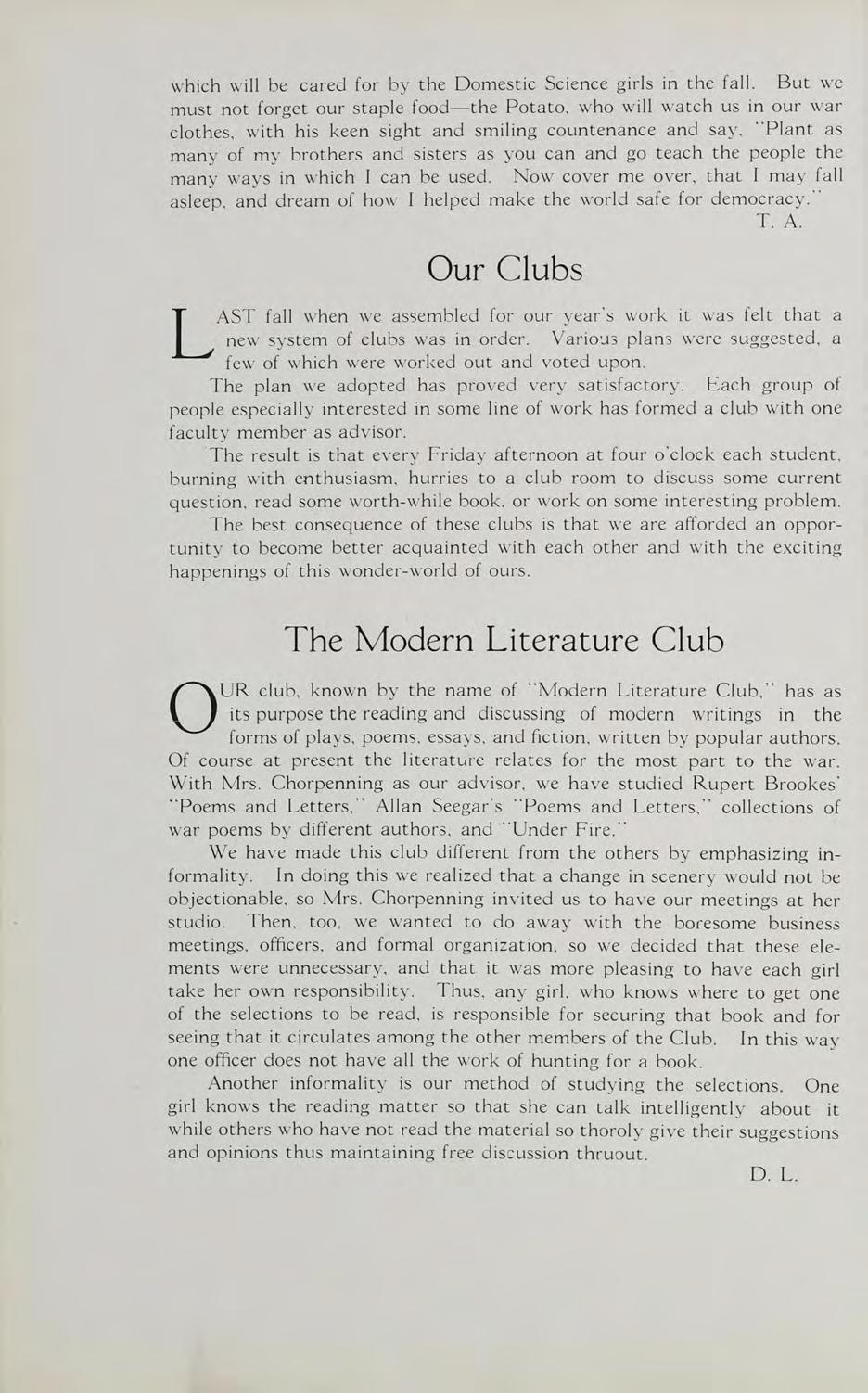
We have made this club different from the others by emphasizing informality. In doing this we realized that a change in scenery would not be objectionable, so Mrs. Chorpenning invited us to have our meetings at her studio. Then, too, we wanted to do away with the boresome business meetings, officers, and formal organization, so we decided that these elements were unnecessary, and that it was more pleasing to have each girl take her own responsibility. Thus, any girl, who knows where to get one of the selections to be read, is responsible for securing that book and for seeing that it circulates among the other members of the Club. In this way one officer does not have all the work of hunting for a book.
Another informality is our method of studying the selections. One girl knows the reading matter so that she can talk intelligently about it while others who have not read the material so thoroly give their suggestions and opinions thus maintaining free discussion thruout.
D. L.
The Four Circle
THIS organization grew out of a strongly felt need to learn more of current literature. It was suggested by some of the girls in a critic meeting one afternoon that our group form a club to study some of the new war poets and other topics of special interest to us. We were working with Miss Hubbard at this time, so we considered her a sort of Mother of our Club, for it was she who first opened our eyes to the fact that we knew little present day literature.
A great deal of discussion as to what the name of the organization should be came up. There were four things which we all decided were very important to strive for in this group and also in later life. So we decided to use the word “Four" as part of our name. At all our meetings, we drew our chairs around in a large circle; from this we decided that the word “Circle" would be more fitting than “Club." From the name we worked out our insignia with the twenty-two jewels in the 4 representing the twenty-two charter members.
The meetings have all been helpful. We took up the trio, Chesterton, Wells, and Shaw, first of all. Those whohad read any works of these men reported upon them and an interesting discussion came about. At another meeting we studied the poems and life of Rupert Brookes; at another Alan Seegar’s “Letters and Diary"; at another Robert Service's war poems. At one meeting, a member reported upon and read parts of Hamlin Garland’s “Son of the Middle Border" which is full of local color. At another meeting we studied lullabies, the essence of which showed how the characteristics of different people are determined by geographical environment. Our last meeting was a “children's party." We forgot school long enough to act our parts, to sit in a large circle on the floor and eat popcorn. At this meeting we each contributed something from one of these poets: Lucy Larcom, Celia Thaxter, Jean Ingelow, Phoebe Cary, Alice Cary, and Christine Rosetti.
The pleasure of being a member of the “Four Circle does not end with graduation. We hope and feel that the new members will do even more next year because of the start which we have enjoyed giving the “Four Circle." L. L.
The Dramatic Club
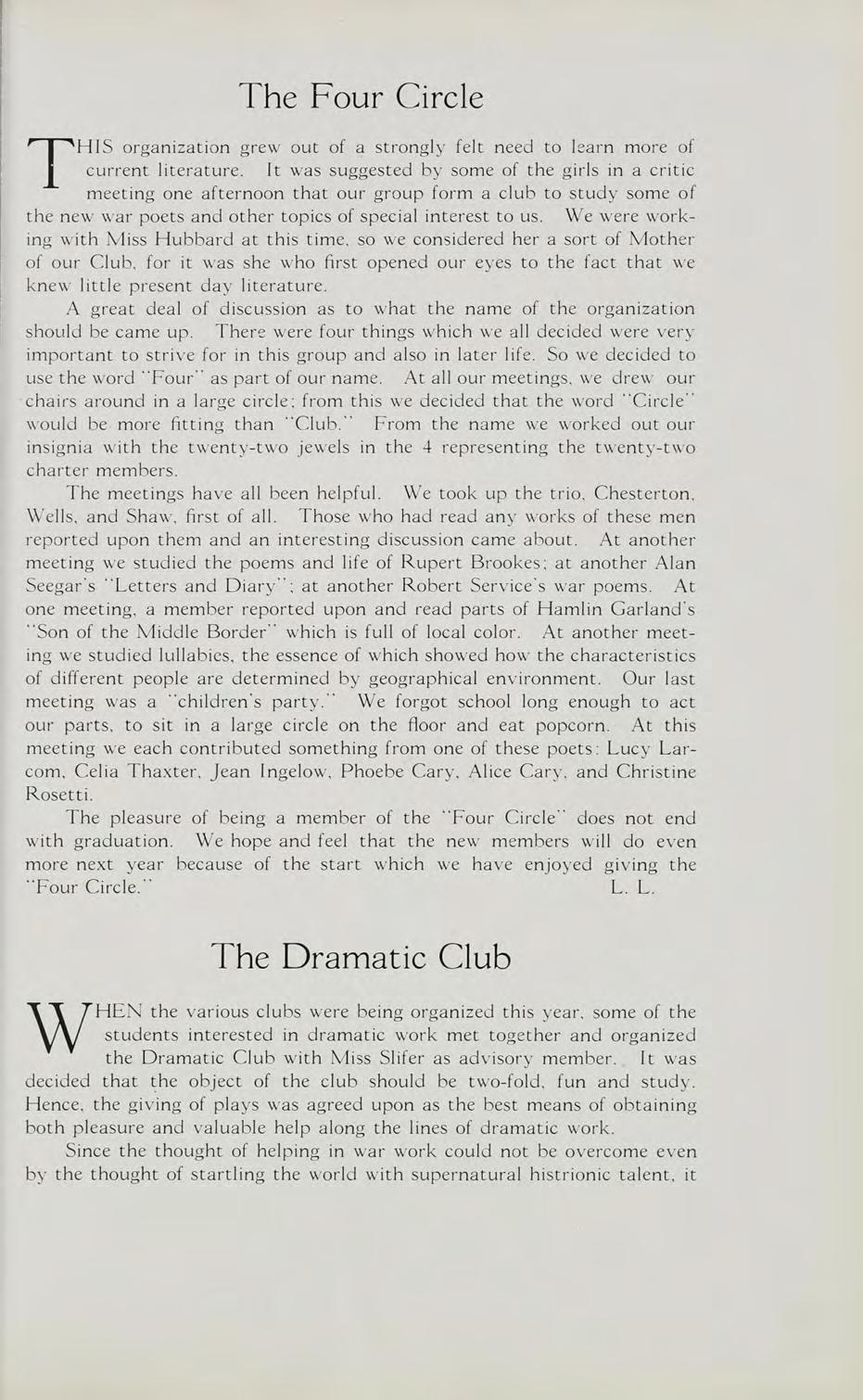
WHEN the various clubs were being organized this year, some of the students interested in dramatic work met together and organized the Dramatic Club with Miss Slifer as advisory member. It was decided that the object of the club should be two-fold, fun and study. Hence, the giving of plays was agreed upon as the best means of obtaining both pleasure and valuable help along the lines of dramatic work.
Since the thought of helping in war work could not be overcome even by the thought of startling the world with supernatural histrionic talent, it
was suggested that we charge an admission to our presentations in the “Little Theatre” and use the proceeds for some patriotic purpose. Needless to say, the suggestion was eagerly accepted.
A committee was then appointed to select tw'o or three plays of different types and cast thecharacters. Three one-act plays were chosen: “Gringoire,” a story of a French poet and King Louis XI; “Mrs. Mulcahy," a comedy, and “Holly Tree Inn,” a drama woven from Dickens's story of that name. By choosing three short plays the committee was able to put everybody at work immediately. Each play was coached by a member of the club, Miss Slifer giving suggestions and criticisms.
Saturday evening, April the sixth, was Dramatic Club night, when the three plays were given in “The Little Theatre.” The admission was fifteen cents, and about forty dollars was netted. This amount w as given toward the payment of a Liberty Loan Bond.
So besides accomplishing its primary purpose in providing a little recreation and enabling the members to learn considerable more about stagecraft than they knew before, the club has also found it possible to do a little for Uncle Sam.
G. A.
Gegowdenn Gelubde
IN the days when history was being made so fast, we, as a school, felt that we could ill afford not to be informed on present day happenings.
It was suggested that this end could be met in clubs, and, so, when the call came, a number of us banded together and became known as the “Gegowdenn Gelubde.”
Our aim has been two fold: to familiarize ourselves with current happenings, and to become better acquainted with each other.
In our meetings, we have followed proceedings on the European battlefronts, learned more about our present day leaders and problems, and became acquainted with a little of our current literature.
But, that is not all. Intermingled with our literary work has been the opportunity for merriment and comradeship.
We hope that our work will “carry on" and that it may be as pleasurable and profitable to our future members as it has been to us.
R. M.
The Astronomical Club
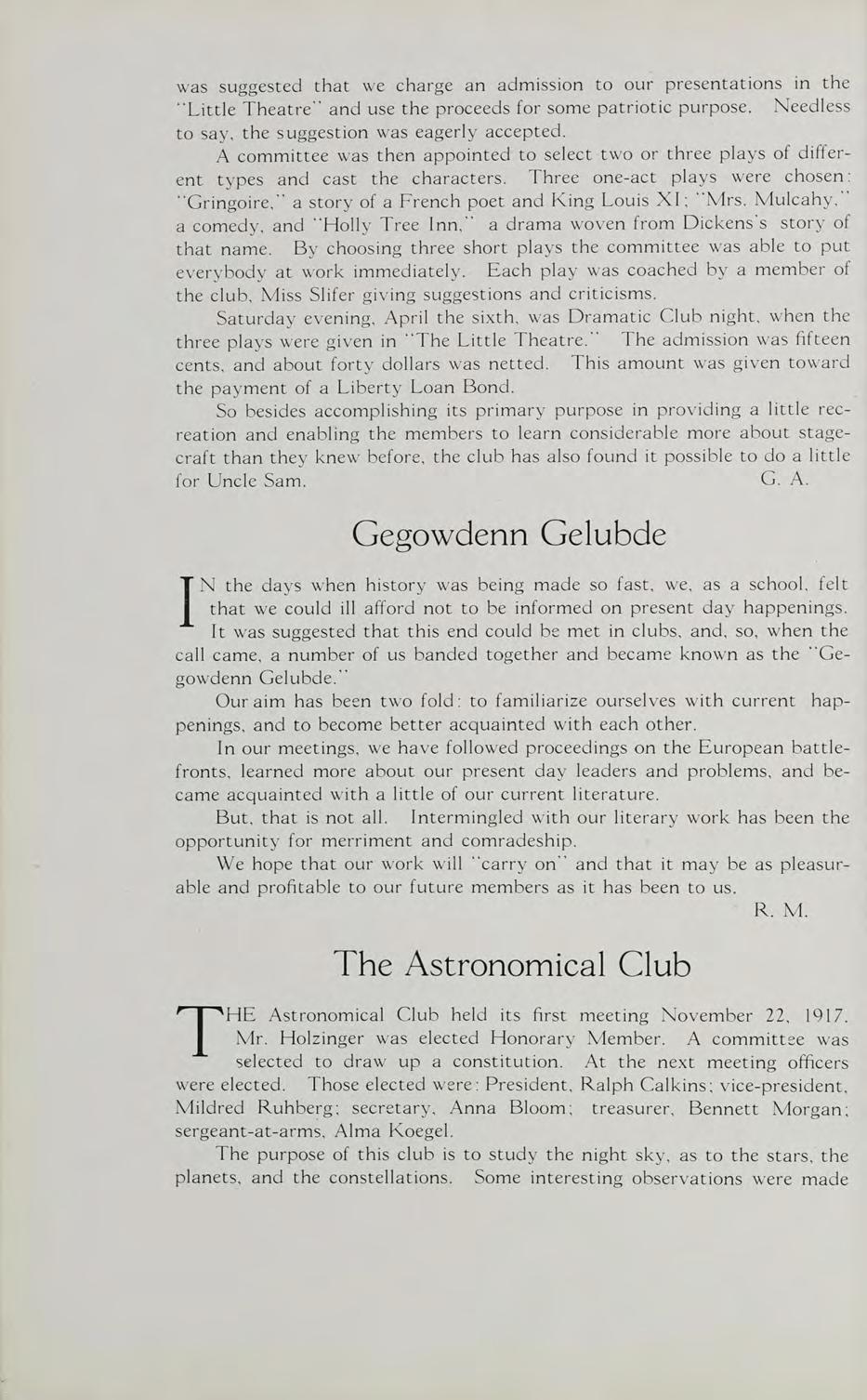
THE Astronomical Club held its first meeting November 22, 1917. Mr. Holzinger was elected Honorary Member. A committee was selected to draw up a constitution. At the next meeting officers were elected. Those elected were: President, Ralph Calkins; vice-president, Mildred Ruhberg; secretary, Anna Bloom; treasurer, Bennett Morgan; sergeant-at-arms, Alma Koegel.
The purpose of this club is to study the night sky, as to the stars, the planets, and the constellations. Some interesting observations were made
during the fall term but on account of the severe weather during the winter term, the meetings were discontinued. The club intends to hold its observations during the spring term with the Elementary Science class.
A. B.
The Mars Club
LAST November a group of students, together with Mr. Reed, as faculty advisor, organized the Mars Club. The name itself signifies the plan and purpose of the club, namely, the study of the activities of the present Great War. The plan of organization adopted by the Martians is military. The officers are: Captain, Rae Whittom; first lieutenant, Joyce Batson; correspondent, Marie Danielson; and seargents, Marion Rockwell and Adelia Hanson.
Activities, both educational and social, have been carried on. The opening meeting was in the form of a lecture to which the other clubs of the school were invited. Miss Maud Hayes of the Moorhead State Normal School spoke on "Sidelights on the War in England." During January an interesting meeting was held at which Mr. A. V. Gardner gave a detailed account of the events connected with the recent St. Paul strike.Other meetings consisted of lively discussions of war events. The social element of the club meetings was manifested in the informal party, and the delightfully successful sleighride held during the term.
Every Martian, after having gone thru the solemn initiatory rites and having heard the mysterious "B - o- o-m, b-o-o - m" feels proud to uphold the principle of the Mars Club, "Loyalty to our club, our school, and our country.”
A. H.
The Agora
DO you know what Agora means? If you look it up in a classical dietionary you will find it means "Council." But if you ask the meaning of the word here at the Winona Normal School, you will find it to be the name of a live and interesting current events club.
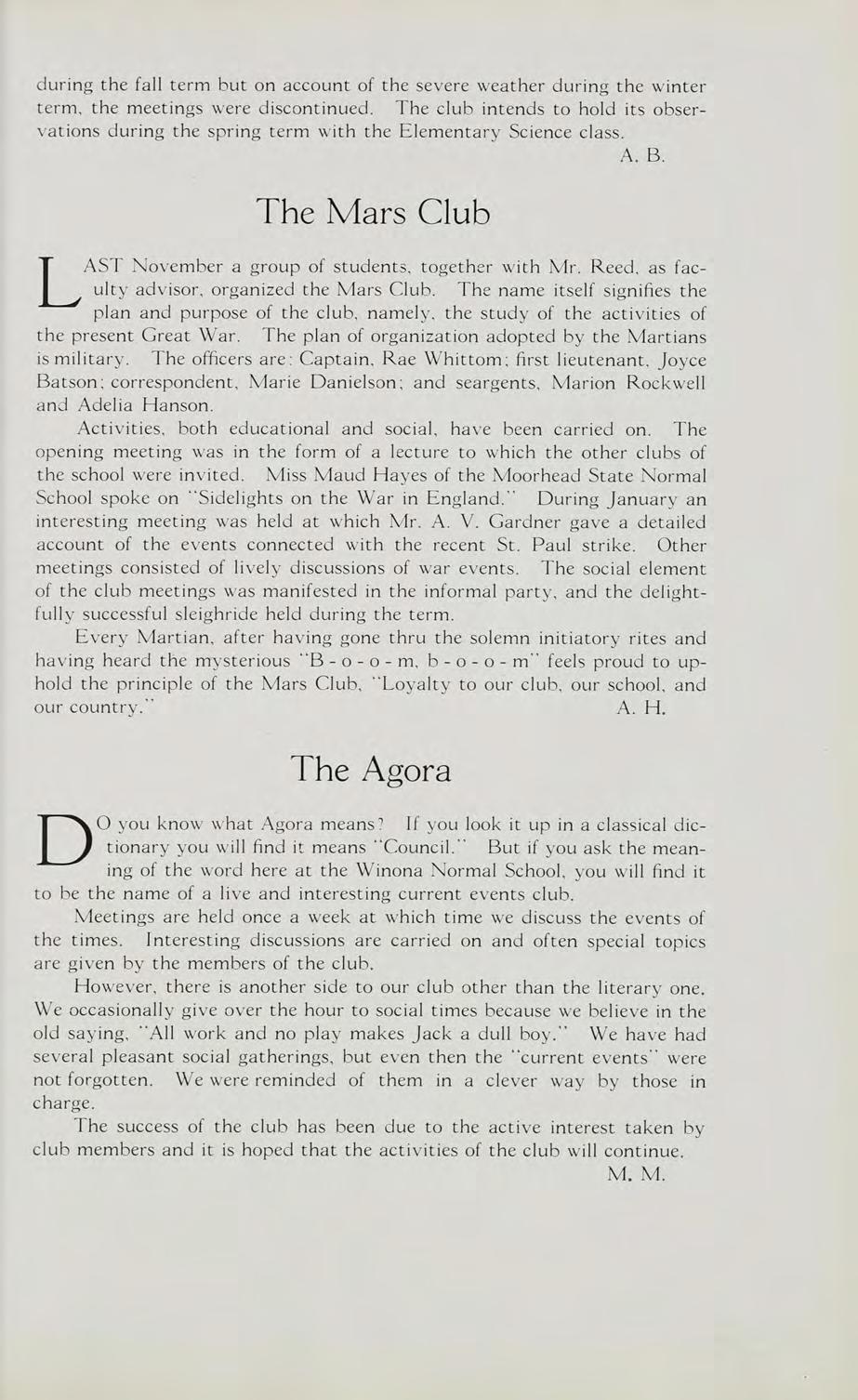
Meetings are held once a week at which time we discuss the events of the times. Interesting discussions are carried on and often special topics are given by the members of the club.
However, there is another side to our club other than the literary one. We occasionally give over the hour to social times because we believe in the old saying, "All work and no play makes Jack a dull boy." We have had several pleasant social gatherings, but even thenthe "current events" were not forgotten. We were reminded of them in a clever way by those in charge.
The success of the club has been due to the active interest taken by club members and it is hoped that the activities of the club will continue.
M. M.
Talks
LAST year we all went gaily down to the Opera House to hear the numhers on the Lecture Course and while we enjoyed every number very much we think that we have as truly enjoyed our informal lecture course, the numbers of which were staged in the Assembly Room. I shall merely hint at a few of the most interesting people whose programs we had the privilege of hearing.
Mr. Reed
Early last fall Mr. Reed gave us a most illuminating talk on New York City. We were astounded at some of the things he told us in regard to the size of the buildings, and the cost of regulating and keeping up the concerns. As it was dark (because slides were being shown in connection with the talk to further illumine our ideas of New York) our attempts at appreciation of what he was saying were lost. We all enjoyed a valuable hour and a half and intend to go to New York at our earliest convenience.
Mr. Trippe
On October twenty-ninth Miss Slifer cleverly introduced the man of the evening, Mr. Trippe. As usual every one was present to hear his interpretation of Shakespeare’s “Taming of the Shrew." We were not disappointed either for all of us just lived the play and some of us, 1 imagine, kept shifting from being Kate to being the Duke or some other character but finally we remembered that we were only Normal School students, for Mr. Trippe was graciously smiling on us as he finished, just as Kate must have when her trials were over.
Miss Maud Hayes
The Mars Club of this school secured Miss Hayes of the Moorhead Normal School to lecture for us one evening. For an hour and a half Miss Hayes told us of the experiences she had while she was in England over a year ago. We could have listened for a much longer time than we did to this entertaining person who told us of air raids, Y. M. C. A.'s, hostess houses and convalescent soldiers. We shall remember the talk.

Father De Ville
One morning in Chapel Father De Ville told us about the poor struggling Belgians of whom we can never hear too much. He has been with them, worked with them, and prayed with them and so could tell us about them in a manner that impressed us as no written material could. Father De Ville came with a message that will always remain with us.
Lieutenant Perigord
Words cannot express the admiration and the respect we have for Lieutenant Perigord. I am sure that not a single person will ever forget that military figure as he stood before us relating his experiences in the trenches, in the French village, in the hospitals and in Paris. We feel that the government of our country chose wisely when it chose this man to speak to the American people in regards to the affairs abroad.
And the Rest I could go on and on, describing other lectures and talks but the space confines me to merely say that the faculty talks which were given this year were instructive and inspirational. The food conservation talks which have been the main part of many chapel exercises have been educational and at the same time have brought home the stern reality of the war.
On surveying our numbers 1 can say that we have had a truly refreshing and enlightening year.
"Messiah"
THE Oratorio “Messiah by Handel was given by the St. Cecilia Society assisted by the Mendelssohn Club and a Male Chorus on February seventeenth (1918). This presentation of the famous Oratorio was one of the greatest musical events of the year. The following program was given:

SOLOISTS
Miss OliveSchultz
Miss Dorothv Sherwood
TEXT OF THE MESSIAH
Recitative, Tenor—Comfort ye, comfort ye my people.
Air—Every valley shall be exalted.
Chorus—And the glory of the Lord.
Recitative, Bass—Thus saith the Lord of Hosts.
Air—But who may abidethe day of His coming?
Recitative, Contralto—Behold, a virgin shall conceive.
Air and Chorus—O thou that tellest good tidings to Zion.
Recitative, Bass—For, behold, darkness shall cover the earth.
Air—The people that walked in darkness.
Chorus—For unto usa Child is born.
Pastoral Symphony:
Recitative, Soprano—There were shepherds.
Recitative, Soprano—And lo! the angel of the Lord came upon them.
Recitative, Soprano—And the angel said unto them.
Recitative, Soprano—And suddenly there was with the angel.
Chorus—Glory to God in the highest.
Air, Soprano—Rejoice, greatly.
Recitative, Contralto—Then shall the eyes of the blind be opened.
Air—He shall feed His flocklike a shepherd.
Air, Soprano—Come unto Him.
Part II.
Chorus—Behold the Lamb of God.
Air, Contralto—He was despised.
Chorus—Surely He hath borne our griefs.
Chorus—All we, like, sheep, have gone astray.
Recitative, Tenor—Thy rebuke hath broken His heart.
Air—Behold and see.
Chorus—Lift up your heads, O ye gates.
Air, Bass—Why do the nations so furiously rage together.
Hallelujah Chorus—Hallelujah!
Soprano Mr. John Wood
.Contralto Mr. Llerman Fakler Tenor Baritone
Recitals
NE of the most delightful musical events of the year was a pianoforte recital given by Miss Alvina Boley, music supervisor in the training school. The program consisted of modern compositions which were interpreted by Miss Boley in a very pleasing manner.
Another musical event much appreciated was a pianoforte recital given by Miss Brannan, who interpreted some exquisite drawings of the art department, by means of several of Beethoven Sonatas.
"Our Movies”
AS a result of a series of experiments carried on last year in the Model Building, the value of school movies was brought out clearly, and it was decided to install a machine in the assembly room. So when we returned from our holiday vacation we found a couple of holes in the rear wall of the assembly room and upon further investigation found a little booth in the rear hall. This discovery led to many questions and theories as to the object of the booth. Probably the best answer was this:
‘‘Oh, that is Prexy’s new office. He has been losing a lot of time lately trying to keep the assembly room quiet, so he has built that office up there from where he can watch the assembly room while he works.”
However, we soon found the real object of the above, namely, that of a moving picture booth. A standard moving picture machine was installed and as we already had an operator in the person of Mr. Sandt we were soon treated to the pleasure of school movies.

The primary object of this machine is that of education. The pictures are to supplement the lectures we are in the habit of hearing in the assembly room. This it does very nicely. Many things which it would be difficult to explain clearly are readily grasped when we see pictures, especially moving pictures.
Altho the machine will be used primarily for educational films it has been whispered that pictures for the purpose of amusement will also be run. We therefore gladly welcome this addition to our school equipment.
THIS Annual would not be complete without a reference to our ex-class president, Harold Olsen. Ole left during the early part of February to take up work at Carleton College; latest reports from that institution indicate that he is living up to the reputation he established at Normal. Besides being class president, Ole was an “A” student, took a prominent part in athletics, and was above all a good fellow and friend. Altho he does not graduate with our class, we will always feel that he is one of us, and wish him the best of luck in his new work.
The Faculty Reception
PICTURE the faculty all gracious and smiling. Then see a long line of “us —Juniors scared but determined to “go thru and Seniors confidently assuring them that it's really very simple. I he keyword is “mix." Now, add to this picture a few more details—Morey Hall, Septemher fourteenth—You've guessed right—it’s the annual Faculty Reception.
"Gym" Party
ONE of our first social events this year was a “Get-Together" party given for the benefit of the entire school, that each one might meet everyone else. Each Senior girl was Big Sister to a Junior escorting her to the party and helping her to have an enjoyable time. We had planned to go over to the bluffs for supper but to accommodate the weather man we went to the gymnasium instead. Here we ate our lunch, played games, took part in contests and got acquainted.
The Hallowe'en Party
VERY early in our Junior year we, the present Senior class, developed a fondness for parties. We never missed the opportunity of being entertained when the opportunity presented itself.' We also entertained the school now and then as well as ourselves.
In September when we “were Seniors grown," we decided to give a party for the entire school. We chose the “Injun Summer time" and on Hallowe'en eve we met in the new “gym."
Such fun! We all managed to get thru the dismal tunnel which was filled with all sorts of creepy things. Some of us encountered real ghosts. We played games, dived for apples, and indulged in other activities that fitted the occasion. Truly we all had a good time and from that evening on we decided to share our delight in social activities with our Junior Sisters, who have since responded most heartily on such occasions.
The Patriotic Party
SKIN—NAY! Come—on—over to the new gymnasium this Saturday night at eight o’clock. All of our families are going to be there. Don’t bother with dressing up, but wear whatever you happen to have in your 1967 wardrobe,—or try camouflage. Father said he remembers when he “shot baskets there in 1917. Park your aereofrisker in the Cam-
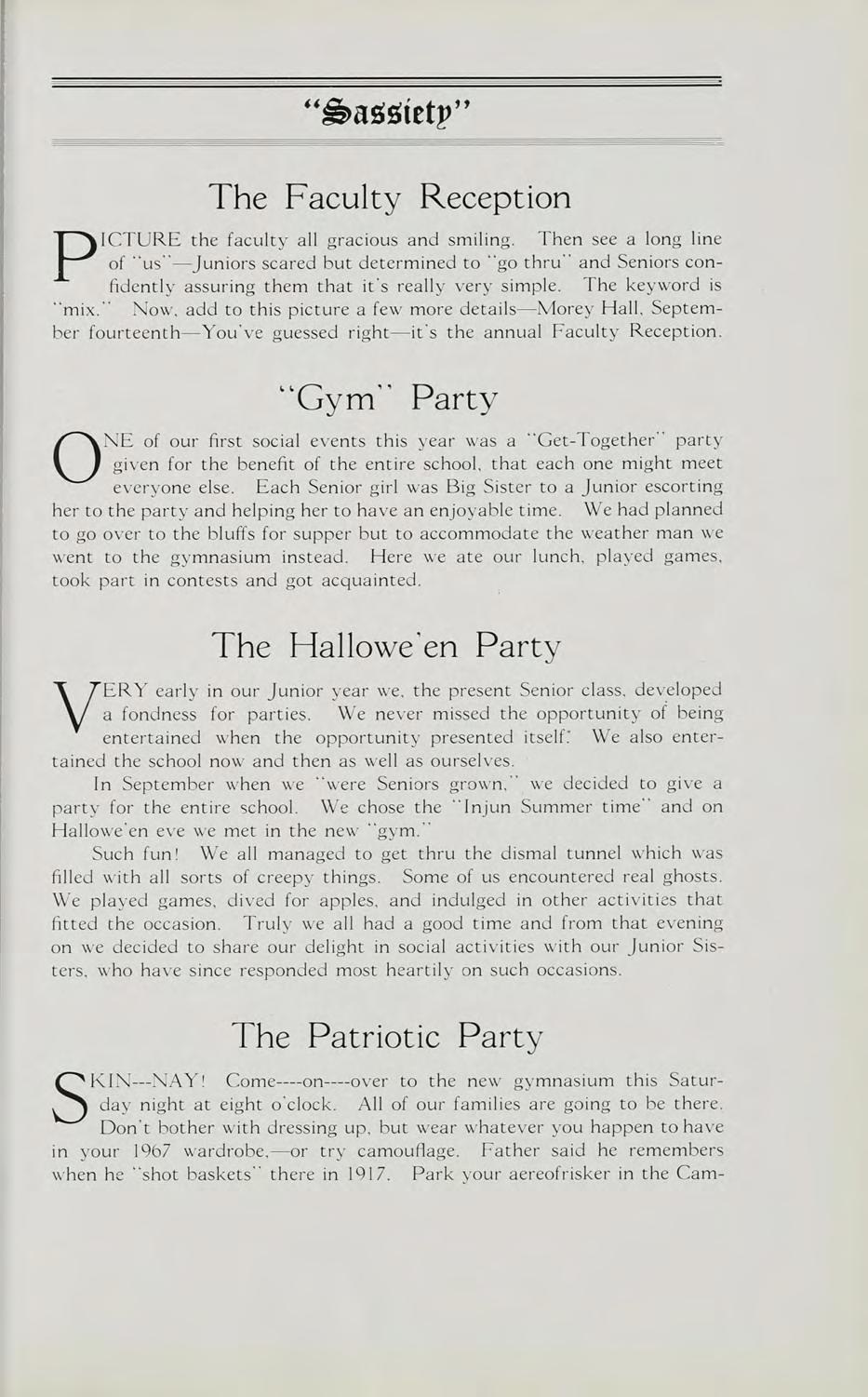
“^assietp”
pagna. Reserve you place in the stadium by signing your cognomen on a fragment of parchment, and spearing the same on "the spindle" by I hursday night.
"Run like everything and everything.'
Nov. 20, 1967.
We did ‘‘run like everything" and not one of us would have missed the cleverest patriotic party that the school has ever given. Grandmother’s stories of "back in 1917" were illustrated in a way that made us think even as we laughed.
The Country Life Club Party
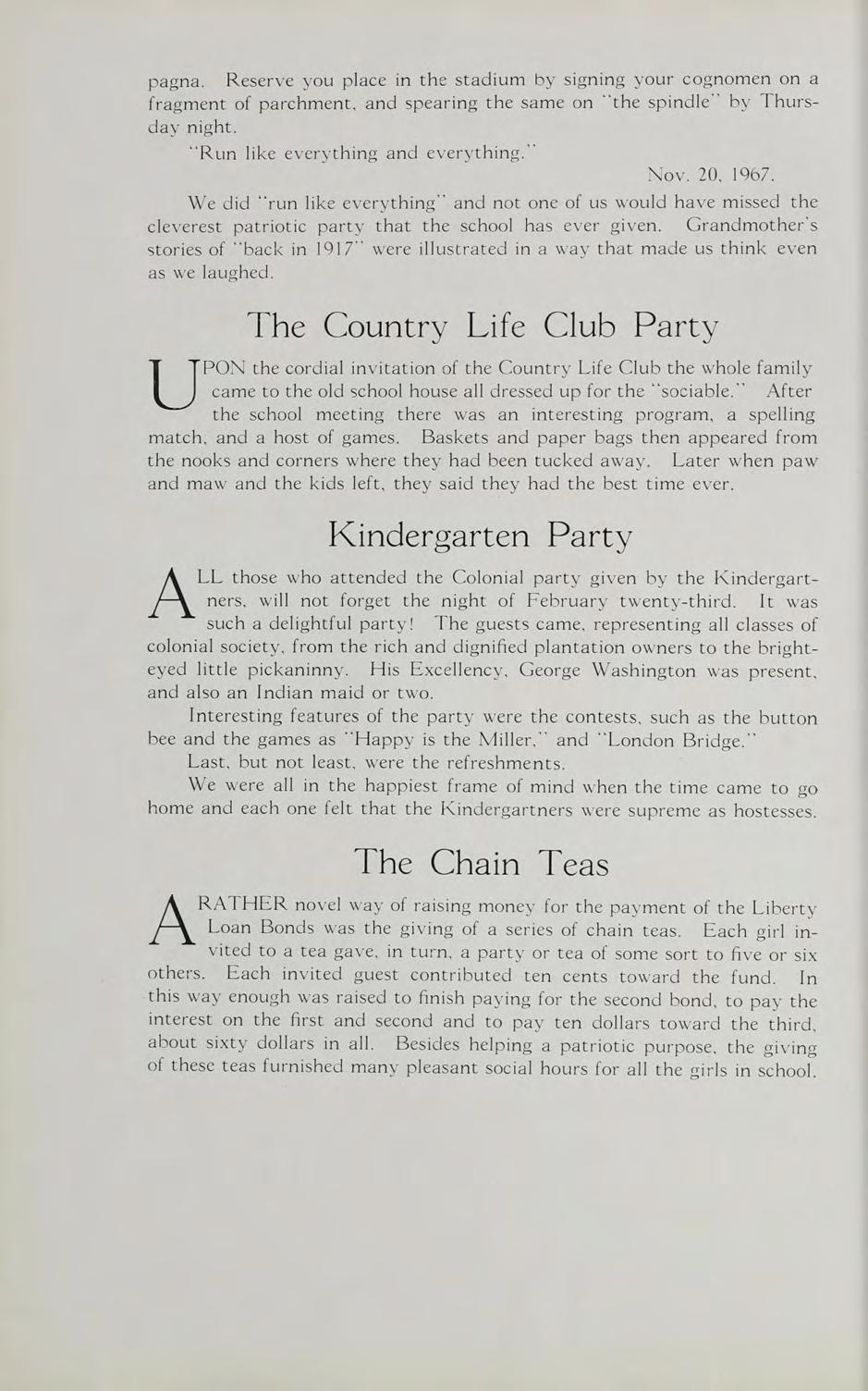
UPON the cordial invitation of the Country Life Club the whole family came to the old school house all dressed up for the "sociable." After the school meeting there was an interesting program, a spelling match, and a host of games. Baskets and paper bags then appeared from the nooksand corners where they had been tucked away. Later when paw and maw and the kids left, they said they had the best time ever.
Kindergarten Party
ALL those who attended the Colonial party given by the Kindergartners, will not forget the night of February twenty-third. It was such a delightful party! The guests came, representing all classes of colonial society, from the rich and dignified plantation owners to the brighteyed little pickaninny. His Excellency, George Washington was present, and also an Indian maid or two.
Interesting features of the party were the contests, such as the button bee and the games as "Happy is the Miller," and "London Bridge.”
Last, but not least, were the refreshments.
We were all in the happiest frame of mind when the time came to go home and each one felt that the Kindergartners were supreme as hostesses.
The Chain Teas
RATHER novel way of raising money for the payment of the Liberty Loan Bonds was the giving of a series of chain teas. Each girl invited to a tea gave, in turn, a party or tea of some sort to five or six others. Each invited guest contributed ten cents toward the fund. In this way enough was raised to finish paying for the second bond, to pay the interest on the first and second and to pay ten dollars toward the third, about sixty dollars in all. Besides helping a patriotic purpose, the giving of these teas furnished many pleasant social hours for all the girls in school.
Garvin Heights

NE of the most prominent and accessible of the bluffs south of Winona, which rises directly above Lake Winona and overlooks the city, was made available for the use of the members of the Winona Normal School in the spring of 1918 thru the beneficence of Mr. Herbert C. Garvin, a resident business man of Winona. The land consists of about eight acres covering the top of the bluff often called Inspiration Point. The hill-top is reached by crossing the Huff Street Bridge and walking up the Quarry road as far as to the shoulder of the bluff. From this point a path, made of concrete or earth steps, leads up past occasional birch and oak trees and convenient resting places, to the brow of the hill.
Phis bluff is, from the points of view of scenery and contour, the most desirable along the valley. There is in the midst of a circle of fine oak trees, a natural amphitheatre, which the dramatic clubs may use from time to time for the production of plays. The descent to the right is almost sheer into a little valley; on the other side, the slope is steep, and grassy or wooded, to the beautiful Woodlawn Cemetery; and on the front, the descent is abrupt to the shining waters of Lake Winona, five hundred feet below.
The views from the path, as one walks up to the height, are among the most beautiful to be seen anywhere; but the view from the point of the bluff is most magnificent. The eye beholds a panorama, including the numberless bold bluffs that face the river, picturesque Trempealeau mountain in the distance, the city lying below, the Wisconsin hills receding in undulating lines, many miles of the broad Mississippi river, and, on a clear day, the waters of Lake Pepin gleaming between the hills fully forty miles in the distance.
T his delightful recreational park, which the members ofthe school have named Garvin Heights, is visible against the sky from the south windows of all the Normal School buildings, is fifteen or twenty minutes’ walk away, and is an ideal place for “hikes,' sight-seeing, nature study, picnics, out of door “spreads,” and camp fires.
Class Play
THE fact that this year’s class is a "War Class" is reflected most strongly in the class play. It has been the custom of the school in other years to put on rather an elaborate class play, requiring a large cast, and consequently quite expensive to stage; the primary object not being to make money but to afford a large number of students the opportunity to take part in dramatics.

A different policy was decided upon this year, namely, that of giving a modern play requiring only a small cast. This would interfere very little with the Red Cross work which the girls have been carrying on, and would also increase the proceeds, which are to be donated to the Red Cross, by reducing the bill for costumes. By thus staging a play we are trying to do our biggest "bit" to help win the war.
The play chosen was G. E. Mason’s "Green Stockings,’’ a modern comedy in three acts. The action takes place at the home of William Faraday, a wealthy old Englishman with whom live his four daughters; Phyllis, engaged; Madge and Evelyn, both married; and Celia, the eldest of the sisters unmarried. Celia has been forced to wear green stockings twice, because ofthe old English custom which requires an unmarried woman to wear green stockings at the wedding of a younger sister. In order to escape the bantering which she is receiving at the prospect of wearing them a third time, she makes believe she is engaged to a Colonel Smith, and is obliged to carry on an imaginary correspondence with this Colonel Smith in order to carry out her bluff. By accident one of her letters is mailed and falls into the hands of a real Colonel Smith. Smith visits Celia’s and the result is that Celia will never again be forced to wear green stockings.
The cast follows:
Admiral Grice
William Faraday
Colonel Smith
Robert Larver
Henry Steele
James Raleigh
Martin
Celia
Madge
Evelyn
Phyllis
Mrs. Chrisholm Faraday
Herbert Edd
Earl Baker
Alvin Sheehan
Robert Stevens
Ray Stahmann
Ralph Calkins
Arthur Sebo
Pauline Lemme
Ruth Boley
Regina Brotherton
..Fannie Neuman
Cora Palm
THE Thanksgiving class was unusually large this year, twenty graduates receiving diplomas. The graduation exercises were held in the elementary school gymnasium on the evening of November twentyseventh. A musical program was given by the St. Cecilia and Mendelssohn Clubs under the direction of Miss Smith. The entire program was made up of American music,—music of Indian themes, of Negro themes, music by modern composers, and music of the camps of 1917. Besides the chorus songs, were solos by the Misses Marion Monson, and Dorothy Sherwood, and piano selections by the Misses Alberta Felenzer, Josephine Brannan. Dorothy Coe and Jeanette La France. At the close of the musical, Director S. H. Somsen presented the diplomas.
The second commencement program this year was held at the end of the winter term, when three young women were graduated. The exercises were held on the evening of March seventh in the assembly hall. Miss Slifer, assisted by Mr. Fakler, gave a patriotic recital. Miss Slifer’s part of the program consisted of patriotic readings, all but one of which were chosen from the recent war literature. The first three readings were from the “Rhymes of a Red Cross Man." Another selection was “The Beloved Captain," from “A Student in Arms." Still another was “The Firing Squad" from “Over the Top." Miss Slifer closed the recital with“The Last Class," a story of the last class in French in an Alsatian school when the order was given that only German should be taught. Mr. Fakler sang two songs during the program, “The Long, Long Trail," and “Keep the Home Fires Burning."

Director Somsen at the close of the program presented diplomas to Misses Marguerite Heaney, Rae Whittom, and Mabel Smith, who were the first of the Class of Nineteen-Eighteen to be graduated.
The majority of the class will finish in June altho some will finish in August and the rest, next November. The graduation exercises will be held in the Winona Opera House on Friday afternoon, June seventh. The two other commencement programs given this school year were both so entertaining and interesting that we need an unusually good one to come up to their standard. We expect to have it, thanks to Miss Smith and President Maxwell, the one providing for the musical part of the program and the other obtaining for speaker President Marion L. Burton of the University of Minnesota. The program will be opened by “Les Preludes," by Liszt, to be played by the Misses Josephine Brannan and Jeanette La France. The St. Cecilia Society will then sing “June" by Beach, and “After" by Clough-Leighter. Following the address comes two songs by Miss Marion Monson, the “Gypsy Song," from “Carmen" and “Charlie is My Darling," an Old Scotch song. Then comes the presentation ofthe diplomas by Director Somsen, followed by the singing of the benediction by the St. Cecilia Society and the commencement will be over and—-for most of us— will have begun.
Graduation

Girls' Athletics

THE campus was a scene of fun and frolic last fall. Almost any hour in the afternoon one could see groups of girls on different parts of the campus indulging in games. Hockey, basketball, baseball, volley ball, tennis and other out-door games were played. In the absence of a Physical Training Director, these classes in athletic games were taken care of by certain senior girls, majoring in Physical Education.
After Thanksgiving Miss Broughton came to conduct this work. During the winter floor work was taught together with folk dancing and games. Basket ball proved to be the favorite game so it w'as carried on quite extensively. Inter-class games and one game with the Y. W. C. A. were played.
Beginning the spring term dancing, work on the apparatus and games w'ere the favorite pastimes excepting baseball which proved most enjoyable to all.
The Women's Branch of the Athletic Association rewarded several Winona Normal Monograms to the students who had participated in several formsof athletic w'ork outside their regular gymnasium work and had earned their hundred points.
The point system is as yet new but it is hoped that it will prove suecessful to the coming classes. The object of it is to encourage more hiking, skating, coasting, team work, and so forth among the students of this school.
M. G.
£W)lettc ©epartmeut
HOCKEY CLASS
Lura Cooke Agnes Johnson Catherine Whalen Bess Gordon, Dorothy Johnson, Emma Vater, Laura Bohn, Bernice Knopp, Jennie Mulnix Margaret George, Florence Bisel, Regina Brotherton, Marion Laidlaw, Mary Fitzgerald,
 COACH T.
O. DILLON
COACH T.
O. DILLON
Coach T. O. Dillon

THE Winona Normal's success in athletics this year, has been due, for the most part, to the ability of her athletic director. Coach T. O. Dillon. There are two evident reasons for his producing winning teams. One of these is his knowledge of the game, and the other is his power to make the fellows fight in a do-or-die spirit. Since Mr. Dillon has had charge of athletics at Normal, the "Purple and White" have been put on the athletic map. During the past year Winona Normal gained considerable distinction by winning the state normal school basketball championship. Football, also thru the efforts of Coach Dillon, was put on a firmer foundation to be built on next fall. Coach Dillon is fair in his methods of using his athletes. He is still young enough to remember his days of boyhood; and, he also is a friend of every student at Normal, and accordingly deserves the popularity he enjoys.
Coach Dillon has piloted teams to championship before coming to Winona. At Gunnison, Colorado, where he coached two years previous to his coming here, he developed a football team that wasn't beaten the whole season.
Mr. Dillon is an example of an excellent coach who has won recognition as a player, himself. During the three years that he attended De Pauw University, he won distinction as an athlete. He was a member ofthe De Pauw Varsity basketball team for two years, 1912-1913. In his Junior year at college he was captain of the varsity track team. He also was a member of the varsity football team for two seasons.
"Coach" is distinguished by his radiating personality which won the respect and admiration of all the players at school. His spirit of work is portrayed by his favorite slogan, "Let's-Growl."
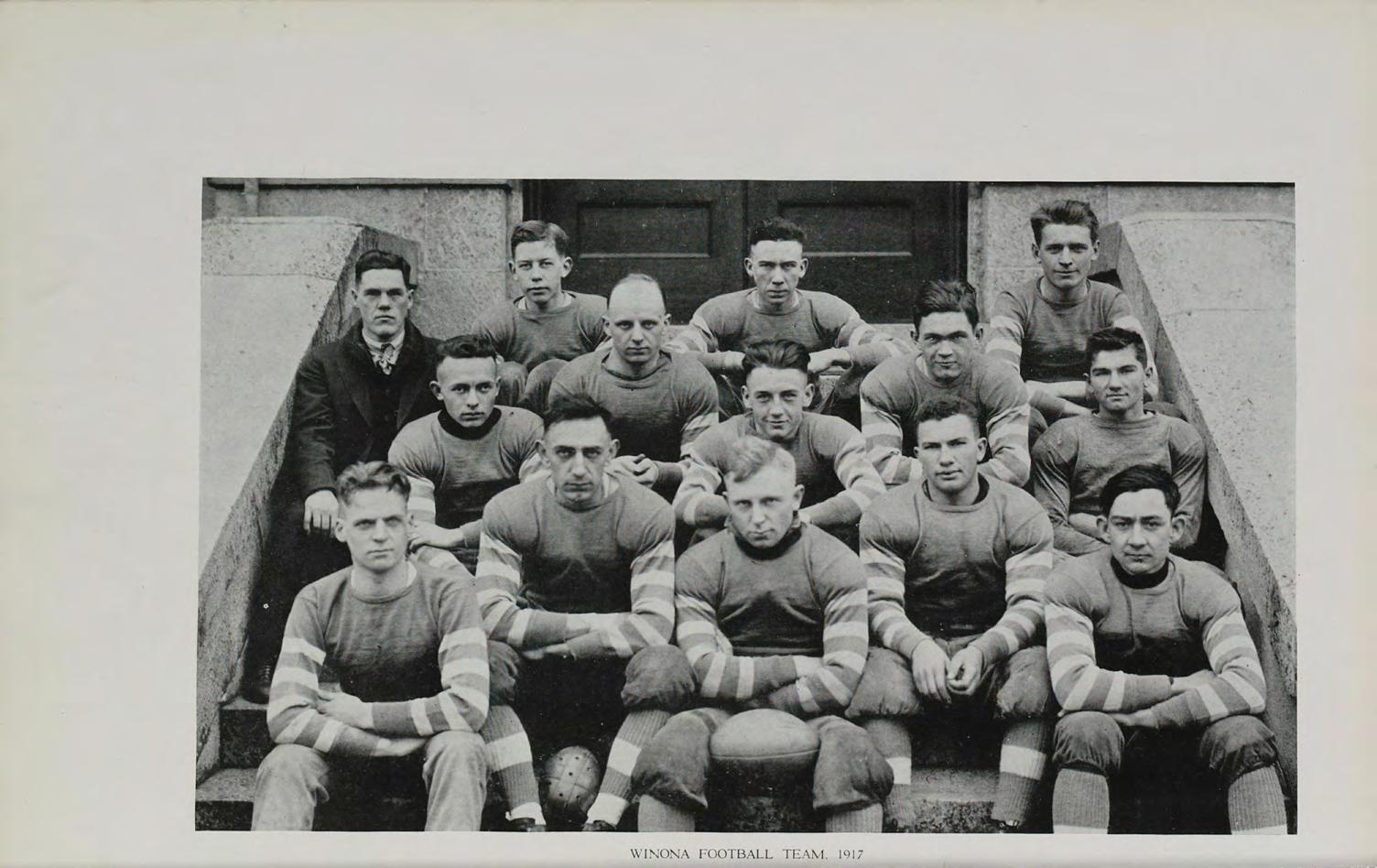
WINONA FOOTBALL
TEAM. 1917
Football in 1917
THE prospects for football during the early fall were farfrom encouraging. Many of the Normal Schools in Minnesota and adjoining states had decided to abandon the custom of putting a representative team on the field. It was only thru the persistent efforts on the part of Coach Dillon that Winona was able to produce a team. But produce a team he did,—a team of which the school and Winona is justly proud.

Five veterans were present at the beginning of the season. These were: Captain Wachholz, Lumelsky, Robb, Bourne and Katowski. Around these men Coach Dillon built his machine. The schedule for the season was:
Oct 6—Rochester at Rochester.
Oct. 13—La Crosse Normal at La Crosse.
Oct. 20—La Crosse Normal (seconds) at Winona.
Oct. 27—Red Wing High at Winona.
Nov. 3—Cotter High at Winona.
Nov. 10—La Crosse High at La Crosse.
Nov. 17—Winona High at Winona.
Nov. 24—St. Mary’s at Winona.
Our opening game was at Rochester and we lost it by a 6 to 0 count. In the last quarter a blocked punt gave Rochester her only opportunity to score. On Oct. 13th, we were defeated decisively by the powerful La Crosse Normal Eleven. The score of this game was 101 to 0 and was only surpassed by the drubbing we received at the hands of the La Crosse High School, later on in the season. On October 20th we won from the La Crosse Normal Seconds, 18 to 0. Our next game we played with Red Wing at Winona. We ran up 74 points to their nothing. The Purple and White team fob low'ed up this victory by defeating the local Cotter High School, 9 to 0. Our games with the other local teams w'ere both tie games. W’e entered the High School game over confident, and it was only thru the sensational run of Quarterback Stevens that saved us from defeat. We played a 0 to 0 game with St. Mary’s, and battled them allthe way. Thus ended our 1917 football season; three defeats, three victories, and tw'o tied games. Next year, all but threeof this season’s players will be back again. Then w'atch the Purple and W’hite "pile up the score."
Football “N” Men, 1917
OLE" OLSON, making his first stab at collegiate football, proved himself to be an excellent football player. At end, he never failed to break up the opponent’s plays as they were sent against him. He w'as also a sure tackier, and next year we expect to see him on the Carleton eleven.
Art Wachholz, captain, played his old position at tackle, with even better formthan he did last year. He was one of our best defensive men and never failed to smash up the opponent’s plays. He always put new'
life into the boys when darkening shadows overhung the gridiron. “Wach” was chosen a memberof the all-city team.
Lumelsky entered football this year, at center, with added weight and four years of experience tied to his name. ‘"V idd easily outplayed his opponent in every game, except the High School game. He was a good defensive man and a steady defensive player. “Yidd” made the all-city center position.
Ralph Calkins was one of the first men out for football this year. In playing left guard, he always was a dangerous man on the defense, causing considerable worry to the opposing team, because of his ability to get into each play.

Robert Stevens is to be commended for the manner in which he handled the team. He stepped into the quarterback position without any experience and displayed the judgment of a veteran. He was without doubt the most consistent ground gainer on the team. He was chosen on the all-city team.
‘‘Benny' Morgan played right guard in excellent form. His indomitable fighting spirit overcame his light weight handicap. His power in the line was always felt. He always displayed the same enthusiasm on the football field as he does in his capacity as a student.
Captain-elect Flannery was one of the most sensational of the players, during the last season. His speed enabled him again and again to tear loose for long open field runs. Flannery should even be in betterform next year when he will pilot the team.
Herbert Baab, who played half back, was a big factor in the Normal team. His ability to punt was demonstrated on all occasions. Not only could he punt, but he also could advance the ball. He was chosen a member of the all-city team.
"Art” Sebo, guard, was a good man in the line, and a fine sportsman. Altho he had no previous experience, he showed excellent football qualities.
"Phil” Bourne, right halfback, with his consistent playing both on the defense and offense, was a big factor behind the line. He also handled forward passes to perfection.
"Doc” Edd, left guard, played well altho hampered by injuries. He was always on the job and was a reliable man at his position.
John Katowski, our plunging and pugnacious fullback, time and again smashed thru our opponent’s line for long gains. He was slightly rough, we admit, but he certainly can play football.
“Hucks” Werner, tackle, was a very reliable line man, in that he was able to open up wide gaps when our backfield needed them. He was also good on the defensive.
Athletic Pilots 1917-18
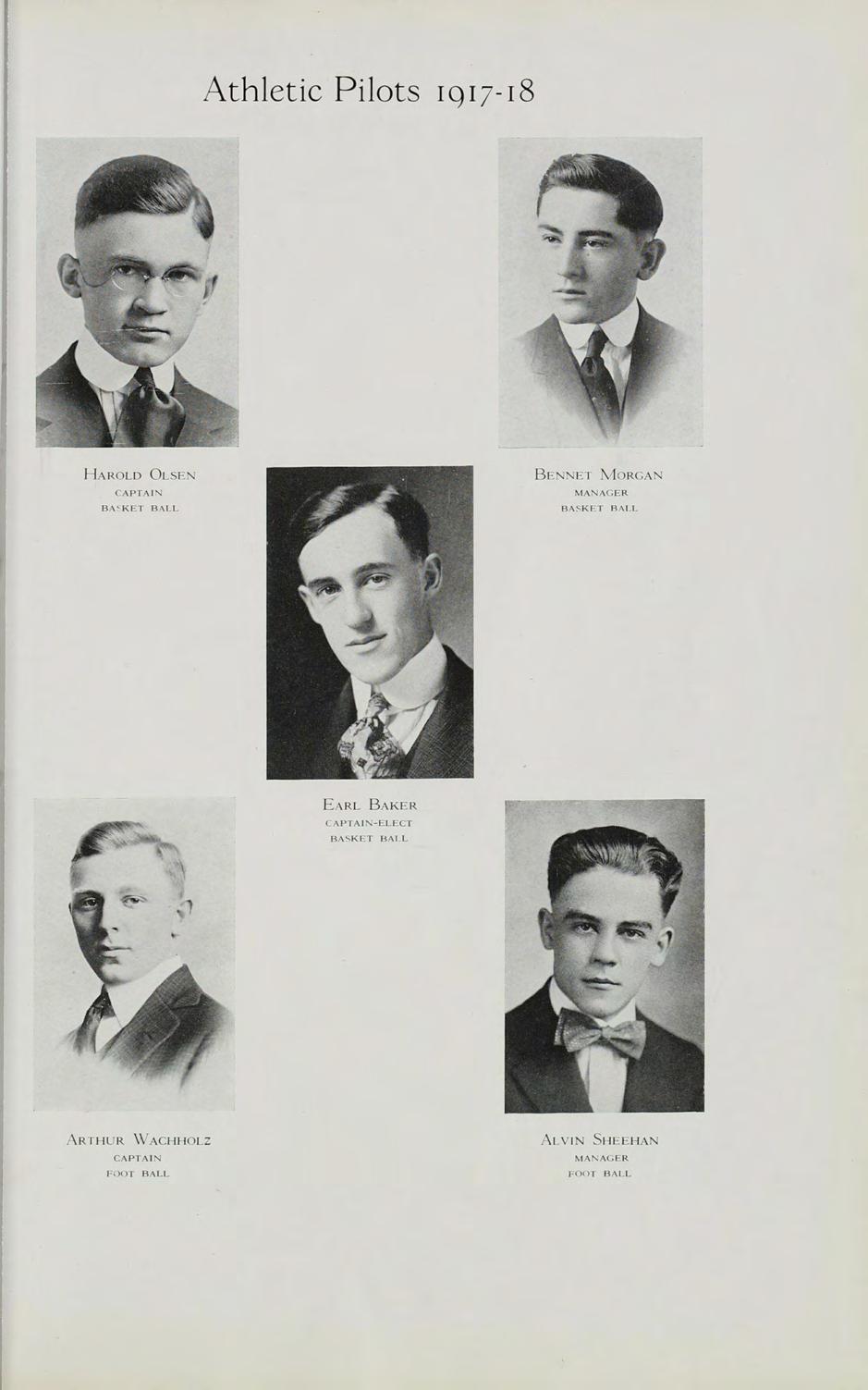 Bennet Morgan MANAGER BASKET BALL
Arthur Wachholz
Alvin Sheehan CAPTAIN FOOT BALL
MANAGER FOOT BALL
Bennet Morgan MANAGER BASKET BALL
Arthur Wachholz
Alvin Sheehan CAPTAIN FOOT BALL
MANAGER FOOT BALL
Basketball, iq17-1q18
WHEN the first sign of basketball became visible, it looked very gloomy to Coach Dillon, for there was not a veteran out for the squad. But determined to excel the team the Normal had the year before, our boys got down to work and whipped themselves into fine shape.

Manager Morgan made out a schedule and it is said it was the best the Wir.ona Normal ever had.
The first game was played against the Ascensions December 14th, and altho we were beaten 25 to 16, we learned a bit about basketball.
The next week we traveled to Red Wing and encountered the fast Central High Team of that city. Baab, our lanky center, was the main attraction of the game. The score stands 39-9 in Red Wing's favor.
After several days of rest the Purple and White squad met and defeated the local Cotter High team 44-10. This game was merely a practice game, which kept the boys in good condition during the holidays.
On January 4th we traveled to Kellogg, and played the Kellogg Independents. The game was played in an old Opera House. Poor lighting and a low ceiling featured the contest. The final score Kellogg 29, Winona 19.
The next Friday, January 11th, started our winning streak. Kellogg was taken into camp as the score 31 to 15 indicates. This game was played at Winona.
Coach Loop of Eau Claire (Wis.) Normal, then brought his warriors to Winona. They came in on the noon train Friday, January 18th and went home the next clay sadly defeated 25 to 16. The blocking of passes by Lumelsky, featured the game.

The surprise ofthe year came on next Friday. “Tibby" of La Crosse Normal brought his second team up here. The Winona boys defeated them 31 to 29, in a game, see-sawing from start to finish.
The winning spurt continued on next Friday, February 1st at Eau Claire. The Normal team of Eau Claire went down to defeat on their own floor, by the score 39 to 22. Stevens’s work at guard and Baker's work at forward, were the bright lights of the game.
The team then started on the biggest trip of the season. The team, accompanied by Coach Dillon and Manager Morgan, went to Mankato on February 8th to play the fast Commercial College of that city. Our boys were so completely outclassed that a large score 57 to 16 resulted. The next day the squad traveled to St. Cloud and defeated the St. Cloud Normal 19 to 17. Captain Olson was the star of the game.
On February 15th Red Wing came to Winona and gave us another drubbing 32 to 17. The excellent teamwork of Thompson for the visitors, featured the contest.
Our next opponent was the Mankato Commercial College, on February 22nd at Winona. Altho they defeated us 30 to 26, we felt confident that we had improved a great deal during the last two weeks.
The next game March 1st, ended our season. We won the Normal School State Championship by defeating St. Cloud Normal 28 to 13.
Basketball
Captain Olsen
The leadership of Captain Olsen, and his ability as a player was demonstrated at all times. He was fast and he showed his ability to shoot baskets by dropping in a goodly number of "ringers’’ each game. Another feature of his work was the teamwork he developed.
Captain Elect Earl Baker
This was "Bake’s” first shot at basketball, and he surely did make good. Without a doubt. Baker developed, as a forward, to be the best player on the squad. Histeamwork featured each game. He was also a chummy fellow on the trips, always helping to make everything go thru. We, the Winona Normal, wish him and his team lots of luck next year.
Max Lumelsky
"Yidd" played guard, and was the big find of the season. Altho he was shortwinded he trained to be a very versatile player. The breaking up of passes was his main asset.
Robert Stevens
Playing the position of standing guard, "Bob” was a good defensive player. His fast floor work, also his ability to pass the ball well, won him much merit. Stevens is to be with us next year and we will expect another good season from him.
Herbert Baab
Baab was another beginner of basketball. But he developed to be the mainstay of the “Purple and White” lineup. I he team was built around this tall, lanky center. Many of the scores made were the result of his long one-handed shots.- He has an average of six baskets or twelve points a game. "Herb will be another member to come back next year, and we hope he can duplicate his excellent record of this year.
Arthur Wachholz
Tho not playing in allthe games, "Carp” won great-praise for his excellent defensive work. Altho we will lose “Wach's” services next year, we hope he will have a team of his own, in some little berg, somewhere in the state.
Cecil
Baldwin
Because of illness "Cec” did not play with the team in the early part of the season. But, when he got back he set things on fire with his excellent shooting ability and fast floor work.
Calkins, Sebo, Edd, Galvin, and Rogalla were the subs for the season. They “scrubbed” hard all season. We look to them next year for good material for the first team.
Athletic Pow-wows

AGREAT deal of praise is due Mr. Maxwell and Mr. Moore for helping the boys in making athletics a big success, this year.
Mr. Alvin Sheehan, manager of football, also is to be complimented on his ever willing efforts in helping athletics this year.
Wanted to know—
Who ate the seventy cent breakfast at Mankato?
Who Morgan "fell for” at Eau Claire?
From whence came the Queen of Sheba, Yidd grabbed off at Eau Claire?
What “Bake” said in his sleep at Mankato?
Who chewed the hole in Stevens's jersey?
Who can imagine—
Sheehan lining a football field.
Baab flirting with women at a basketball game. Werner in a barber shop before going to a ball game.
Sights one would enjoy seeing—
“Doc" Edd making a touchdown.
Schrader in a basketball suit.
Stevens in bachelor apartments.
Baab, the night before the game, attending “The Sirens of the Sea."
Mr. Maxwell and Mr. Lowry scrapping over a volley ball game.
Things that never happen—
Zepp in amongst the fellows.
Sebo at a basketball game without a girl.
Morgan being without a job.
Stahman without a story to tell.
Baker swearing.
Wachholz criticising a referee.
VOLUNTARY BANKRUPTCY NOTICE
The Winona Normal District Court, Winona, Minnesota.
Voluntary Bankruptcy notice is hereby given, that the Winona Normal Athletic Association has applied for a discharge from all debts incurred during the past year. Creditors and parties interested are ordered to attend before this court in President Maxwell s office, at midnight of the 32d day of the 13th month in the Year of Our Lord 1999.
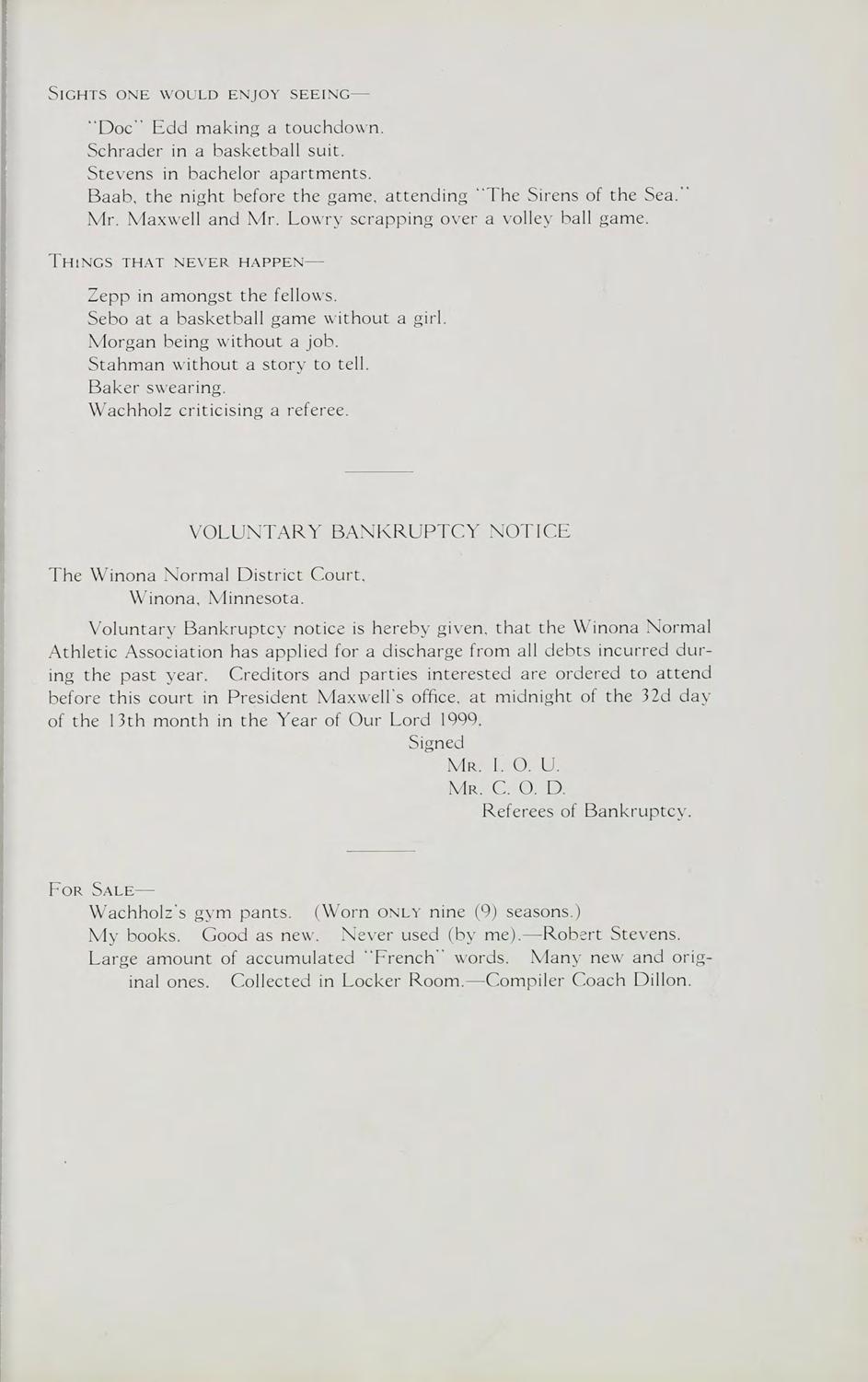
Signed
Mr. I. O. U.
Mr. C. O. D. Referees of Bankruptcy.
Lor Sale—
Wachholz’s gym pants. (Worn only nine (9) seasons.)
My books. Good as new. Never used (by me).—Robert Stevens. Large amount of accumulated “Lrench" words. Many new and original ones. Collected in Locker Room.—Compiler Coach Dillon.
Model Brassieres Dove Undermuslins

American Lady Corsets
Dependon Underwear Dependon Hosiery
Kayser Silk Underwear
Kayser Hosiery Phoenix Hosiery
Kayser Silk Gloves
Belding Silk India Umbrellas
Regina Kid Gloves
Community Silver Mallison Silks
Eaton, Crane, and Pike's Stationery
Colgate’s Toilet Goods McCall Patterns
Linweave White Goods
Red Seal Ginghams Loraine Ginghams
Farwell Romper Cloth
Sun Ray Silks Indestructible Crepe
Linweave White Goods
the Best for thePrice No Matter What the Price is
Particular Particular ‘Things J or People
Always
INTER-STATE CO.
The qualities in merchandise that are backed by an absolute guarantee for service
NORMAL SCHOOL LESSON
There little Junior, don't cry!
They’ve sent you to Normal, 1 know,; You've got English, Music, and Geography Besides to study your Psychology—
But studies and lessons will soon pass by.
There little Junior, don’t cry!
There little Junior! don't cry!
You've flunked in a test now, I know.
You stood up in reading and shook like a leaf, In rithmetic fright made you chatter your teeth.

Others have done it, so you need not sigh.
There little Junior, don’t cry!
There little Junior, don't cry!
You do not like Normal, 1 know.
But then you'll be a wise Senior some day.
When with dignified glances you'll probably say, “Another study and I'll surely die!
There little Junior, don't cry!
KNIT!
When Jane to Normal went her way
She thought she'd ought to learn to knit, So quite unfailingly each day
She sat and knit, and knit, and knit!
To Krat? for bitter sweet one day
She went; while they were getting it To while the weary hours away
She sat and knit, and knit, and knit!
On Sunday she'd to church repair, And could not bear to idle sit. So during sermon, song and prayer
She sat and knit, and knit, and knit!
At home, at school, asleep, awake
The sweater neath her hand did grow. For all the time she thought of it, and every single place she’d go She sat and knit, and knit, and knit!
5oUe
department

FOUNC WINONA MINNESOTA
Allyn S.Morgan Jeweler
But one sad day she dropt a stitch. She flung her knitting in the ditch. She tore her hair and threw a fit
And nevermore did knit and knit.
L. M. D.
“AIN’T IT A GRAND AND GLORIOUS FEELING" (With apologies to Briggs.)
To have chapel excused early.
To have Mr. Maxwell announce that “School Management Class will meet this P. M.“
To have Miss Grant—“Would like to see.”
To have an invitation to the faculty reception extended to all.
To speak to one of the faculty and be ignored.
To plan to go somewhere only to find out that it has never been the custom here in Winona.
To walk down to the Post Office on a study night and meet Mr. Maxwell on the Post Office steps.
To fully plan on getting a “B“ and then find on your pink slip an “E.“
To come home from school hungry and find hash will be served.
THINGS THAT NEVER HAPPEN.
Marion Laidlaw without the world's burdens on her shoulders
Nann Ashcroft getting fussed.
Dorothy Sherwood in perfect harmony.
Phil Nyquist losing sight of Thelma Curran.
Margaret George without a job.
L. M. Davidson not getting the point.
Winifred Bausman not dead tired.
Helen Rogers not “helping out."
Frances Manchester not having troubles of her own.
Calkins not “feeling happy.’
Cora B. Peterson refusing to play the piano.
Muriel Davnie getting enough to eat.
IF SOME OF OUR EXPRESSIONS WERE TAKEN LITERALLY, WOULD
Muriel Davnie “simply die”?
The girls call the boys “tight wads"?
Mildred Mannerud have a “fat chance ”?
Margaret George shed “crocodile tears' ?

Nann “fly up the flue”?
Marion's friends be “burned up”?
Jean Brotherton be “moldy”?
We “shoot the faculty’s feet off’’?
Iva “kid the gold-fish 1
Most all of us be “petrified"?

Cornelia Fish "chum it up to the supe"?
Winifred Bausman "pass away"?
Would Margaret Robb or Agnes Steele?
If Grace Ronnigen would Gertrude Trippe?
If Marion were Laid-low would Miss Burkholder and Marion Wheeler?
If Anna Bloom(ed) Clara Otto.
Mary Y.: "Oh girls, when I was down town today I saw a monkey grinder."
TALE OF A STUDENT. Cram Exam Flunk Trunk (Ex.)

"My father is a veteran and has a hickory leg."
"That’s nothing; my sister has a cedar chest.—Ex.
Some Tommies in a restaurant at Salonica asked for Turkey with Greece.
"S)rry, gentlemen," was the reply, "but I can’t Servia."
"We'll see about that," called the Bosphorus.
When the manager arrived he said, "I hate to Russia, but you can't Rumania."
So the poor Tommies had to go away Hungary.
The faculty once gave a party. The invites they sent were most hearty. They all wore their best, Had eats and the rest, But nobody came to their party.
Mr. Munson (in Chemistry): "We will now have the next experiment.’ Pupil: "The object of this is to dye."
Thelma: "What does anaesthetic mean 1
Phyllis: "Oh, that’s the name of that fancy dance we’re learning in gymnasium."
"1 don’t thinkMr. Moore knows anything about Civics, do you 1
"Why 1
"Because he asks so many questions about it."
Miss B. in gymnasium: "Miss Fish, do you swim?"
Marion L. (fainting away in Dr. M.’s arms while being vaccinated): "This is nothing unusual for me."
"Oh don't worry, it isn't for me either."
Art W.—Who is Nancy?
Student: "Don’t you get sleepy in class?"
Student: "No!"
Student: "Well, I suppose not, as only the brain sleeps."
You’ll Get It Good And You'll Get It Quick -
Turn that engraving work over to the Buckbee-Mears Company. They’ll handle it in an intelligent and pleasing manner. They treat every order as if their business success depended on that job alone, and they mix brains with the zinc and copper of their p 1 tes. There’s a personal touch about the way they do things for you. You'll find them mighty nice folks to do business with.

Buckbee Mears Company
Designers and Engravers NEWTON BUILDING ST. PAUL, MINN.
Martha H.: “I’ve had small pox so I don't see why 1 should have to be vaccinated; besides, I've been vaccinated before.
Doctor: “How long ago were you vaccinated 1
M. H.: "It was the year my uncle was married."
Fran: “I went behind the door to get the salad, but I came out blushing because it was dressing."
M. Wiik: “We went by the cornfield and our voices hot gusky."
At a party—Bennett: “Oh, I'll sing for you. Won’t that be fine?"
Bystander: "I think it ought to be fine and imprisonment both."
Mugs: “Hello, Old Scout, how do you feel? I just ate some oxtail soup and I feel bully."
Dav: "I just ate some hash and I feel like everything."
Blanche Metcalf: “I’m glad we aren't going out into the country to-day. It's so cold."
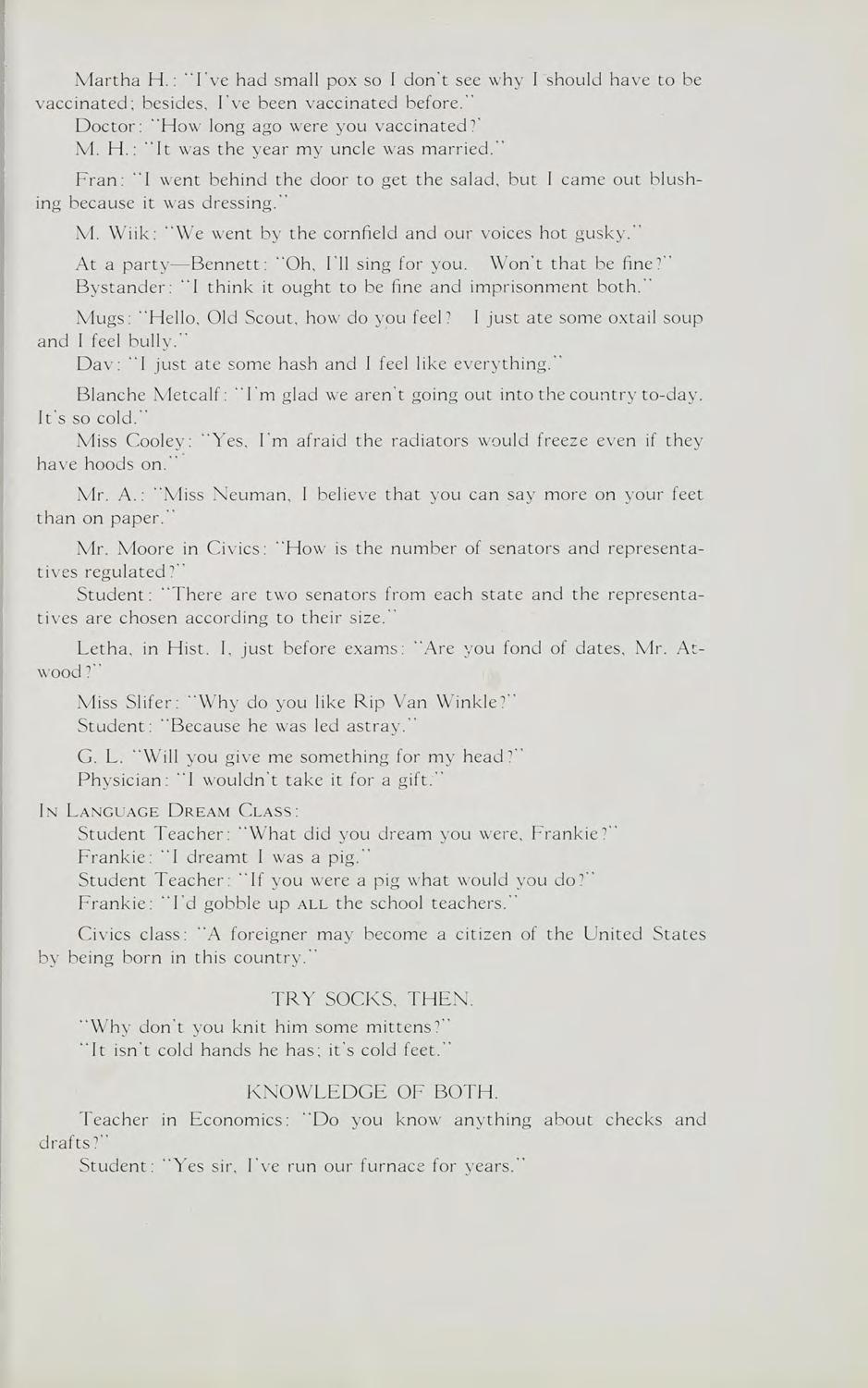
Miss Cooley: “Yes, I'm afraid the radiators would freeze even if they have hoods on."
Mr. A.: "Miss Neuman, 1 believe that you can say more on your feet than on paper.
Mr. Moore in Civics: “How is the number of senators and representatives regulated?"
Student: “There are two senators from each state and the representatives are chosen according to their size.
Letha, in Hist. I, just before exams: “Are you fond of dates, Mr. Atwood ?”
Miss Slifer: “Why do you like Rip Van Winkle?"
Student: “Because he was led astray."
G. L. “Will you give me something for my head 1 Physician: “I wouldn't take it for a gift."
In Language Dream Class:
Student Teacher: “What did you dream you were, Frankie?"
Frankie: "I dreamt 1 was a pig."
Student Teacher: “If you were a pig what would you do?"
Frankie: “I'd gobble up all the school teachers."
Civics class: “A foreigner may become a citizen of the United States by being born in this country."
TRY SOCKS, THEN.
“Why don't you knit him some mittens?"
“It isn't cold hands he has; it’s cold feet."
KNOWLEDGE OF BOTH.
Teacher in Economics: “Do you know anything about checks and drafts 1
Student: “Yes sir, I’ve run our furnace for years."
H. CHOATE & CO.
Featuring and Specializing High Grade Merchandise
"All that's new''
"Always here first’ At very moderate prices
Dress Goods
Silks
Trimmings
Wash Goods
White Goods
Linens
Gloves
Neckwear
Hosiery
Corsets
Toilet Goods
Art Goods
Lingerie and Underwear
SCHULER'S BAKERY
'You can always do better at Choates'
Women's Suits and Coats
Dress Skirts
Waists
Millinery
Rugs
Draperies
Wall Paper
Wind. Shades
Trunks
Traveling Bags and Suit Cases
DR. HOLDEN'S DRUG STORE

Nearest place for Students’ Supplies, Drugs and Stationery
Phone 429-J
523 Huff Street
SOFT DRINKS ICE CREAM
Junior—"Where do you get your rolls and cakes for the spreads or lunches?"
Senior—"Oh, at Schuler's, of course! All of their bread and confections are delicious.
Shoe Repair Shop
Bring us your shoes. We mend them quickly and well.
A. M. BARD
Next to Holden's Drug Store
Miss Slifer: “What does it mean when a man hasn't a tuft on his chin?”
F. E.: “Oh, that means that he hasn’t a goatee."
Student: “I don't think I deserved an “F“ on that paper."
Teacher: “No, I didn't either; but that was the lowest mark I could give you.”
POPULAR SONG HITS.
“The Little Old Ford Just Rambled Right Along"—Country LifeClub
“I'm the Guy’’—Lovering Flannery
“The Hours I Spent With Thee Dear Heart —Gladys Bender
“1 Wish 1 Had a Girl —Ralph Calkins
“There’s a Little Bit of Bad in Every Good Little Girl'—Muriel Davnie
“Yaka Hula Hickey Dula”—Mildred Chase
“Pack up Your Troubles in Your Old Kit Bag and Smile, Smile, Smile’’Helen Hermann
“Where Do We Go From Here”—The Seniors
“Goodbye Broadway, Hello France”—Our Boys in Khaki
“Homeward Bound”—June 8, The whole bunch with their sheepskins
“Each Stitch is a Thought of You Dear”—Miss Cooley
“Good Morning Mr. Zip,Zip, Zip”—Albert Zepp
“Mary’s a Grand Old Name”—Miss Slifer
“In the Land of Wedding Bells’—Florence Campbell, Lydia Glabe, Grace Lee, Olive Schultz, Ruth Monten, Grace Baumbach
“Peg O My Heart"—Peggy Glenn
“Don't Bite the Hand That’s Feeding You”—Morey Hall Girls
“How clean the horizon is!
“Yes, I just swept it with my glance.
Teacher: "Please repeat the word you omitted again, I didn't quite hear it.
Girl (rushing into Morey Hall): “I've lost my hearing.”
Frightened room-mate: “You have? How do you know 1
Girl: “See the man out there playing that hand organ? Well, I can’t hear a single note.”
Room-mate: “That’s a moving picture photographer at work.”
ONE FAILURE.
“Everything is striking about this building.” “Yes, everything but the clocks.”
TO WHOM IT MAY CONCERN
NATIONAL HYMN FROM CALK.
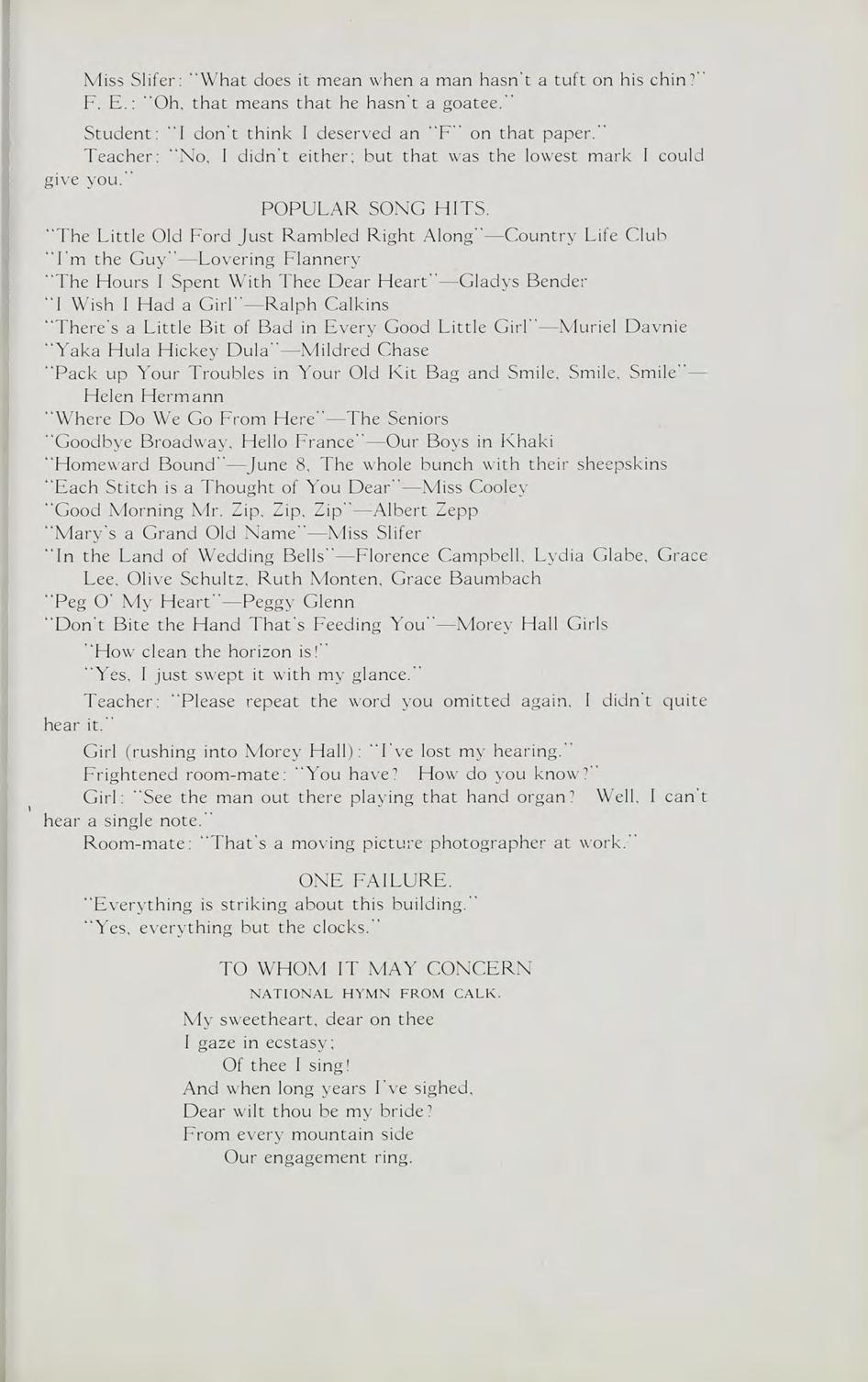
My sweetheart, dear on thee I gaze in ecstasy; Of thee I sing!
And when long years I’ve sighed. Dear wilt thou be my bride? From every mountain side Our engagement ring.
Make A Cedar Chest
Mouse Proof
Dust Proof
Moth Proof
With a carload stock of very nice Tennessee aromatic Red Cedar we can furnish your wants for chest material very promptly.
Also a large stock of quarter-sawed and plain Red and White Oak, Curly Birch, Red and plain Birch, plain and Birdseye Maple, Cypress, Mahogany, Cherry, Walnut, Sycamore, Pine, Gum and Basswood.
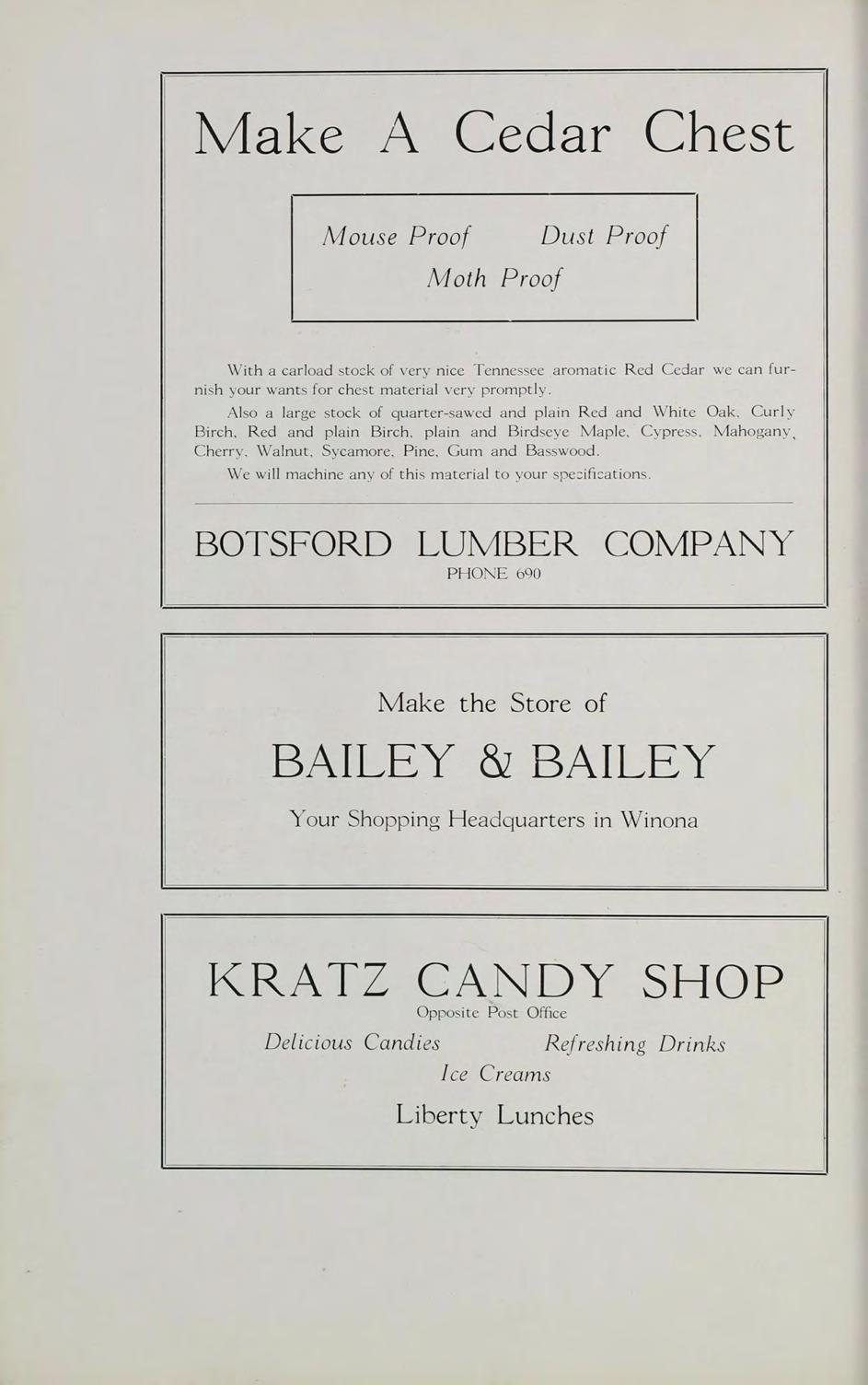
We will machine any of this material to your specifications.
Make
PHONE 690
Your Shopping Headquarters in Winona
Opposite Post Office
Delicious Candies
Refreshing Drinks
Ice Creams
Liberty Lunches
LUMBER COMPANY
BOTSFORD
the Store of BAILEY & BAILEY
CANDY
KRATZ
SHOP
But now I'm mad at you Because you are not true. For thee I wail! And when you me forsake, Another girl I’ll take; Perhaps jump in the lake! My heart’s for sale.
ADS
Ivory Soap—it floats!-—Robert Stevens.
Fairy—“Have you a little fairy in your home 1 ’’—Rae Whittom. Woodbury's—“A skin you love to touch’’—Dorothy Coe. Pears—“He won't be happy till he gets it”—A1 Sheehan.
Talc Jonteel—“Breath from a flower garden”—Beth Murphy. Resinol—“Improves and brightens”—Nellie Sprott.
CLASSIFIED ADS
Wanted—The latest invention in hair tonic—Hugo Werner.
For Sale—Our frazzled nerves—Editors.
For Sale—My vast amount of knowledge which no one appreciates—Helen Hyde.
For Sale to the highest bidder—The slams we thought of but didn't dare use.—Joke Department.
Wanted—More history from the present teacher—History IV Students.
Wanted—A date with a Prune—A Peach.
For Sale—My popularity-—H. Edd.
For Sale—The idea that we were formerly very witty can no longer be used as it has been much overworked. Might be of use to people lacking brains—Joke Editors.
Wanted—A good looking chauffeur. A-l opportunity. More a matter of the right man than the salary. Must be able to operate a Ford—Girls of Rural Department.
Lost—A prominent senior, who answers to the name of “Yid." Last seen talking to a group of girls near the bulletin board. Easily identified by his “fresh air.” Liberal reward if returned in first class condition— Senior Class.
Information Wanted—To the Faculty; When will I receive my diploma from this institution—L. Flannery.
Wanted—Critic at 4 p. m. instead of 3 p. m. Preferably none at all.—Art Wachholz.
Wanted—Some one to laugh at our jokes—Joke Department.
Notice: A new course given in Hall Fussing. Very scientifically conducted. Two hours per day. Eligibles: only those students who have flunked or want to flunk. Open to both boys and girls in equal numbers. Apply at once for admission to this class.


CAMPBELL’S CANDY SHOP That is the place where you get KEELEY’S and WEBSTER’S Chocolates, Assorted or Fudge ICE CREAM CANDIES MAGAZINES Ansco Cameras Speedex Films Kodak Finishing OLD CAMERAS AND KODAKS TAKEN IN EXCHANGE FOR NEW THE EMPORIUM The People’s Popular Store 63 West Third St. WINONA, MINN. Dry Goods Specialties and Millinery Let us demonstrate our ability to save you money Stationery Tennis Racquets Gift Books Fountain Pens Service Flags and Pins WILLIAMS BOOK STORE
THE FASHION
Winona's Only Exclusive Ladies' Ready-to-wear Store.
The newest styles and materials in Coats, Suits, Dresses and Waists can always be found here. Before buying, visit this shop, and compare our merchandise with others, for Price, Quality and Style.

SHOE
This Name and Place:-
& GATES 53 West 3rd St. “Foot-Fitters" Winona, Minn. Our" 11 /-.A Shoes for
and
RESTAURANT Daily Lunches and
Try Our Regular Meals OUR SERVICE WILL
MORRISON - MILLER Hardware Co. Headquarters for Wright & Dittson and SPAULDING'S Sporting Goods Call and see our line of Tennis Goods Phone 420 109-111 East Third Street WINONA
If You Want 100 cents worth of GOOD
VALUE FOR EVERY DOLLAR YOU INVEST, then Remember
WRUCK
Teachers
Students WE-NO-NAH
Short Orders served at all hours.
PLEASE YOU
Making You Acquainted With Good Shoes
K^OOD in every way—to look at, to give ease and for enduring wean—the JOHN KELLY shoes. No camouflage to a shoe of this name. It's just as good as it is handsome.
And we have the new styles in the most approved materials and in an extensive variety of splendid fitting lasts.
WE FEEL PARTICULARLY FORTUNATE IN BEING ABLE TO OFFER SUCH GOOD SHOES ATMODERATE PRICES OWING TO THE SCARCITY AND HIGH PRICE OF LEATHER AND ALL MATERIALS. WE CONSIDERED YOUR INTERESTS BY PLACING OURORDER EARLY LAST FALL AT FORMERPRICES.
BAKER & STEINBAUER Good Shoes
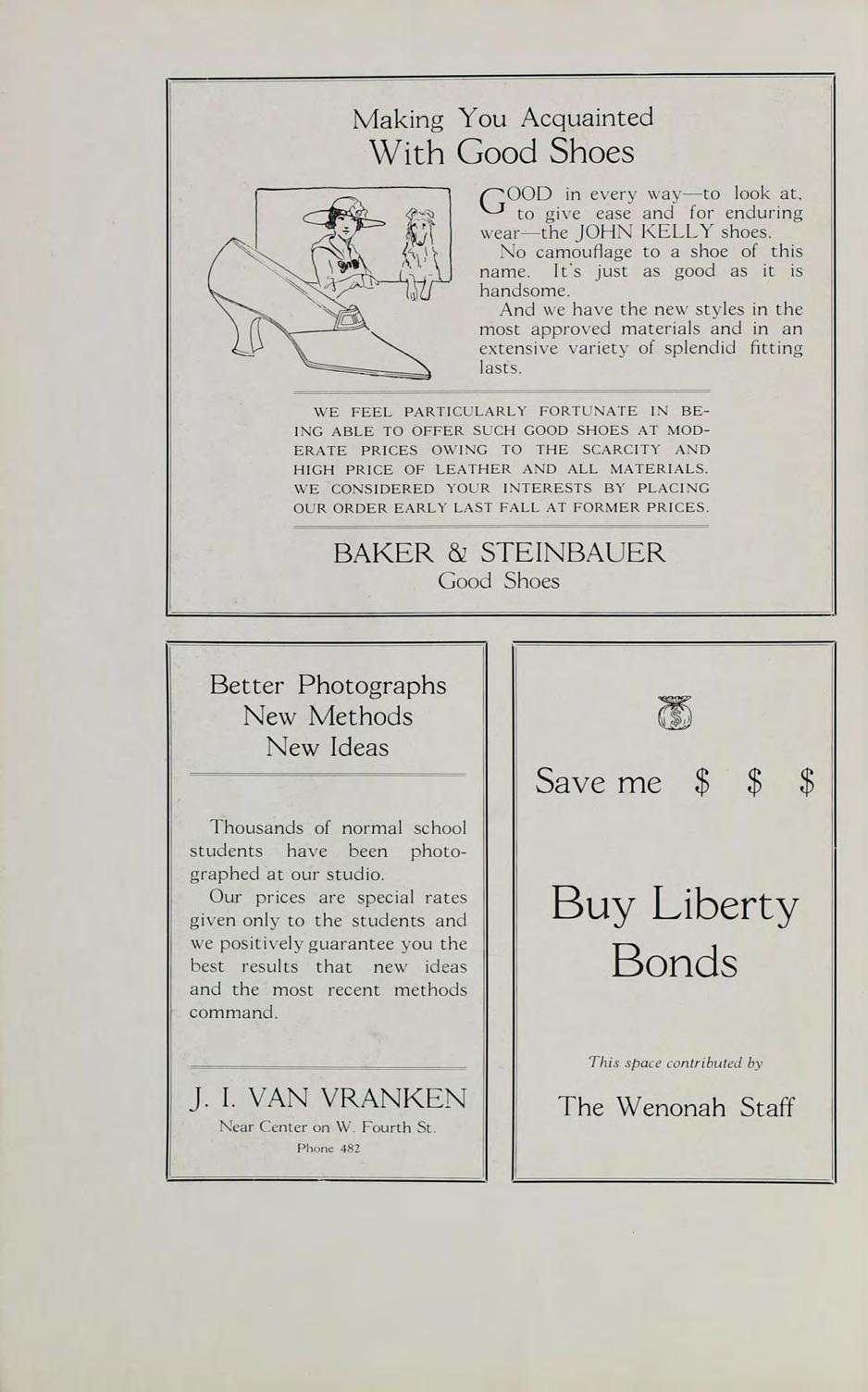
Better Photographs New Methods New Ideas
Thousands of normal school students have been photographed at our studio.
Our prices are special rates given only to the students and we positively guarantee you the best results that new ideas and the most recent methods command.
J. I. VAN VRANKEN Near Center on W. Fourth St. Phone 482 Save me $$$ Buy Liberty Bonds This space contributed by The Wenonah Staff


gutograpljs

















 Kate L. Sprague
B. Pd„ Ph. B. MATHEMATICS
Charlotte B. Chorpenning
A. B„ A. M. ENGLISH
John H. Sandt MANUAL TRAINING
Joseph H. Gaylord
A. B., A. M. PSYCHOLOGY
Kate L. Sprague
B. Pd„ Ph. B. MATHEMATICS
Charlotte B. Chorpenning
A. B„ A. M. ENGLISH
John H. Sandt MANUAL TRAINING
Joseph H. Gaylord
A. B., A. M. PSYCHOLOGY
 Thf.da Gildemeister, B. S.
E. Louise Guernsey
Thf.da Gildemeister, B. S.
E. Louise Guernsey
 Alice B. Dillon, B. S. HOME ECONOMICS
Esther B. Cooley, B. S. HOME ECONOMICS
Talmadge O. Dillon, A. B. PHYSICAL EDUCATION
Robert R. Reed, A. B., A. M. ENGLISH
Alice B. Dillon, B. S. HOME ECONOMICS
Esther B. Cooley, B. S. HOME ECONOMICS
Talmadge O. Dillon, A. B. PHYSICAL EDUCATION
Robert R. Reed, A. B., A. M. ENGLISH
 Genevieve Grover, B. S. HOME ECONOMICS
Louise C. Sutherland, B. S KINDERGARTEN EDUCATION
Ray J. Scarborough A. B., A. M. GEOGRAPHY
Blanche E. Campbell, B. S. INDUSTRIAL ART
Marie Couter SECRETARY
Alma P Proctor
Helen B. Pritchard MANAGER MOREY HALL CONSULTING NURSE TEXTBOOK LIBRARIAN
Genevieve Grover, B. S. HOME ECONOMICS
Louise C. Sutherland, B. S KINDERGARTEN EDUCATION
Ray J. Scarborough A. B., A. M. GEOGRAPHY
Blanche E. Campbell, B. S. INDUSTRIAL ART
Marie Couter SECRETARY
Alma P Proctor
Helen B. Pritchard MANAGER MOREY HALL CONSULTING NURSE TEXTBOOK LIBRARIAN
 Helen Ford Staples E. Catherine Burkholder Alvina M. Boley TRAINING, ELEMENTARY SCHOOL TRAINING, ELEMENTARY SCHOOL MUSIC, ELEMENTARY SCHOOL
Marion John Atwood. A. B., A. M. HISTORY AND SOCIOLOGY
Ethel M. Orr, B. S. TRAINING, ELEMENTARY SCHOOL
Violet M. Melander SEVENTH-NINTH GRADES ELEANOR HoHAUS ELEMENTARY SCHOOL FIRST GRADE, ELEMENTARY SCHOOL
Helen Ford Staples E. Catherine Burkholder Alvina M. Boley TRAINING, ELEMENTARY SCHOOL TRAINING, ELEMENTARY SCHOOL MUSIC, ELEMENTARY SCHOOL
Marion John Atwood. A. B., A. M. HISTORY AND SOCIOLOGY
Ethel M. Orr, B. S. TRAINING, ELEMENTARY SCHOOL
Violet M. Melander SEVENTH-NINTH GRADES ELEANOR HoHAUS ELEMENTARY SCHOOL FIRST GRADE, ELEMENTARY SCHOOL
 Marion D. Robb SEVENTH-NINTH GRADE, ELEMENTARY SCHOOL
Jocie Parks SECOND GRADE. ELEMENTARY SCHOOL
Gladys Putsch
FIFTH GRADE, ELEMENTARY SCHOOL
Julia M. Hubbard. B. Pd.. B. S. TRAINING, ELEMENTARY SCHOOL
Margaret Barlow SIXTH GRADE, ELEMENTARY SCHOOL
Marion D. Robb SEVENTH-NINTH GRADE, ELEMENTARY SCHOOL
Jocie Parks SECOND GRADE. ELEMENTARY SCHOOL
Gladys Putsch
FIFTH GRADE, ELEMENTARY SCHOOL
Julia M. Hubbard. B. Pd.. B. S. TRAINING, ELEMENTARY SCHOOL
Margaret Barlow SIXTH GRADE, ELEMENTARY SCHOOL





















 Dora Blackmore Vice-President
Letha Davidson Treasurer
Cora Palm Secretary
Dora Blackmore Vice-President
Letha Davidson Treasurer
Cora Palm Secretary


 Alvira Risser
Alvira Risser






 G. R. W.
G. R. W.








 Emma Richter Mr. Howard
Alice Clough
Leila Simon Vera Gage Christoffa Gaard Miss Trites
Maria Ingberg, Alma Bartel, Agnes Steele.' Eva Clough
Mabel Sorenson, Mary O’Rourke, Laura Bohn, Martha Seeling Bernice Smith, Alice Walterstorff, Anna Weinlich,
Emma Richter Mr. Howard
Alice Clough
Leila Simon Vera Gage Christoffa Gaard Miss Trites
Maria Ingberg, Alma Bartel, Agnes Steele.' Eva Clough
Mabel Sorenson, Mary O’Rourke, Laura Bohn, Martha Seeling Bernice Smith, Alice Walterstorff, Anna Weinlich,



 Frederick G. Bonser.
Frederick G. Bonser.


















 COACH T.
O. DILLON
COACH T.
O. DILLON




 Bennet Morgan MANAGER BASKET BALL
Arthur Wachholz
Alvin Sheehan CAPTAIN FOOT BALL
MANAGER FOOT BALL
Bennet Morgan MANAGER BASKET BALL
Arthur Wachholz
Alvin Sheehan CAPTAIN FOOT BALL
MANAGER FOOT BALL


























